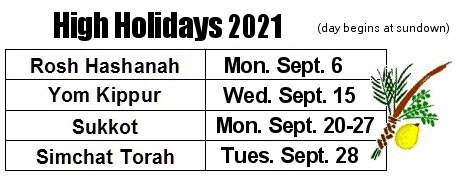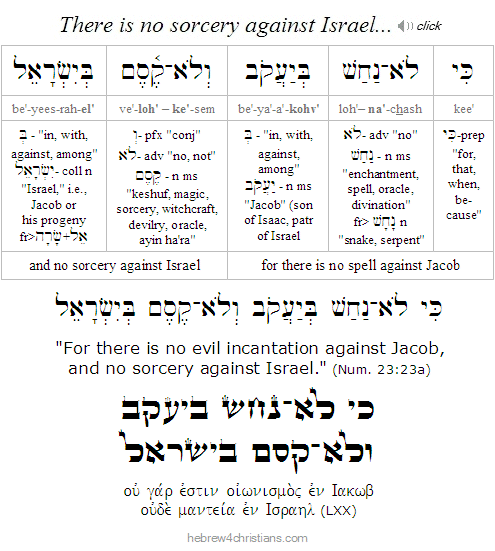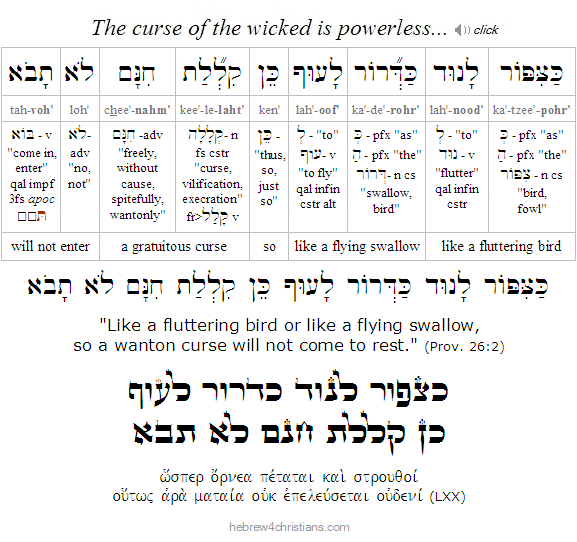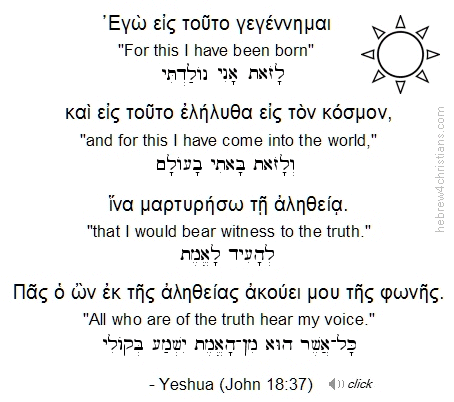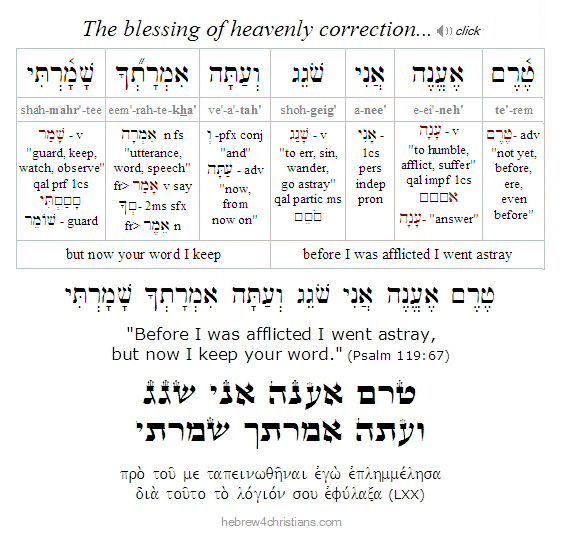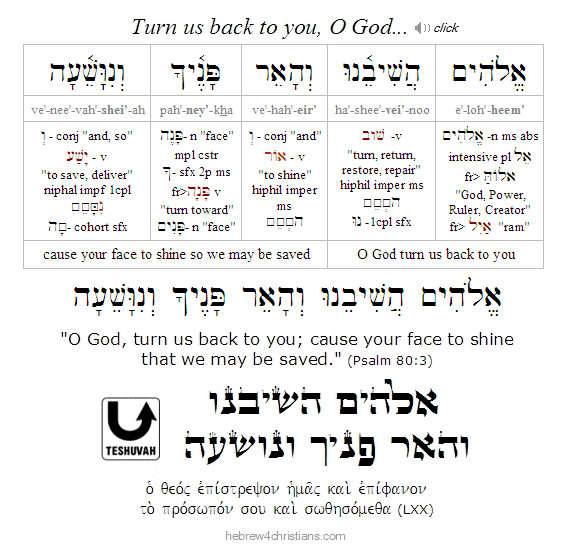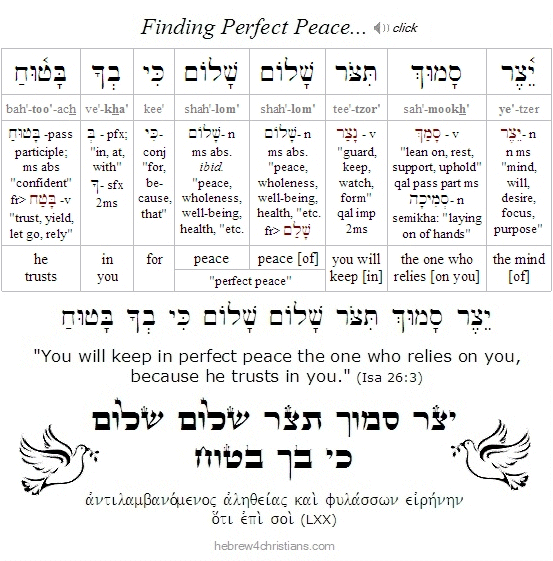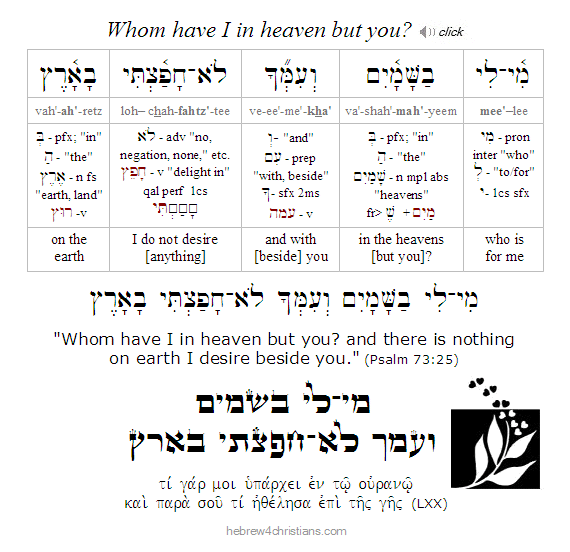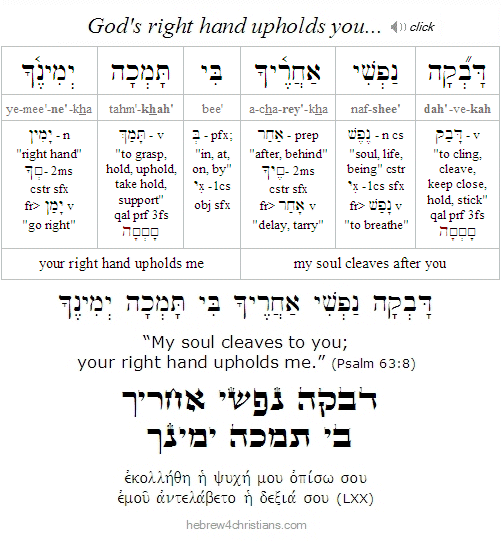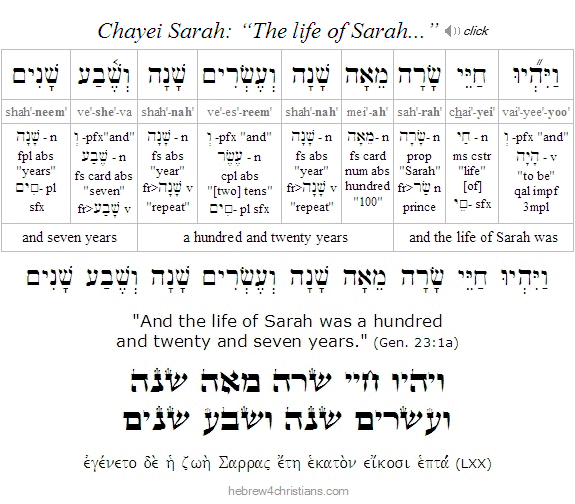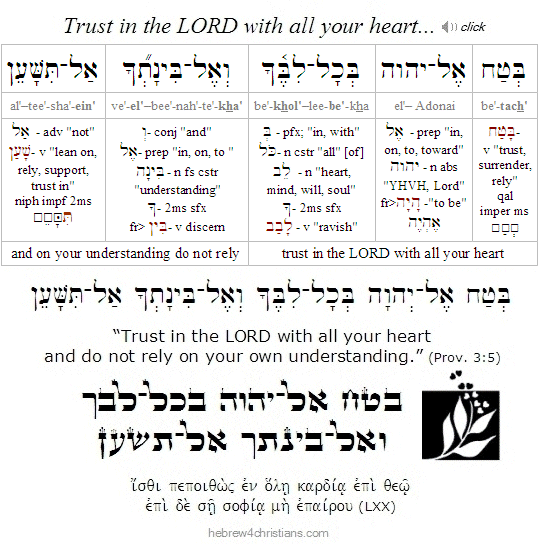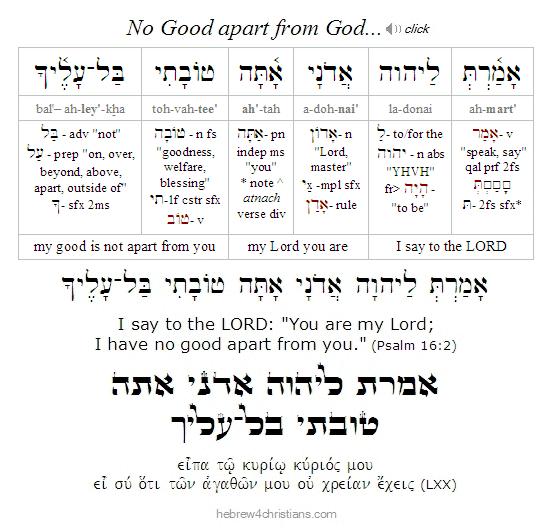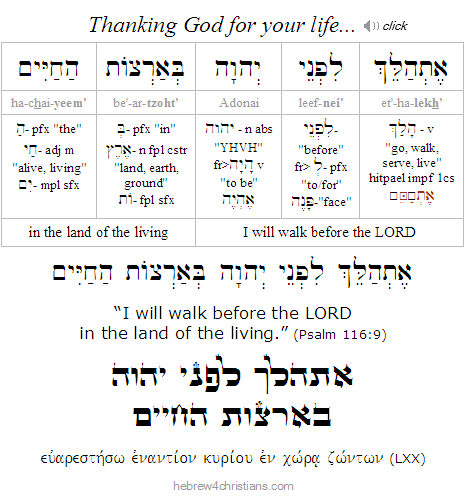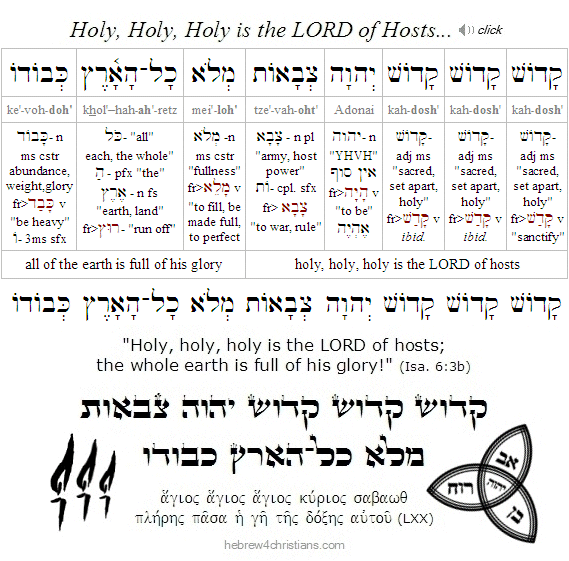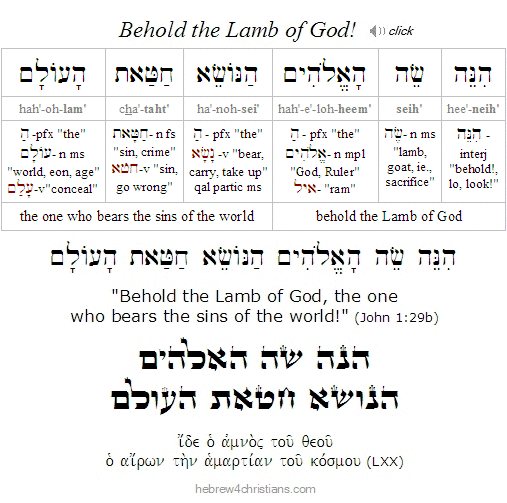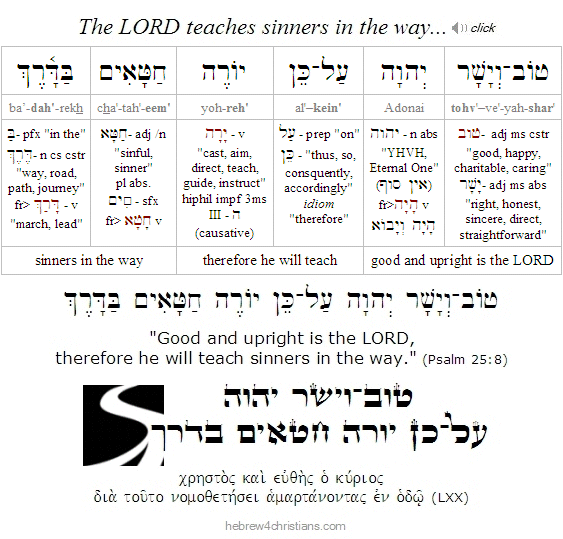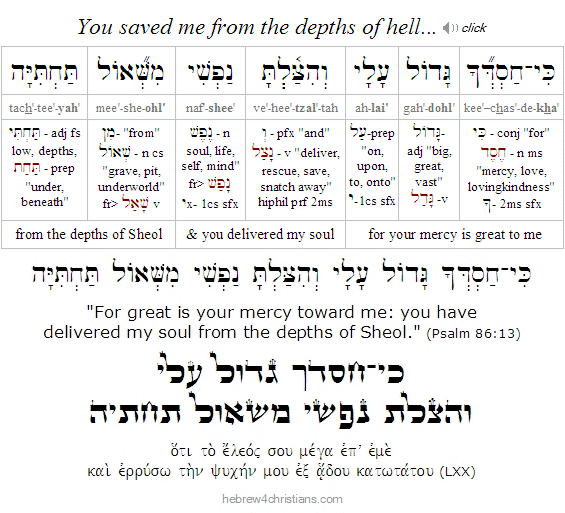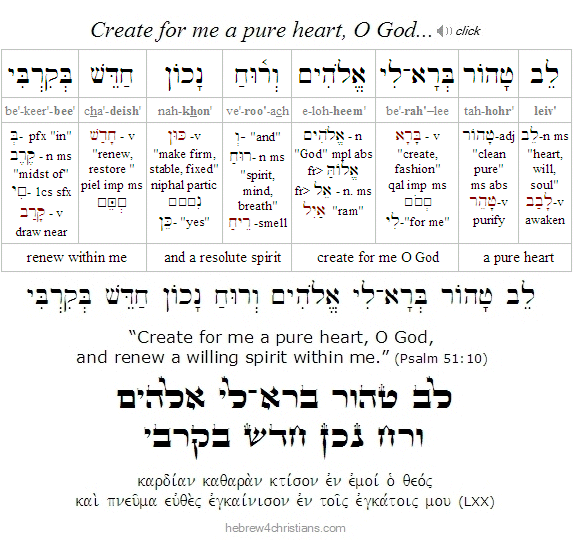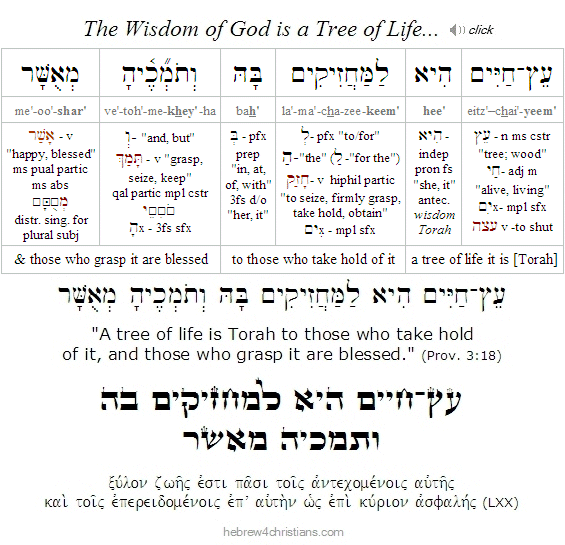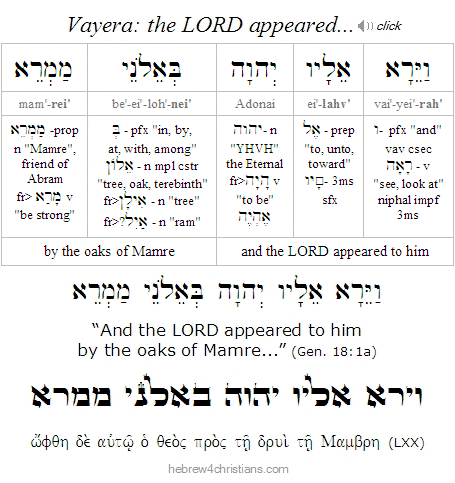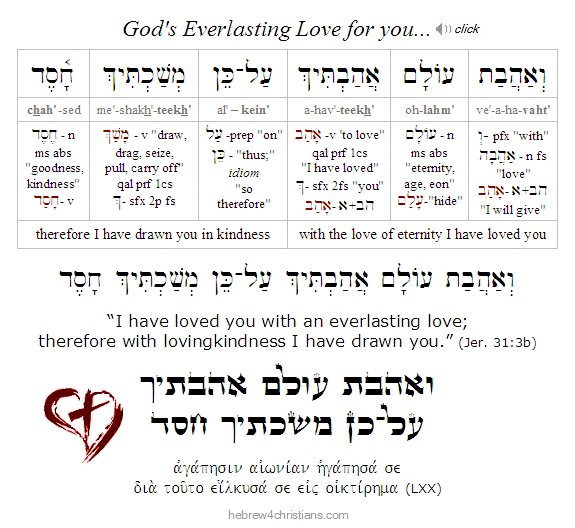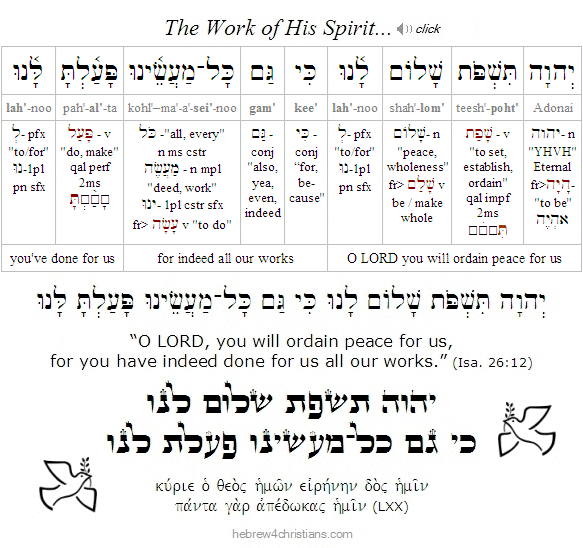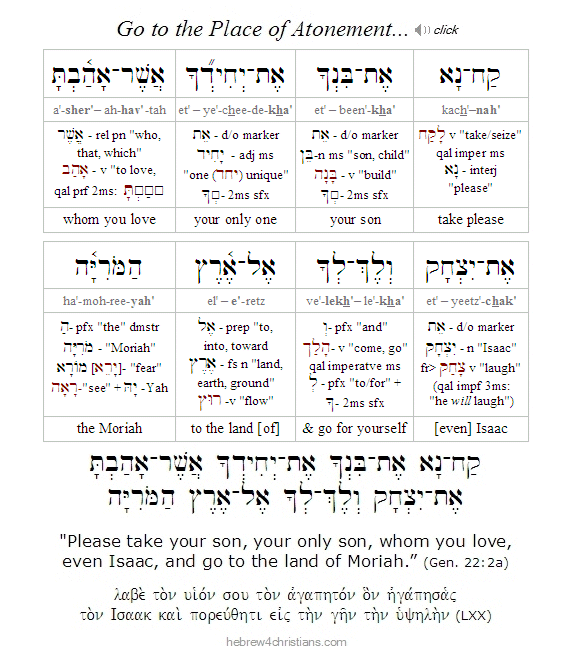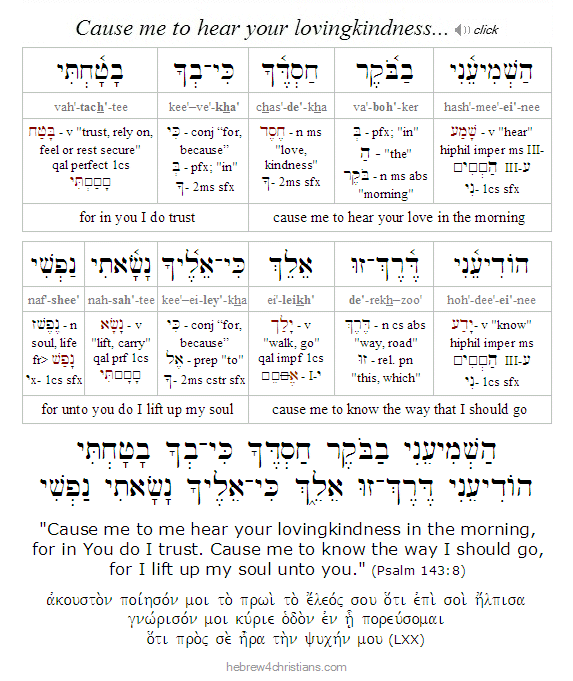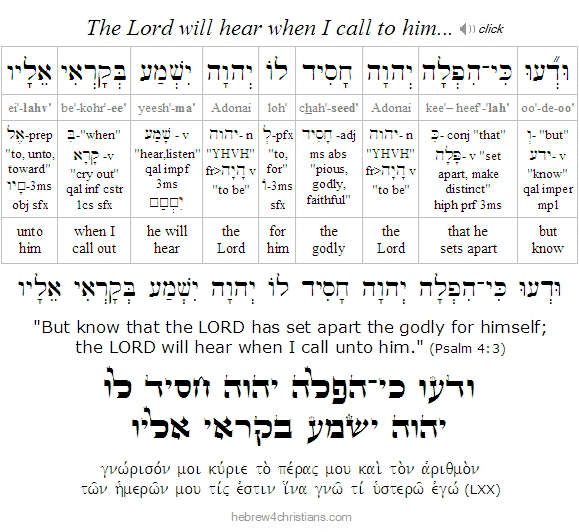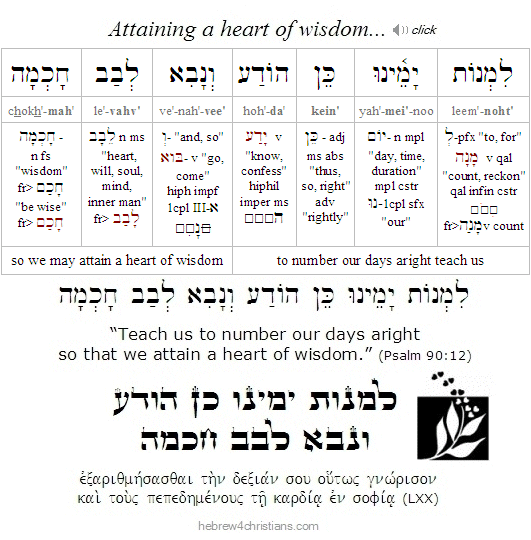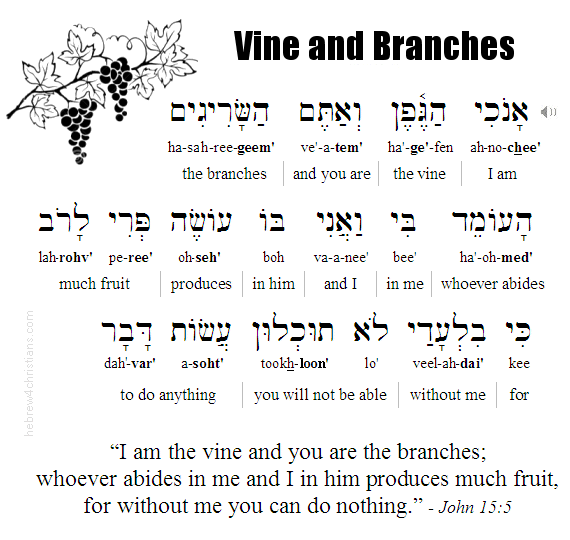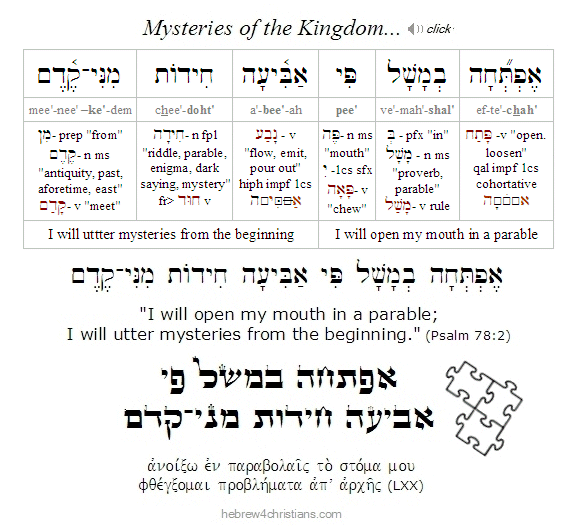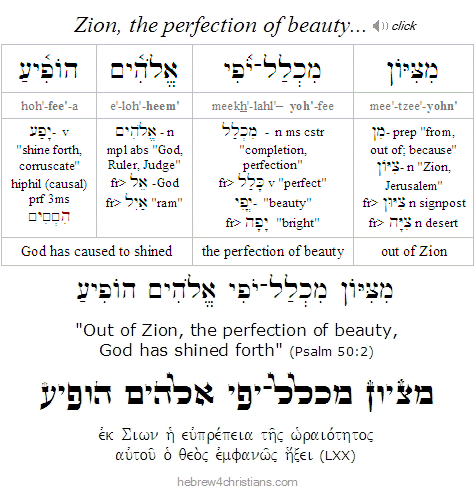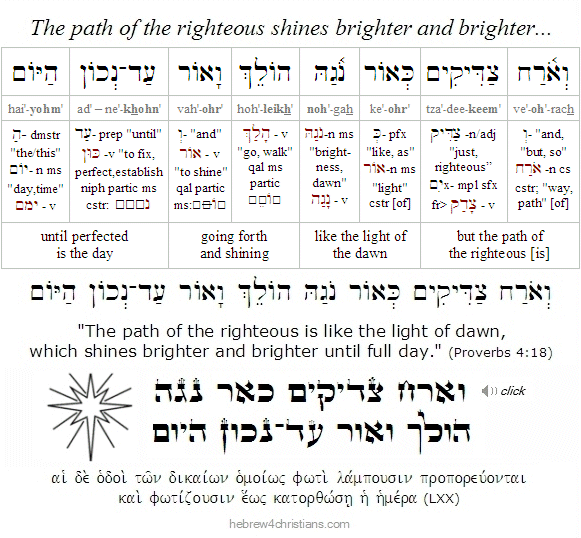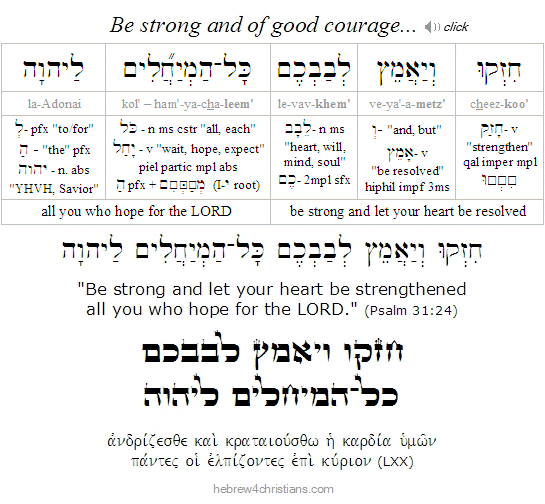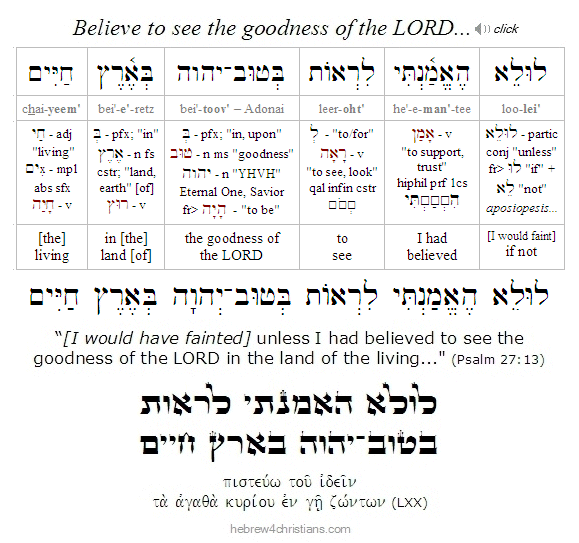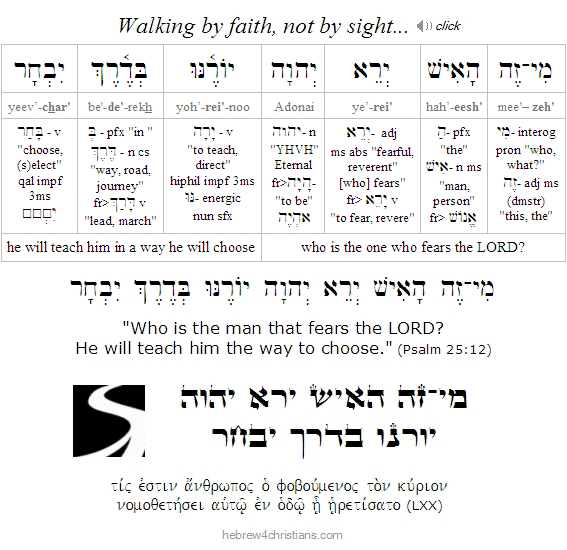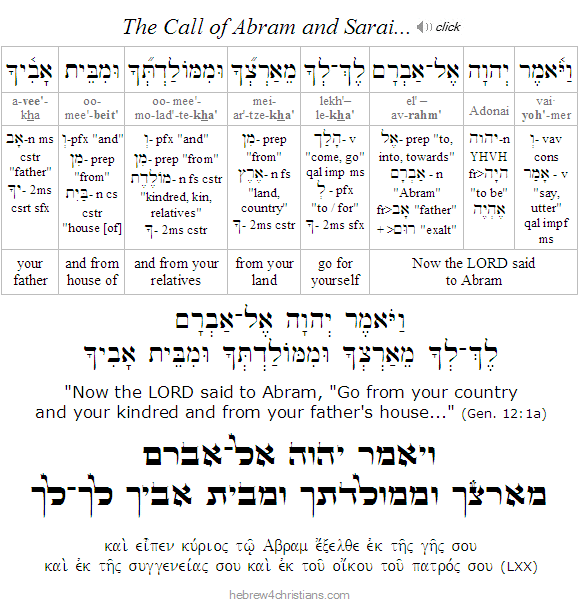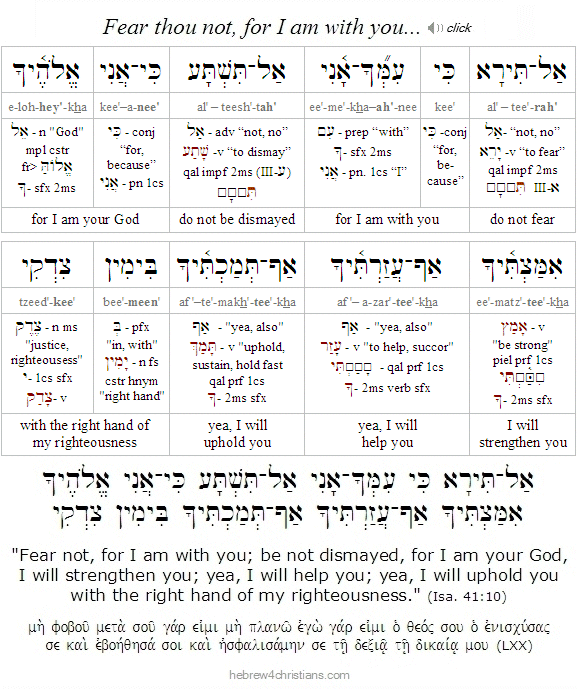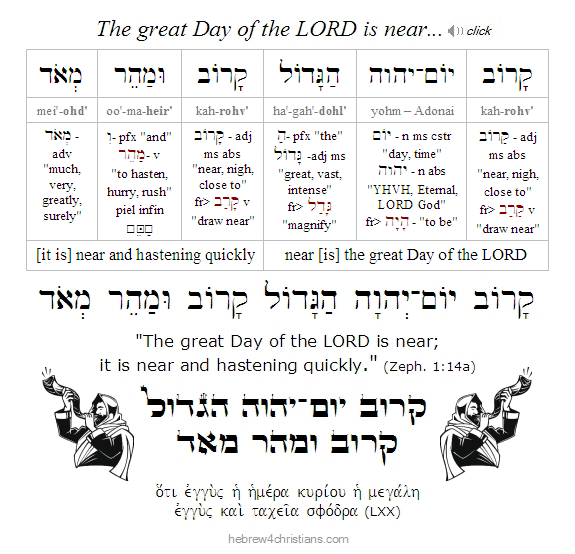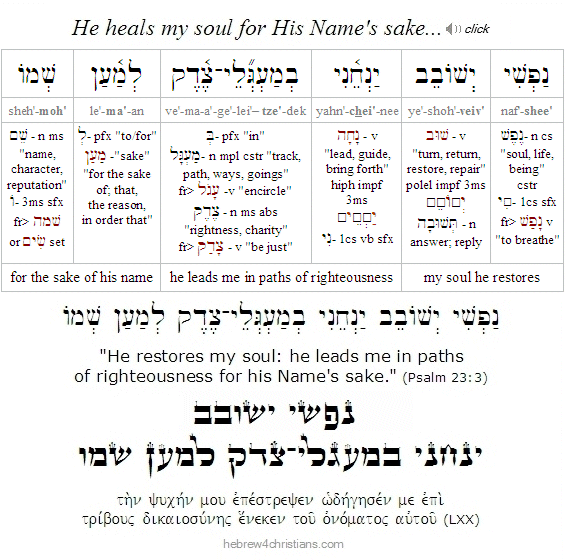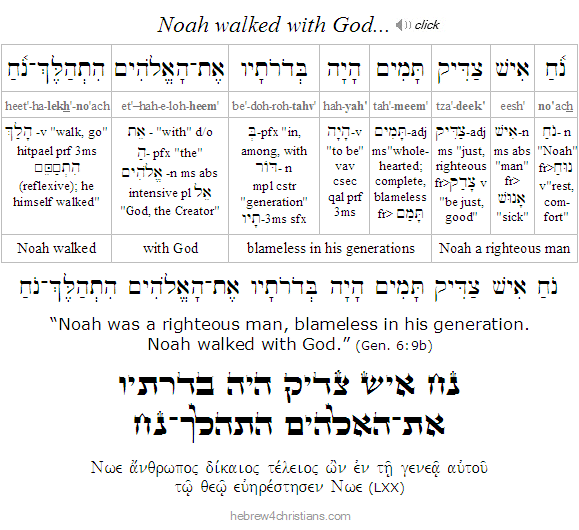|
Jewish Holiday Calendar
For October 2021 site updates, please scroll past this entry....
The Torah divides the calendar into two symmetrical halves: the Spring and the Fall, indicating the two advents of Messiah. The Biblical year officially begins during the month of the Passover from Egypt (called Rosh Chodashim, see Exod. 12:2), and the spring holidays of Passover, Unleavened Bread, and Firstfruits both recall our deliverance from Egypt and also our greater deliverance given by means of the death, burial, and resurrection of the Messiah, the great Passover Lamb of God. Yeshua was crucified on erev Pesach, buried during Unleavened Bread, and was resurrected on Yom Habikkurim (Firstfruits). The holiday of Shavuot (i.e., "Pentecost") both commemorates the revelation of the Torah at Sinai as well as the revelation of the Ruach HaKodesh (Holy Spirit) at Zion, in fulfillment of the promise given by our Lord....
The intermediate months of summer end with the advent of the sixth month of the calendar, called the month of Elul, which recalls the time Moses interceded on behalf of Israel after the sin of the Golden Calf. To commemorate this time of our history, we likewise focus on teshuvah (repentance) in anticipation of Rosh Hashanah and especially in anticipation of Yom Kippur, the great "Day of Atonement." In Jewish tradition the 30 days of Elul are combined with the first ten days of the seventh month (called the "Days of Awe") to set apart "Forty Days of Teshuvah" leading up to the Day of Forgiveness for Israel. Immediately following Yom Kippur, the mood changes as we begin preparing for a joyous week-long celebration called Sukkot (i.e., "Tabernacles") that concludes with the holiday of Simchat Torah.
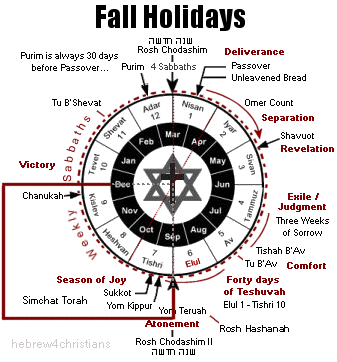 |
The Fall Holidays:

The fall festivals prophetically indicate the Day of the LORD, the second coming of Yeshua, the great national turning of the Jewish people, and the establishment of the reign of the Messiah upon the earth during the Millennial Kingdom in the world to come.
Note that in accordance with tradition, holiday dates begin at sundown. Moreover, some holidays may be postponed one day if they happen to fall on the weekly Sabbath:
1. Month of Elul (Sat. Aug. 7th [eve] - Mon. Sept. 6th [day])
2. Month of Tishri (Mon. Sept. 6th [eve] - Tues. Oct. 5th [day]) - Fall holidays here!
3. Month of Cheshvan (Tues. Oct. 5th [eve] - Thurs. Nov. 4th [day])
- Four Sabbaths: Noach, Lekh-Lekha, Vayera, Chayei Sarah
- Yom Ha'Aliyah - Honoring Israel's immigrants (Wed. Oct. 13th; Cheshvan 7)
- Sigd - 50th day after Yom Kippur; Ethiopian Jewish holiday Wed. Nov. 4th)
4. Month of Kislev (Thurs. Nov. 4th [eve] - Fri. Dec. 3rd [day])
- Four Sabbaths: Toldot, Vayetzei, Vayishlach, Vayeshev
- Chanukah: Sun. Nov. 28th - Mon. Dec. 6th
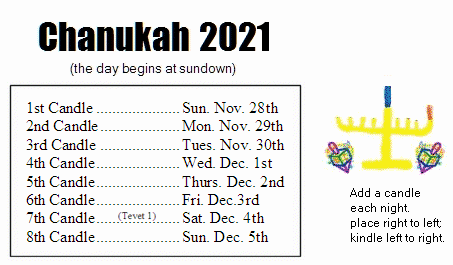
- Dates for Chanukah 2021 (5782):
- 1st Chanukah candle - Sun. Nov. 28th [i.e., Kislev 25]
- 2nd Chanukah candle - Mon. Nov. 29th [i.e., Kislev 26]
- 3rd Chanukah candle: Tues. Nov. 30th [i.e., Kislev 27]
- 4th Chanukah candle: Wed. Dec. 1st [i.e., Kislev 28]
- 5th Chanukah candle: Thurs. Dec. 2nd [i.e., Kislev 29]
- 6th Chanukah candle: Fri. Dec. 3rd [i.e., Kislev 30]
5. Month of Tevet (Fri., Dec. 3rd [eve] - Sun. Jan. 2nd [day])
- Four Sabbaths: Miketz, Vayigash, Vayechi, Shemot
- Dates for Chanukah (continued):
- 7th Chanukah candle: Sat. Dec. 4th [Tevet 1 - Chodesh Chanukah]
- 8th Chanukah candle: Sun. Dec. 5th [Tevet 2] Zot Chanukah
- Asarah B'Tevet - Tues. Dec. 14th (dawn), 2021; fast over the seige of Jerusalem
- Christmas - Sat. Dec. 25th (Tevet 21, 5782)
- Secular New Year: Sat. Jan. 1st, 2022 (Tevet 28, 5782)
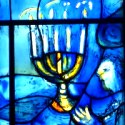 |
Note: For more about the dates of these holidays see the Calendar pages....
October 2021 Updates
Vanity of the Wicked...

10.30.21 (Cheshvan 24, 5782) Regarding the pagan holiday of "Halloween," remember that there is no "spell" or evil incantation (i.e., nachash: נַחַשׁ) effective against Jacob, there is no sorcery (i.e., kesem: קֶסֶם) against Israel. At this time it must be said of Jacob and of Israel, 'Look at what God has done (מַה־פָּעַל אֵל)' [Num. 23:23]. No weapon formed against God's people shall prosper (Isa. 54:17), and the curse of the wicked is powerless against the tzaddikim (Prov. 26:2). Ein od milvado (אֵין עוֹד מִלְבַדּו) - God is the only true Power (Deut. 4:35; 1 Chron. 29:11; Rev. 4:11). Satan is an impostor and a foiled usurper. As Yeshua told his followers, "Behold I give to you authority (ἐξουσία) to tread on serpents and scorpions and over all the power of the enemy (καὶ ἐπὶ πᾶσαν τὴν δύναμιν τοῦ ἐχθροῦ), and nothing shall by any means hurt you" (Luke 10:19). Like Balaam and Haman, all who curse God's people or attempt to foil His plans will be upended... Hallelujah and Amen.
Hebrew Lesson:
Numbers 23:23a reading (click):
"No weapon that is formed against you shall prosper; And every tongue that accuses you in judgment you will condemn. This is the heritage of the servants of the LORD, And their vindication is from Me," declares the LORD (Isa. 54:17). The wicked gnash their teeth and accuse the godly, but their words are vain and their end is certain... "Like a fluttering bird or like a flying swallow, so a wanton curse does not come to rest" (Prov. 26:2).
Hebrew Lesson:
Proverbs 26:2 reading (click):
The Last Word of Truth...

10.29.21 (Cheshvan 23, 5782) Though people assume they are "free to believe" whatever they want about the meaning and purpose of life, Ultimate Reality will always have the last word... Our Scriptures clearly teach that people ignore God at their own peril, and that we are therefore responsible to believe the truth and to reject what is false (1 John 4:6). This implies that we have a moral and spiritual duty to think clearly and not abuse our minds (Phil. 4:8; Rom. 12:2). God made us so that we could discern truth about reality. The mind functions according to logical laws because it is made in the image and likeness of God Himself... God Himself is the ground of all logic, since He created reality and structured the world to be knowable according to its laws. As it is written: "In the beginning was the word/logic (ὁ λόγος), and the λόγος was with God, and the λόγος was God" (John 1:1). God created a world that exhibits order and great beauty. And since human beings were created b'tzelem Elohim (בצלם אלוהים), in the image of God, our thoughts (and the words used to formulate our thoughts) as well as our actions are intended to exhibit order and beauty. It is written in our Scriptures that people perish because "they refuse to love the truth and so be saved" (2 Thess. 2:10-12). Therefore the issue of truth - physical, moral, aesthetic, spiritual, etc. - is central to salvation itself...
No one "invented" the laws of logic, but logical inference is presupposed in any form of declarative utterance (the denial of this axiom is self-stultifying and self-refuting). Since therefore the use of language presupposes the truth and validity of logic, every utterance we make is grounded in transcendental (i.e., non-empirical, intuitional, revelatory) meaning and significance (Psalm 19:2-3). In the world to come you will be shocked to understand that everything you thought, everything you said, and everything you did was given to you from above, and therefore has tremendous significance. Therefore, let us pray as dear King David prayed: "Let the words of my mouth and the meditation of my heart be acceptable in your sight, O LORD, my Rock and my Redeemer" (Psalm 19:14).
Hebrew Lesson:
Psalm 19:14 reading (click):
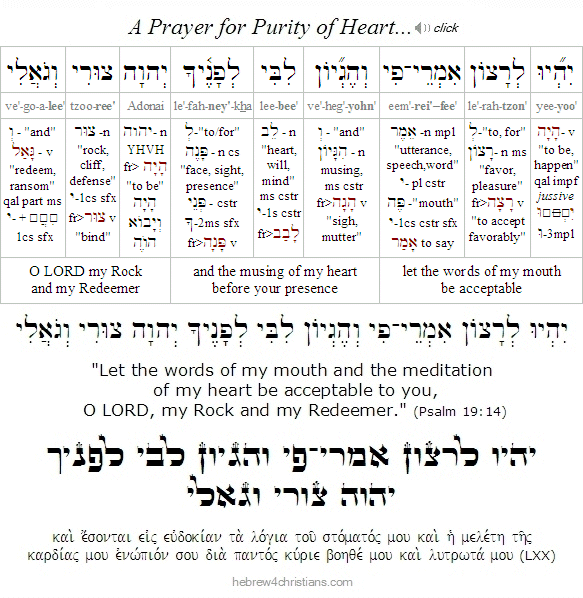 |
May it please God to help us use our words for the purpose of strengthening and upbuilding (οἰκοδομὴν) one another (Eph. 4:29). May our words always be gracious and "seasoned with salt" (Col. 4:6). Dear Lord, awaken our hearts. As it is written: "Whoever keeps His word, in him truly the love of God is perfected" (1 John 2:5).
Hebrew Lesson:
John 18:37b Hebrew reading:
Faith's Good Eye...
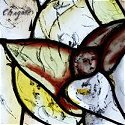
10.29.21 (Cheshvan 23, 5782) It is not your job to worry about all the problems in the world, nor is it your role to "fix" the troubles that abound everywhere. The upward call of God in Messiah is grounded in the present moment, the "eternal now," whence you are invited to "walk before God and be made whole" (הִתְהַלֵּךְ לְפָנַי וֶהְיֵה תָמִים, Gen. 17:1). This implies, among other things, that you must let evil flow past you and ascend by faith above the world and its profane ways. After all, it is God's business to turn darkness to light, to make crooked things straight, to redeem and heal the world and so on...
The eye of emunah (faith) discerns gam zu l'tovah (גַּם זוּ לְטוֹבָה), "this too is for good," which is an idea taken directly from the New Testament: "all things work together for good" (i.e., πάντα συνεργεῖ εἰς ἀγαθόν, Rom. 8:28). Notice that the affirmation is not gam zu tovah - "this is the good," but rather gam zu l'tovah - "this, too, is for good." Emunah "sees what is invisible" (2 Cor. 4:18) and understands that the "present form of this world is passing away" for purposes that are good (1 Cor. 7:31). It affirms that underlying the surface appearance of life (chayei sha'ah) is a deeper reality (chayei olam) that is ultimately real, abiding, and ultimately designed for God's redemptive love to be fully expressed. In this world we must "see through" a mirror (i.e., indirectly) to begin to see the dawn of our eternal home; but one day we will behold God panim el panim (פָּנִים אֶל־פָּנִים), "face to face" (1 Cor. 13:12).
The best way to engage in "tikkun olam" is to spread the hope and truth of the gospel to this world.... We do not look for utopia on earth apart from the Divine Presence.
Hebrew Lesson:
Prov. 22:9 Hebrew reading:
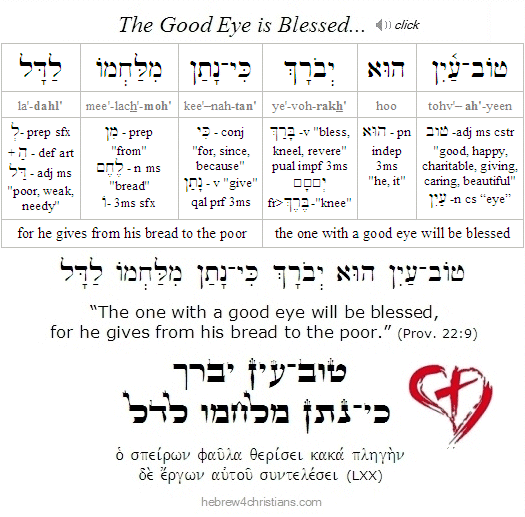 |
The Power to Repent...

10.29.21 (Cheshvan 23, 5782) Rabbi Israel Salanter, the father of the "Musar" movement, once said, "When I was young, I wanted to change the world. I tried, but the world didn't change. So I decided to change my town, but my town didn't change. Then I resolved to change my family, but my family didn't change. Then I realized that I first had to change myself." To the rabbi's wise words I would add the essence: "but then I realized that I couldn't change myself, so I cried to the LORD for a new heart and He answered my plea..."
We can only truly change when we die and are brought back from the dead by the power of God. As Yeshua said, "Unless a grain of wheat falls into the earth and dies, it remains alone; but if it dies, it bears much fruit" (John 12:24). We must be spiritually reborn, remade, transformed, "metamorphosed" by the grace and love and kindness of God. This is the miracle of genuine teshuvah (repentance).
Contrary to the laws of "karma" and worldly wisdom, God helps those who can't help themselves... He delights to take the weak and broken and establish them with divine power, for the glory of His own Name. He confounds the mighty of this world with the "foolish" heart of faith. Blessed be His Name forever and ever...
Hebrew Lesson:
Ezek. 36:26a Hebrew reading:
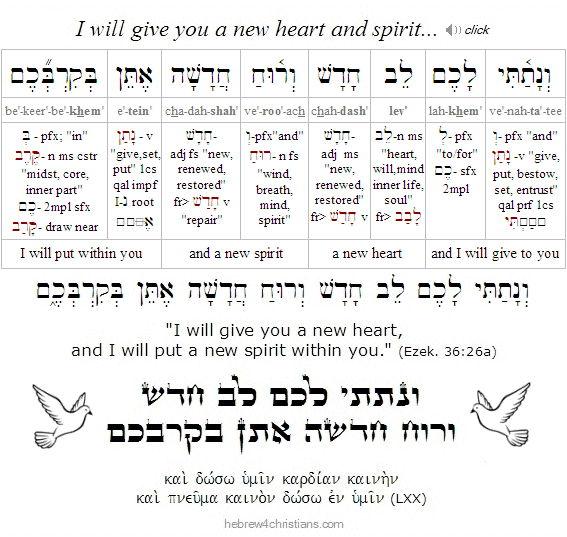 |
Redeeming the Time...

10.29.21 (Cheshvan 23, 5782) In this week's Torah portion (Chayei Sarah) we read about the death of Abraham, the original patriarch of the Jewish people and great hero of faith: "These are the days of the years of the life of Abraham, which he lived..." (וְאֵלֶּה יְמֵי שְׁנֵי־חַיֵּי אַבְרָהָם אֲשֶׁר־חָי) (Gen. 25:7). It is interesting to notice that this verse mentions Abraham's days but then goes on to state the number of years that he lived. Why, then, does the verse mention the word "days" at all? Moreover, the verse includes the seemingly redundant clause, "which he lived" (אֲשֶׁר־חָי), an addition that appears to be unnecessary to the meaning. Since the sages assumed that there were no unnecessary words revealed in the Torah, they wondered why the verse was written this way....
When we reckon a person's life span, we (objectively) refer to their physical longevity in terms of years. This is why we celebrate birthdays, after all, and that's why we refer to someone as being so many years old. Jewish tradition recognizes calendar years, of course (our verse states that Abraham lived 175 years), though the sages understood time primarily in terms of "length of days." When the patriarch Isaac died, for example, the Torah says he was "gathered to his people - זָקֵן וּשְׂבַע יָמִים - "old and full of days" (Gen. 35:29). The sages defined a day (yom) in terms of the total time of daylight (measured from sunrise to sunset), and defined an hour (sha'ah) by dividing that time into 12 equal parts (this is called sha'ah zemanit, or a "proportional hour"). Each proportionate hour was then divided into 1080 "parts" (called chalakim), and each part (chelek) was further divided into 76 "moments" (rega'im). In other words, the sages measured time by increasingly smaller units, and these days, hours, "parts," and moments were used to objectively measure time (interestingly, modern science likewise attempts to "divide time" down to smaller and smaller units, until it defines it as the length of time required for light to travel in a vacuum, i.e., "Planck time." In other words, space and time are known through observing light).
Life is surely more than a quantitative measurement of time, however. What good is a physically long life without a relationship with God? Is it not "vanity of vanities," a "tale told by an idiot, full of sound and fury, signifying nothing," as Shakespeare once said? Time finds its qualitative meaning, its purpose, and its direction only in relationship with God, who is the "beginning, the middle, and the end." Our personal histories likewise have a beginning, middle, and an end that together form a "story" about who we are.... Your life is "going somewhere," and each moment of your day is your means to that end. Each moment leads inexorably to the next, and together these moments form hours, days, and the "days of the years." Teshuvah (repentance) is a conscious choice to turn to God amidst the flux of passing time in order to awaken to the realm of the eternal. Therefore we see the greatest of the tzaddikim (such as Abraham) living out the "days of the years" in conscious awareness of eternity, and of his ultimate destination: "By faith Abraham obeyed when he was called to go out to a place that he was to receive as an inheritance. And he went out, not knowing where he was going. By faith he went to live in the land of promise, as in a foreign land, living in tents with Isaac and Jacob, heirs with him of the same promise. For he was looking forward to the city that has foundations, whose designer and builder is God" (Heb. 11:8-10). Faith affirms that underlying the "surface appearance" of fleeting life (olam hazeh) is a deeper reality that is ultimately real and abiding (olam habah). It "sees what is invisible" (2 Cor. 4:18) and understands (i.e., accepts) that the "present form of this world is passing away," like so many seconds ticked off a clock (1 Cor. 7:31).
Time is God's gift to us, as well as a test... The story is told about how a man once spied the Vilna Gaon sitting at a table in the evening, weeping over a small piece of paper he had pulled from his pocket. After he wiped away the tears, the Gaon got up and left the room, leaving the paper on the table. The man who oversaw this then went over to look at the piece of paper and saw just seven dots marked on it, nothing else. Overcome by curiosity, the following morning the man asked the Gaon what the paper meant and why it made him cry. The Gaon then explained that each evening he would review how he used his time that day. For every moment he wasted, he would mark a dot on a piece of paper. At the end of the day he would look at the paper and ask God's forgiveness for wasting the time.
The point of the story is that time is a precious gift, and how we choose to live each moment makes an eternal difference in our lives. As Moses prayed, "Teach us to number our days rightly, that we may attain a heart of wisdom" (Psalm 90:12). We obtain such wisdom (chochmah) through the Torah: "And you shall meditate upon (the Torah) day and night" (Josh. 1:8). As disciples, we must study the Scriptures to show ourselves approved before God (2 Tim. 2:15). But study alone is not enough. We must practice the truth and walk it out in our daily lives: "Only take care, and keep your soul diligently... Turn not away from your heart all the days of your life" (Deut. 4:9). "Above all else guard your heart, for from it are the outflows of life" (Prov. 4:23).
Hebrew Lesson:
Prov. 4:23 Hebrew reading:
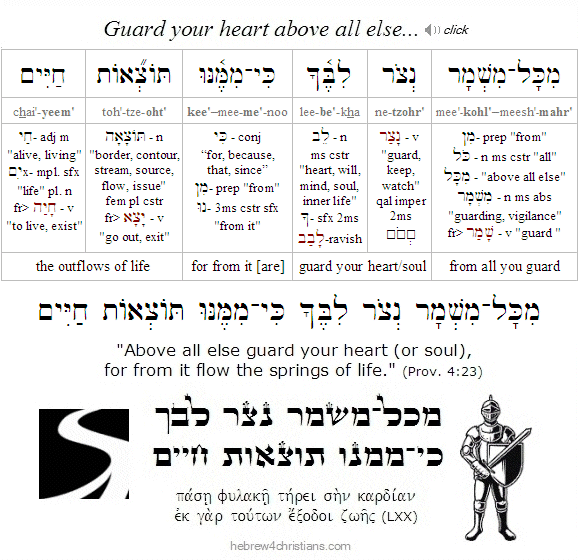 |
As followers of Yeshua, we are commanded to "redeem" (ἐξαγοράζω) the time, because the days are evil (Eph. 5:16; Col. 4:5). The Greek word used here implies exchanging the fleeting moments of the day with the conscious awareness that we will one day stand before the Judgment Seat of Messiah to give account for our lives (Matt. 12:36-37).
May the LORD help us wake up and refuse to exchange the eternal treasure of the Kingdom of God for the fleeting vanities of this world. As the late Jim Eliot succinctly reminded us, "He is no fool who gives what he cannot keep to gain what he cannot lose."
Faith and Resurrection...
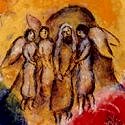
[ The following entry is related to this week's Torah reading, parashat Chayei Sarah... ]
10.29.21 (Cheshvan 23, 5782) More space is given to the negotiation between Abraham and the Hittites for the Cave of Machpelah, a burial site in Hebron (Gen. 23:3-16), than many other matters in Torah, since it represented Abraham's faith in the resurrection from the dead. Indeed it was the death of Sarah that moved Abraham to "see and greet from afar" the fulfillment of God's promise, despite the appearances of this world (Heb. 11:13). Thus Abraham said to the sons of Chet: "I am a 'stranger and sojourner' (גֵּר־וְתוֹשָׁב) among you; sell me a burial site..." (Gen. 23:4). Abraham foresaw the City of God, "Zion to come," and by faith "he was looking forward to the city that has foundations, whose designer and builder is God" (Heb. 11:9-10). This the legacy of Abraham as the father of faith (Gal. 3:7).
It is significant that after the great Exodus, the two faithful spies sent to scout the land (Joshua and Caleb) first visited the burial place of the patriarchs in Hebron to renew their conviction that the land could be taken (Num. 13:21-22). The heart of faith affirms the promise of God, even in the face of the dust of death itself; it affirms that underlying the surface appearance of life is a deeper reality that is ultimately real and abiding. It "sees what is invisible" (2 Cor. 4:18) and understands (i.e., accepts) that the "present form of this world is passing away" (1 Cor. 7:31). Faith is the assurance of things hoped for, the conviction of things not seen (Heb. 11:1).
"These (i.e., the patriarchs) all died in faith, not having received the things promised, but having seen them and greeted them from afar, and having acknowledged that they were strangers and exiles (גֵּרִים וְתוֹשָׁבִים) on the earth. For people who speak thus make it clear that they are seeking a homeland (i.e., πατρίδα, "land of the Father"). If they had been thinking of that land from which they had gone out, they would have had opportunity to return. But as it is, they desire better, that is, a heavenly land. Therefore God is not ashamed to be called their God, for he has prepared for them a city" (Heb. 11:13-16).
Hebrew Lesson:
Psalm 39:12 Hebrew reading:
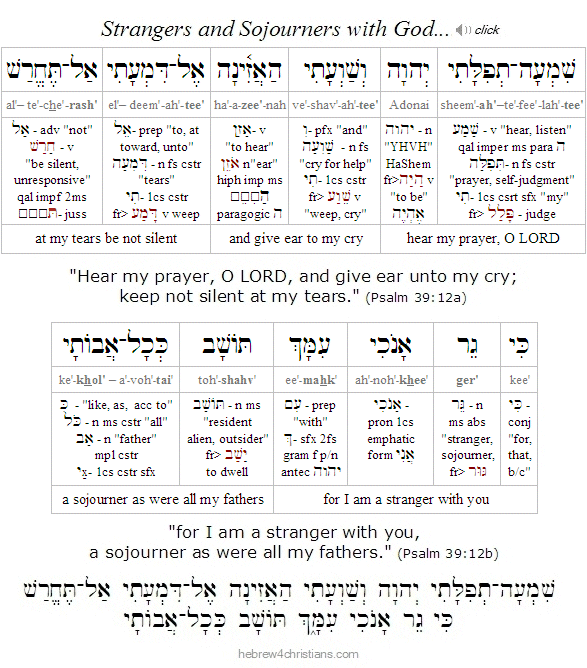 |
Enduring to the End...

10.28.21 (Cheshvan 22, 5782) "Whoever endures to the end will be saved" (Matt. 24:13). Here Yeshua speaks regarding "endurance" (ὑπομονή), or the ability to hold fast to your faith despite hardship and suffering... There is a risk - a very real danger - of turning away from God, and therefore we are warned to "continue in the faith" and not to "drift away" from the blessing of our salvation (Col. 1:23; Heb. 2:1-3). It is not sufficient to simply accept the message of the gospel, or to intellectually assent to its truth, because truth is something lived, fought out in our conflicts and in our temptations...
We must be anchored to the truth lest we become shipwrecked in our faith. Drifting occurs slowly and almost imperceptibly, though the end result is as deadly as openly turning away from God in outright apostasy. As C.S. Lewis once wrote, "The safest road to hell is the gradual one - the gentle slope, soft underfoot, without sudden turnings, without milestones, without signposts." The devil seeks to lull you to sleep...
In light of such admonition, we may at first suspect that the battle has to do with our behavior, for example, whether we indulge the lower nature, and yet, as Soren Kierkegaard once said, "the opposite of sin is not virtue but faith," which I understand to mean that the struggle is first of all one of the mind, as it decides what it values and thereby directs the will in its choices. "According to your faith be it done to you."
What we fear says a lot about what we really believe, and therefore what we are thinking. True fear is awareness of the sanctity of life - the "fear of the Lord" (יראת יהוה) which is the beginning of wisdom (Prov. 9:10). True fear is true because it corresponds to reality by discerning that God is the source of all that is worthy and good. False fear, on the other hand, reveals disordered thinking, by both believing that some finite good is utmost and that losing that good is an existential threat. False fear is grounded in worldly concern and pleasures that immerse the soul in the moment, devoid of consciousness of any deeper connection with the future. "Time and busyness think that eternity is very far away" and this becomes the temptation that your life and eternity are unrelated.
We are distracted by the demands of time to disregard the demands of eternity. In this connection Kierkegaard says: "In superstitious delusion one would rather hope for temporal help than grasp the eternal... It is false wisdom that cheats itself out of the highest comfort, and by means of a mediocre comfort helps itself to even more mediocre comfort - and ultimately into certain regret" (Upbuilding Discourses).
So how can we escape from ourselves? How can we - as fallible, frail, and perverse creatures - "endure to the end" and be saved? How can we understand the imperatives of God when we have no confidence in ourselves, and indeed, we know ourselves in our powerlessness? How can we endure ourselves? (Rom. 7:18). Is this the "ulterior reason" for the commandments, after all -- to reveal and convict sin within our hearts? (see Rom. 7:11-25). Is despair over ourselves a gift from God that rouses us to seek for a power greater than ourselves that is able and willing to save us? Is that not the message of the gospel, after all? That God justifies the ungodly by faith? Is this not our remedy found in the "righteousness of God" that is manifest in a source outside of the "law," that is, the realm of lovingkindness and grace?
The law teaches us something precious - namely, our extreme spiritual poverty and powerlessness in relation to the good, our profound sickness of heart, the reason for our grief, our anguish, and our sorrows, and therefore it teaches our great need for the Savior, who delivers us not just from the verdict of the law, but from the indwelling shame and despair that tempts us to abandon the will to endure... We are saved by the love of God and treasured by him, and by means of his love we endure unto the end.
Yeshua is our Mediator, our Advocate, and our Healer. He is the one who endures to the end so that we will be saved. "He was placed under the law for us, bore our sin, and in his path to the Father rendered to his Father entire, perfect obedience from his holy birth to his death in the stead of us poor sinners, and this covered up our disobedience, which inheres in our nature, so that our disobedience is not reckoned to us for our damnation but is forgiven - by sheer grace for Christ's sake alone" (Book of Concord). The biggest problem we have is the sickness of eternal death, and therefore the deepest need we have, even if we are not conscious of it, is that of eternal life. The message of the gospel is that we are healed of eternal death and given eternal life in the blessing of Yeshua.
Yeshua's salvation for us doesn't just open heaven for us in the end, but is alive and present for us now - He is with us always, even to the end of our days - which is to say he shares his victory and strength with us in this very hour, and indeed, forever.
The way of faith keeps focused on eternity, seeking the things that are above" (Col. 3:1-4). There is an inward weight of glory that is worked within our hearts as "we look not at the things which are seen, but at the things which are not seen: for the things which are seen are temporal; but the things which are not seen are eternal" (2 Cor. 4:18). Drifting away into "this world" and temporality is to fall into the realm of despair and lose sight of the miracle of salvation. Therefore, because of the relentless propensity toward our "fallenness," we must turn to God in daily repentance. It is his daily bread that enables us to endure to the end...
We pray: "Give us this day our daily bread; forgive us our sins..." (Matt. 6:11-12). We are both forgiven people who need forgiveness, yet we are under constant temptation to look away, to drift, and to forget our great need to accept God's forgiveness. When we forget our need, however, we fall into pride and therefore must be disciplined and humbled. The "law of sin and death" is the scourge that leads us to surrender to God's power to save us from ourselves. The "law of the spirit of life," on the other hand, is the law of faith, affirming that it is "not by might, nor by power, but by God's Spirit" that we are set free from our inner corruption and brokenness. "As many as are led by the Spirit of God are the children of God."
We are being educated for eternity, and the life of faith is a long lesson in obedience -- learning to suffer God's will, to accept whatever happens, and to endure in hope. Practically speaking this means "laying aside" your desires and surrendering yourself -- all that is within you -- in trust of God's plan for your life, even (and especially) in the most difficult moments... Indeed, in light of the end of life what we really need is perseverance, or what the New Testament calls hupomone (ὑπομονή), a word that means "dwelling [μένω] under [ὑπο]" God's Presence while being tested. The life of faith is a form of suffering that calls for patience and wisdom as we learn to endure our own frailty and to trust God for what is best... We do not learn obedience apart from the test of faith, and therefore obedience cannot be taught apart from the struggle to believe. We wrestle to surrender, with groans and sighs we utter: "not my will, but thy will be done." As Kierkegaard said: "This is the key to finding rest in your suffering. There is only one way in which rest is to be found: to let God rule in everything. Whatever else you might come to learn only pertains to how God has willed to rule. But as soon as unrest begins, the cause for it is due to your unwillingness to obey, your unwillingness to surrender yourself to God."
It is the Spirit that gives life; the flesh profits nothing (John 6:33). It is impossible for the human heart to believe that God is gracious to him, and yet the very greatest danger is despairing of grace... Faith and grace are therefore intimately connected, for God's acceptance and forgiveness is for those who believe... We do not find God's heart by relating to him through the law - that is, by appealing to him as our Judge - but by relating to him through grace - that is, by believing and receiving him as our Savior. Despair comes from our own spirit trying to reason or bargain with God's acceptance; but salvation comes from hope imparted by the Holy Spirit, which is to say, by means of the miracle of God.
We are not without God's help in our pilgrimage, friend. Yeshua promised that the Ruach HaKodesh (רוּחַ הַקּדֶשׁ) would be "called alongside" (παράκλητος) to comfort us on the journey. The English verb "comfort" literally means "to give strength" (from com- ["with"] and fortis ["strong"]), an idea similarly expressed by the verb "encourage," that is, to "put heart [i.e., 'core'] within the soul." In Hebrew, the word courage is expressed by the phrase ometz lev (אמֶץ לֵב), meaning "strong of heart," denoting an inner quality of the will rather than of the intellect. Ometz lev means having an inner resolve, a passion, and a direction.
The walk of faith requires courage, that is heart... The human mind reasons and therefore fears, but the heart is the center of our being, the core of who we are. The heart does not reason its way to love but instead allows love to inform and direct reason. Therefore God asks our hearts to trust in him, and he does not allow calculated human reason with its fears to move us on the way (Isa. 55:8). When we receive divine grace to faithfully suffer, we hear the Spirit whispering back to us: "Be not afraid..." "Live in me..." "Walk in the light..." "I am with you always..." "You will endure..." "You are loved..."
Hebrew Lesson:
Psalm 73:26 Hebrew reading:
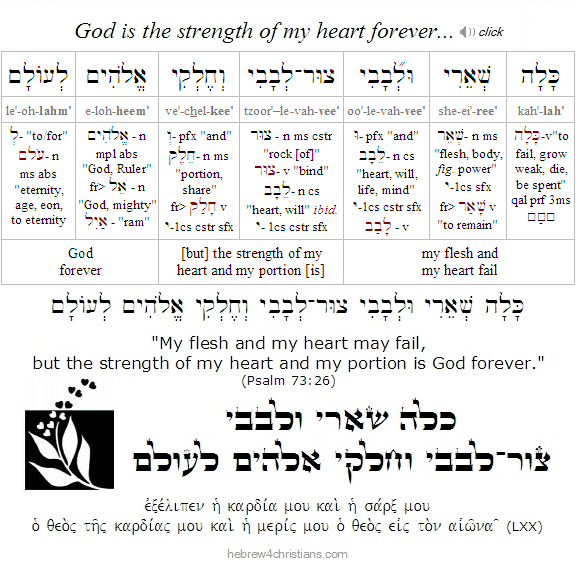 |
Every Soul's Passion...

10.28.21 (Cheshvan 22, 5782) "Everybody wants to go to heaven, but nobody wants to die..." Everybody wants the finished product of a surrendered life, but no one wants the process, the painful shattering, the revelation of the end of themselves... And yet it is only by means of affliction that the "outer shell of the seed" is broken so that new life can burst forth: "I tell you the solemn truth, unless a kernel of wheat falls into the ground and dies, it remains by itself alone. But if it dies, it produces much grain" (John 12:24). If the seed does not fall to the ground and die, αὐτὸς μόνος μένει - it remains alone - by itself...
Since we will not surrender without struggle, God must intervene and save us from ourselves. Each of us must "go to Peniel" to wrestle with the Angel; each of us must be renamed from Ya'akov ("a supplanter") to Israel ("a prince with God"). Like Jacob, we will prevail with God when we give up the fight and accept our brokenness. We win by losing...
It's been said that we can never know that God is all we need until God is all we have left (John 15:5). Therefore "blessed are the poor in spirit, for theirs is the kingdom of heaven; blessed are those who mourn, for they shall be comforted; blessed are those who hunger and thirst for righteousness, for they shall be filled..."(Matt. 5:3-6).
טרם אענה אני שׁגג
ועתה אמרתך שׁמרתי
te'·rem · e·ei'·neh · a·nee · shoh·geig
ve·a·tah · eem·ra·te·kha · shah·mar'·tee

"Before I was afflicted I went astray,
but now I keep your word."
(Psalm 119:67)

Hebrew Lesson:
Psalm 119:67 Hebrew reading:
Blessed in all things...
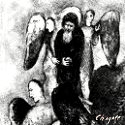
10.28.21 (Cheshvan 22, 5782) In our Torah for this week (i.e., Chayei Sarah) we read that "Abraham was old" (אַבְרָהָם זָקֵן) and had "come into days" (בָּא בַּיָּמִים), which the sages say marked the final stage in his sojourn wherein he realized that all was vanity, and therefore he gave the remainder of his life over to prayer and teshuvah... And this was what was meant that the LORD had blessed Abraham "bakol" (בַּכֹּל) "in all things" (Gen. 24:1). Abraham, in other words, had attained unto the wisdom of God in which he closed his eyes to this world of vanity and shadows and beheld the unchanging truth at the heart of reality.
So in the same verse that describes the great patriarch as "old and come into days" (זָקֵן בָּא בַּיָּמִים), he is also described to have been blessed "bakol" (בַּכּל) - "in everything." Contrary to the ideals of youth-obsessed culture, the Torah regards aging as a process of construction, of upbuilding, of perfection -- and not of decay. The sages say that the elderly "wear the days of their life as a garment," that is, as an accumulated "presence of days" that attends to the soul of the person. Indeed, the Talmud notes that the word zaken ("elder") can be read as "zeh kana," "this one has it." Maturity and wisdom are qualities that should be honored in our culture -- not abhorred or disregarded. As the proverb puts it, עֲטֶרֶת תִּפְאֶרֶת שֵׂיבָה / aseret tiferet sevah: "Gray hair is a crown of glory" (Prov. 16:31). That the LORD blessed Abraham "bakol" means that He revealed his presence to him in all things. This is the meaning of the "Abraham was old, come into days." The days of his life were filled with the wonder of God's presence, and that is why he died content (Gen. 25:8).
Hebrew Lesson:
Gen. 24:1 Hebrew reading:
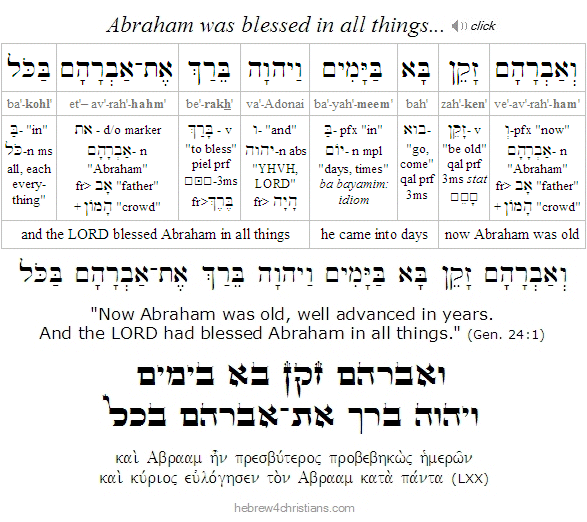 |
Inner Ache of Loneliness...
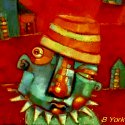
10.27.21 (Cheshvan 21, 5782) A.W. Tozer once wrote: "The loneliness of the Christian results from his walk with God in an ungodly world, a walk that must often take him away from the fellowship of good Christians as well as from that of the unregenerate world. His God-given instincts cry out for companionship with others of his kind, others who can understand his longings, his aspirations, his absorptions in the love of Christ; and because with his circle of friends there are few who share his inner experiences, he's forced to walk alone. The unsatisfied longings of the prophets for human understanding caused them to cry out in their complaint, and even our Lord himself suffered in the same way.
"The man (or woman) who has passed on into the divine Presence in actual inner experience will not find many who understand him. He finds few who care to talk about that which is the supreme object of his interest, so he is often silent and preoccupied in the midst of noisy religious shoptalk. For this he earns the reputation of being dull and over-serious, so he is avoided, and the gulf between him and society widens. He searches for the friends upon whose garments he can detect the smell of myrrh and aloes and cassia out of the ivory palaces, and finding few or none, he, like Mary of old, keeps these things in his heart. It is this very loneliness that throws him back upon God. His inability to find human companionship drives him to seek in God what he can find nowhere else."
Such was Abraham's test, as he had no way to communicate his burden regarding the sacrifice of his beloved son Isaac. And there is also a loneliness that arises when you must wrestle through disappointment in your walk with God... This is an empty place where you realize that you're request has been denied, and yet you must continue to walk on in trust. That is a hard place, too.
"Blessed are those who hunger and thirst for righteousness" (Matt. 5:6). Yes, blessed are those who suffer such desperate need, who know inner emptiness, who are not made numb to the ache, and who cry from the heart for deliverance. Blessed are those who are in dread over themselves, who fall as one dead before the Divine Presence, who know they are undone, ruined, and dying for life... The great danger, spiritually speaking, is to become complacent, untouched by poverty of heart, to be lulled asleep, lost within a dream, made comatose, living-yet-dead. The gift of faith first reveals our own lostness and then imparts courage to live with ourselves despite ourselves as we seek God's healing and life...
Hebrew Lesson:
Matt. 5:4 Hebrew reading:
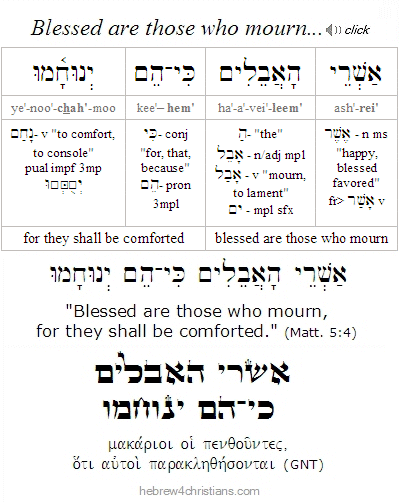 |
A Blessed Undoing...

10.27.21 (Cheshvan 21, 5782) Do you have the "gift of holy desperation"? That's the very special blessing of needing God so viscerally that you otherwise will fall apart or even self-destruct apart from His ongoing intervention in your life... You pray because your very life depends on it; you believe because without God, you would be swallowed up in darkness... The fire on the altar was to be kept burning at all times (Lev. 6:12-13), which symbolizes esh tamid (אֵשׁ תָּמִיד), or the inner fire of the heart... How blessed it is to be full of the fire of this inner need, this relentless groaning, this constant hunger to be set free: As Job wistfully yearned: "All the days of my warfare I will keep hope until my change will come."
Hebrew Lesson:
Job 14:14b Hebrew reading:
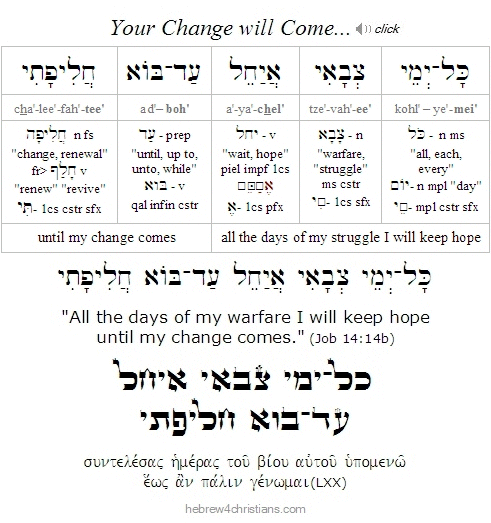 |
The Hebrew word for "change" (חֲלִיפָה) here refers to a change of garments, picturing the robes that Joshua the High Priest was given when he stood accused before the Angel of the LORD (Zech. 3:3-5). We want to be fully clothed with the garments of God's righteousness that are imputed to us through faith. Our groaning for complete deliverance from the effect of our sins is further evidence of the inner vision we have been given by the Holy Spirit.
The Seal of Truth...
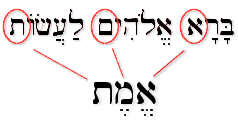
10.27.21 (Cheshvan 21, 5782) The sages state "the seal of God is truth," by which they mean that truth bears its own witness to reality: it is God's signature or sign... Spiritual truth is ultimately personal, since it is "lived truth," and therefore it is part of the inner will of the person. A true person's life will agree with his or her words; the inner and the outer will correspond and align. The apostle Paul wrote that God's firm foundation (i.e., yesod: יְסוֹד) bears this distinctive seal: on one side is imprinted, "The LORD knows those who are his" (יוֹדֵעַ יְהוָה אֵת אֲשֶׁר־לוֹ) and on the other side is imprinted, "Let everyone who names the Name of the LORD depart from iniquity" (כּל־הַקּוֹרֵא בְּשֵׁם יְהוָה יָסוּר מֵעָוֶל; 2 Tim. 2:19). People can say one thing and believe another, but ultimately no one can "fake" the truth: God bears witness to what is real, as it says, "All are naked and exposed to the eyes of Him to whom we must give account" (Heb. 4:13). The LORD knows who are really his own, and who are impostors. As Yeshua said: "My sheep hear my voice, and I know them (וַאֲנִי יוֹדֵעַ אתָן), and they follow me" (John 10:27).
We can test whether our faith is genuine by first asking whether we are trusting Yeshua to be our only means of salvation (and sanctification) -- believing that he alone is our means of finding the righteousness of God (צִדְקַת אֱלהִים), -- and then honestly examining our actions to see whether we evidence the love of God (John 14:1; 15:9-10; 1 John 4:7-8). "Whoever says he lives in Him ought to walk in the same way in which he walked" (1 John 2:6). May the LORD help each of us to evidence in the power the "seal of truth..."
The Hebrew word for truth is emet (אֱמֶת), a word that consists of the first, middle, and last letter of the Hebrew alphabet, indicating that truth encompasses all things and endures from the beginning (א) to the end (ת). But notice that if we remove the letter Aleph from the word, we are left with מֵת, (dead), the opposite of חַיִּים (life). The letter Aleph is the ineffable letter that represents oneness and God's preeminent glory. Therefore, if we attempt to ignore or suppress God in our understanding of truth, we end up with death...
Yeshua our Messiah is called "the Aleph and the Tav" (הָאָלֶף וְהַתָּו), "the first and the last" (הָרִאשׁוֹן וְהָאַחֲרוֹן). These are divine titles that belong exclusively to YHVH (Isa. 41:4, 44:6, 48:12; Rev. 1:1,17-18; 22:13). Pilate's famous question, "What is truth?" is a category mistake, since truth is not about "what" but about "Who." That is, truth is not something objective and static, a thing to be known and studied from a distance. No. Truth is up-close and personal.... You don't judge the truth, but the truth will reveal what is within you...
Hebrew Lesson:
Psalm 86:15 Hebrew reading:
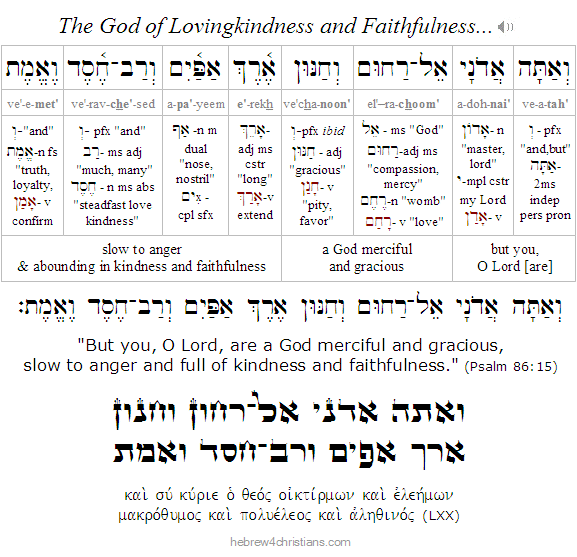 |
For more on this subject, see the article, "What is Truth?"
The LORD delivers from death...
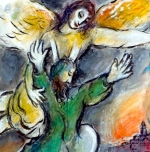
[ I wrote this a year and a half ago, when Covid 19 was just beginning to be exploited by the change agents of culture. The devil plays the long game... This still applies today. ]
10.26.21 (Cheshvan 20, 5782) In light of all the worldwide fear over contracting or dying from a virus, I encourage you to remember the words of Scripture that proclaim that Yeshua came to "deliver all those who through fear of death were subject to lifelong slavery" (Heb. 2:15). For those who believe, death is a conduit to heaven and the Presence of God. As Yeshua our Savior said: "I am the resurrection and the life (אני התחייה והחיים). Whoever believes in me, though he die, yet shall he live, and everyone who lives and believes in me shall never die" (John 11:25-26). "Behold, the eye of the LORD is on those who fear him, on those who wait for his lovingkindness, that he may deliver their soul from death..." (Psalm 33:18-19). As Paul also said: "We felt that we had received the sentence of death; but that was to make us rely not on ourselves but on God who raises the dead. He delivered us from such a deadly peril, and on him we have set our hope that he will deliver us again" (2 Cor. 1:9-10). "For you did not receive the spirit of slavery to fall back into fear, but you have received the Spirit of adoption as children, by whom we cry, "Abba! Father!" (Rom. 8:15).
Hebrew Lesson:
Psalm 33:18 Hebrew reading:
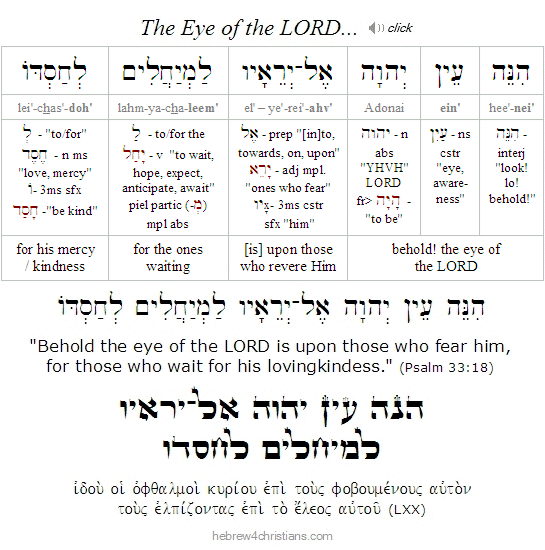 |
We are given daily bread (לחם יומי) -- just enough to sustain us for this day. This teaches us to live one day at a time, trusting in God's provision and thanking him for the gift of life. The Torah of "manna" teaches us to trust God and to be thankful for his daily care. When you live each day as if it might be your last, the fear of the future fades away and you are free to live at peace in the moment. Therefore Yeshua taught us: "Don't be anxious about tomorrow, for tomorrow has its own troubles. Live one day at a time" (Matt. 6:34). Kierkegaard comments: "If there is no next day for you, then all earthly care is annihilated. When the next day comes, it loses its enchantment and its disquieting insecurity. If there is no next day for you, then either you are dying or you are one who by dying to temporality has grasped the Eternal, either one who is actually dying or one who is really living... The one who rows a boat turns his back to the goal toward which he is working. So it is with the next day. When, with the help of the Eternal, a person lives absorbed in today, he turns his back to the next day. The more he is eternally absorbed in today, the more decisively he turns his back to the next day." Amen. We walk by faith, not by sight (כי באמוּנה נתהלּך ולא בּראוּת עינים); we stand in the intersection between time and eternity, suspended between what is seen and what is unseen, and it is from that place of struggle and exile that we call upon the Name of the LORD, our Strong Tower in the midst of the flux of this passing realm (Prov. 18:10).
Hebrew Lesson:
Proverbs 18:10 Hebrew reading:
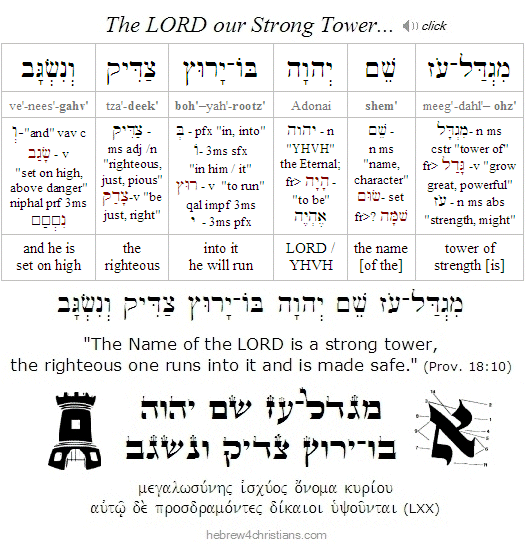 |
Receiving Salvation...

[ How do we get "saved" or are made right with God? Is it by means of religious rituals, or by doing good deeds, or by believing certain things about God, or perhaps all of these? ]
10.26.21 (Cheshvan 20, 5782) Do you really understand how you are "saved" or made right with God? Do you "get" the message of the gospel? I once read from a Christian devotional book that said that in order to receive God's salvation you must do the following: 1) believe in Jesus' substitutionary death and resurrection; 2) turn away from your sins, and 3) ask him to be the Lord and Savior of your life. The author then went on to explain that "this means you have to renounce and turn away from everything in your life that is contrary to what God wants: you must give up your sinful self-centeredness and turn to God."
Now while at first glance this appeal may sound Biblical, it implicitly assumes that your own goodness and self-effort will save you. After all, if you really could turn away from your sins and from "everything in your life that is contrary to what God wants," and if you really could simply "give up your sinful self-centeredness," then there really would be no need for the miracle of spiritual rebirth, no need for the power of God to impart a new nature to you, and therefore no need for the cross of Messiah to save you from the verdict of the moral law.
Contrary to the vain hope that "God helps those who help themselves," we must emphasize that God helps precisely and only those who cannot help themselves... Indeed the teaching of the New Covenant is clear: God will perform a miracle by putting his Torah within your will, writing it on your heart, and recreating you into his child (Jer. 31:33; Ezek. 36:26; John 3:3; 2 Pet. 1:4). All this comes from the power of God alone, however, not by human aspiration or resolution or good works (John 1:12-13; 6:44; Rom. 10:9-12; Titus 3:5). Like father Abraham, we are "justified" (i.e., made right) with God by believing in his power, relying on his Spirit, and trusting in his promise of love (Hab. 2:4; Rom. 4:13-25).
Yeshua did not come to set up a "new religion" but to give life to the dead. Therefore it is no longer "I" who live but Messiah in me, which is to say that we do not possess the miracle but the miracle possesses us... You are made into a new creation (בְּרִיָּה חֲדָשָׁה); your former life is passed and now all things become new (2 Cor. 5:17). But again you are not saved by "reforming" your character or by becoming a "promise keeper," but trusting in God's power and character. This is the way to receive the blessing. You come to God just as you are - acknowledging the truth of your raw and desperate need for deliverance from the corruption of your sinful condition, pressing past the verdict of the law in your desire for God's compassion (Psalm 85:10; Rom. 4:25). That's the heart of the gospel, after all. All you can do is bring is your brokenness and need to God for healing and then to respond to God's love by receiving it with humility and gratitude. Being made right with God is the gift of accepting that you are accepted despite your unacceptability because of God's great mercy for your life. This is indeed a miracle, for we need God to even know that we need God! As Yeshua said: "Blessed are the poor in spirit, for theirs is the Kingdom of God" (Matt. 5:3).
"This wish to satisfy someone greater than the self, to be found acceptable, to belong at last, is a struggle familiar to many psychotherapy patients. In their lives they waste themselves on wondering how they are doing, on trying to figure out the expectations of others so that they can become someone in the eyes of others. They try to be practical, to be reasonable, to figure it all out in their heads. It is as though if only they could get the words straight in their heads, if only they could find the correct formula, then everything else in their lives would be magically straightened out. They are sure there is a right way to do things, though they have not yet found it. Someone in authority must know... It is as though it were discovered that two and two really did not equal four (but five), then at that moment all over the world every machine would stop operating, all of the lights would go out." (Sheldon B. Kopp)
It is carnal pride to think that we can pledge to be perfect before we can come to the Lord for salvation. Can you imagine a person who has suffered for years as an alcoholic or addict of some kind being told that in order to be made right with God, they must believe that Yeshua died for their sins and that they therefore must turn away from all their sins, be perfect in their resolve, and pledge never to sin or be selfish again? For those of you who have suffered from addiction or struggled with chronic character defects in your lives, you know that empty promises to change mean nothing when it comes to turning away from what holds you in bondage... עָקב הַלֵּב מִכּל וְאָנֻשׁ ה֑וּא מִי יֵדָעֶנּו - "The heart is deceitful above all things and incurably sick: Who can know it?" (Jer. 17:9). God is not impressed with our promises and pledges; he understands that we are bankrupt and powerless; he knows that what we need is nothing less than the miracle of raising a dead person to newness of life.
None of this is meant to impugn the importance of living your faith and making godly choices, of course... "Faith without works is dead," but note that such "works" come from the Spirit of God, as the truth that is worked into us is worked out in our experiences. The "work" of God is to believe in Yeshua (John 6:29) and true faith will "show up" in our lives... We must test the spirits but more importantly test our own -- do you really believe, even when you are tempted to judge yourself or others? There's nothing "easy" about really believing in God (though it is easy enough to say you believe when in fact you don't). The pattern remains: unless a seed "falls to the ground" and dies it abides alone; but if it dies, it brings forth much fruit (John 12:24). We first encounter the risen Lord and connect with the truth, and then we get off our crazy road to Damascus... Our subsequent life of sanctification is a "slow motion" catching up with the miracle and reality of the new birth wherein we "become who we are" in the Messiah (Col. 1:27; 3:1-4). In this connection, however, please remember that all the commandments of the New Covenant are directed to the new nature, not the old "Adamic" nature that is mortified and buried away from the life of the child of God.
Hebrew Lesson:
Isaiah 45:22 Hebrew reading:
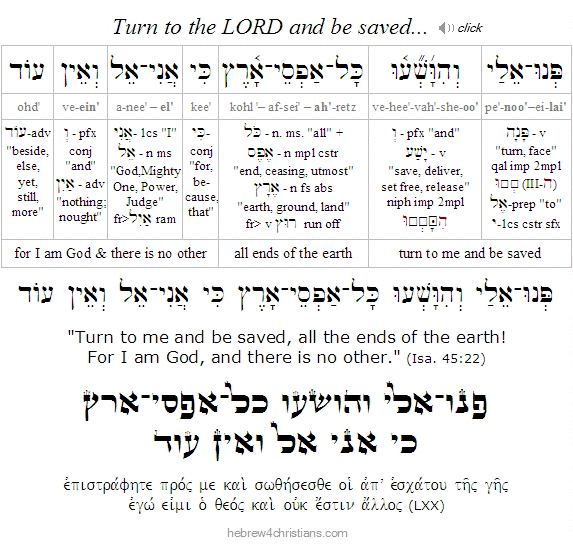 |
Note: The Gospel and Buddhism...
Reflecting on the meaning of the true gospel message reveals that Buddhism (and Hinduism from which it evolved) presents another "gospel of humanism" as well. For instance, many Buddhists understand the problem of life to be suffering (dukkha) caused by selfish desire (tanha), and the way of release (moksha) from the wheel of rebirth (samsara) is to attain "nirvana," that is, to extinguish the ego and its desires by means of the enlightened practice of "right" views, intentions, speech, action, livelihood, effort, mindfulness, and concentration summarized as the "Noble Eightfold Path." The eightfold path, in other words, is the means by which the soul is ultimately transformed and healed... On the other hand ancient Hinduism (as well as ancient Stoicism, for that matter) teaches that salvation is attained when we attain "divine consciousness" through various forms of "yoga" or ascetic disciplines. Only after long study and religious practices do we learn that all things are "one," and therefore the depth of the soul ("Atman") is ultimately divinity ("Brahman"). Salvation means becoming aware that you are inherently embedded into the oneness of all that is real: "One is the word of truth; two is the word of error." Duality of any kind is an illusion (maya), but understanding that "atman is Brahman" leads to timeless understanding and infinite bliss (mukti). The humanistic practice of various forms of yoga are the means by which people are saved -- not the revelation of the Mystery and Love of the Living God who radically intervenes in this world to save humanity from spiritual death.
The Time of Visitation...
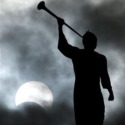
10.26.21 (Cheshvan 20, 5782) Yeshua lamented over Israel: "You did not recognize the time of your visitation..." (Luke 19:44). But how was it possible for otherwise devoutly religious people to miss the advent of the Messiah -- were it not because they disregarded the signals meant to awaken them? "So also, when you see all these things, you know that he is near, at the very gates" (Matt. 24:33). That's part of the message of teshuvah as well: Repent and believe the message of life (see Heb. 3:7-4:11). Esau "repented" with tears, but his wasn't true repentance since he did not turn his heart to embrace God's love... True repentance leads to healing and life. When the woman from Magdala wept and washed Yeshua's feet with her tears, he said to those present, "I tell you, her sins, which are many, are forgiven -- for she loved much" (Luke 7:44-48). In other words, she was lavish in her love because she deeply regretted that she had missed what was most important, what she desperately needed all along... She saw her sin as blindness to God's love... After all, why would she weep over her sins unless she loved him? And how could she love him unless he first revealed his love to her? (1 John 4:19). Friends, the Kingdom of God is at hand: wake up and be ready for the advent of the King! The sound of the shofar reminds us that the great Day of the LORD is drawing near and soon we will see our King Yeshua.
Hebrew Lesson:
Psalm 80:3 Hebrew reading:
Deliverance from Anxiety...
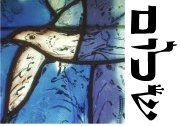
10.25.21 (Cheshvan 19, 5782) It is written in our Scriptures: "Do not be anxious about anything, but in everything by prayer and supplication with thanksgiving let your requests be made known to God" (Phil. 4:6). Note that the verb translated "be anxious" here (i.e.,μεριμνάω) comes from a root word (μερίζω) that means to be fragmented or divided into parts and pieces. Being anxious is therefore the uneasy state of being distracted, unfocused and divided within yourself. When we worry we heed voices of fear and begin to feel 'double-minded,' (i.e., δίψυχος), unstable, and unable to think clearly; we get restless and find it difficult to deeply breathe. We start to feel out of control, fearful that something bad will happen despite all our efforts or wishes to the contrary; we sense doom; we lose heart; we go dark... The Scripture here admonishes us to pray when we are tempted us to be anxious by focusing on something for which we are grateful. Doing so will instill the "peace of God" (שלום יהוה) that rises above all worldly thinking to keep watch over your heart and your thoughts through Yeshua the Messiah (Phil. 4:7). We gain the "light of life," that is, inner illumination from God, so that we can remain steadfast and unmovable in our faith, despite the temptation to look for relief from our struggles apart from God.
Hebrew Lesson:
Genesis 26:3 Hebrew Reading (click):
Seeing beyond the Seen...
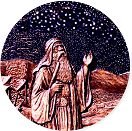
10.25.21 (Cheshvan 19, 5782) The reason many of us may be unhappy or discontented is because we tend to expect more from this life than we should... We assume that we are entitled to prosperity, good health, and happiness during our lives, and if we fail to attain these ends we get discouraged. The apostle Paul admonished us to think spiritually about the meaning and purpose of life, particularly in light of omnipresent suffering... He wrote that our "momentary affliction" (θλῖψις) - that is, the cares and troubles of this life - work within us to attain an "everlasting glory beyond all comparison," and therefore we should focus not on present circumstances but on the deeper purpose, promise, and providence of God (2 Cor. 4:17-18). The visible fades away, the spiritual endures; our mortification leads to everlasting life, and that which is hidden will be manifest...
But how do we learn to see what is invisible more vividly than that what we see with our eyes? Are we to deny or minimize all the suffering and pain we see and experience in this life, perhaps by regarding it as an illusion of some sort? Not at all. The problem of suffering is a real symptom of the deeper problem of death and decay. Gam zeh ya'avor: Everything is passing away; all is dust in the wind; "havel havelim" (vanity of vanities). Life in this world is "being unto death," a journey through the shadows of loss to inherit eternity. We are strangers here; nothing abides; there is no lasting prospect (1 Chron. 29:15). Instead of discounting suffering we acknowledge its pervasiveness: we realize that death is a real problem -- indeed it is the central problem of life -- and therefore we see through vanity, transience, loss and even grief to behold our need for divine healing, comfort, permanence, and eternal life. We are outsiders to this world; we are away from our true home, crying out for what we need most of all, namely the loving presence of our LORD.
מִי־לִי בַשָּׁמָיִם
וְעִמְּךָ לא־חָפַצְתִּי בָאָרֶץ
mee'-lee · va·sha·mah'·yeem
ve·ee·me·kha · loh-chah·fahtz'·tee · va·ah'·retz

"Whom have I in heaven but you?
And beside you I desire no one on earth."
(Psalm 73:25)

We must learn to find our sense of belonging and place within the heart of God. Striving to find our happiness in this life can entice us to lose ourselves in "olam ha'sheker" (עוֹלם השׁקר) -- the world of falsehood with its superficial satisfactions. Indeed, if we impatiently attempt to assuage our pain we may suffer further loss and our despair may grow deeper still, since our hunger for healing is an inner cry for healing love that only God can truly provide. Each soul is created with a radical sense of "aloneness," since - despite our closest relationships with other people - each of us comes into this world alone and will die alone... This sense of aloneness is a built in "hunger" for connection with God's presence. On the other hand, when we look to other things to meet our need for God, we invariably fall into the chaos and destruction of idolatry. To be healed from such counterfeit comfort we must "go through the wound" of our inner emptiness to find the divine consolation, and from there we will be given the heart to give of ourselves freely and without ambiguity.
Ah Lord, you have given me an incurable wound, a pain that refuses to leave my heart; for mee lee va'shamayim? "Whom have I in heaven but you?" And beside you there is nothing for me on this earth... I whisper to Your heart, "You are my Lord; I have no good apart from you," and yet I am bound in this place of lonely exile, pining away in grief... My heart cries, ad-anah Adonai, "How long, O Lord, forever?" Nevertheless I affirm: "My flesh and my heart may fail, but God is the strength of my heart and my portion forever." There is nothing I seek apart from your "with me" Presence, O beloved Savior; therefore be true to your love and bear my way through these trying hours... Amen.
Perseverance of Faith...
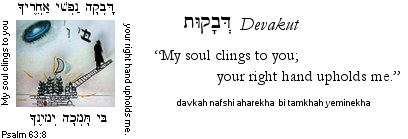
10.24.21 (Cheshvan 18, 5782) Faith perseveres in the way of life... "You who have clung to the LORD your God are all alive today" (Deut. 4:4). The Hebrew word devakut (דְּבָקוּת) means "cleaving" and refers to communion with God. This word comes from davak (דָּבַק), meaning to "cling" or "stick" (the Modern Hebrew word for "glue" is devek (דֶבֶק) which also comes from the same root, as does the Yiddish word "davka"). Devakut, then, implies being intimately connected with God in an earnest and passionate relationship.... The sages comment that we can cleave to God only one day at a time, since our future is conditioned upon this present day and its challenges. As Yeshua said: "Take therefore no thought for tomorrow: for tomorrow shall take thought for the things of itself. Sufficient for the day its own trouble" (Matt. 6:34). One day at a time. The LORD gives us daily bread (לֶחֶם חֻקֵּנוּ) so that we may persevere for this day; he "feeds us with hunger" to teach us to rely on alone him for true life (Deut. 8:3). "For he is our God, and the sheep of his hand today -- if you hear his voice" (Psalm 95:7). Today, if you hear his voice, do not harden your heart (Heb. 3:15). "Take care, brothers, lest there be in any of you an evil, unbelieving heart, leading you to fall away from the living God, but encourage one another every day, as long as it is called "today," so that none of you may be hardened by the deceitfulness of sin" (Heb. 3:12-13).
דבקה נפשׁי אחריך
בי תמכה ימינך
dah'·ve·kah · naf·shee · a·cha·rey'·kha
bee' · tahm·khah · ye·mee·ne'·kha

"My soul clings to you;
Your right hand upholds me." (Psalm 63:8)
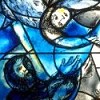
Hebrew Lesson:
Psalm 63:8 Hebrew Reading (click):
The Life of Sarah... חיי שרה
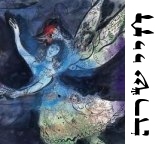
10.24.21 (Cheshvan 18, 5782) Our Torah reading for last week (i.e., Vayera) told how God was faithful to Abraham and Sarah by miraculously giving them a son (Isaac) in their old age. Nonetheless, Abraham faced his greatest test of all by being asked to offer up his promised child as a sacrifice on Mount Moriah, the place of the future Temple. On account of his willingness to obey, God promised He would multiply Abraham's offspring as the stars of heaven and that in his seed (singular) all the nations of the earth would be blessed.
This week's Torah portion is called Chayei Sarah (חיי שרה), the "life of Sarah," though it begins (paradoxically) with the account of her death, and tells how the first great matriarch of the Jewish people was buried in the Cave of Machpelah in Hebron, a burial site which Abraham had purchased from Ephron the Hittite (Gen. 23:1-20). Since the account of Sarah's death is given just after the account of the near-sacrifice of Isaac (i.e., the Akedah), some of the sages link the events together, suggesting that the shock of the near loss of her beloved son at the hand of her husband was just too much for her to bear...
Hebrew Lesson:
Genesis 23:1a Hebrew Reading (click):
After Sarah was buried in Hebron, Abraham sought a wife for his son by commissioning his faithful servant Eliezer (whom Abraham had once thought would be his heir), to go among his relatives living in Mesopotamia to seek a bride for Isaac. Eliezer (i.e., אֱלִיעֶזֶר, lit., "My God will help") then set out on the 550 mile journey to Haran (also called the City of Nahor and the place where Abraham's father died), taking ten camels laden with gifts in search of a suitable woman. In answer to his prayer, as soon as Eliezer reached the city of Nahor he encountered Abraham's grand niece Rebekah drawing water at a well, where she graciously provided water for him and for his ten camels, thereby confirming that she was God's choice for Isaac.
Awaken to the Spirit...

10.22.21 (Cheshvan 16, 5782) "You do not know what spirit you are of..." (Luke 9:55). Yeshua's words imply that each of us has the responsibility to know ourselves (γνῶθι σεαυτόν), and to learn to endure (and overcome) the natural motives and focus of our hearts. We discover the truth of our spiritual condition in the midst of our daily frustrations, as we experience conflict, opposition, and the inner groan that arises from pressure and disappointment. Spiritual growth means learning to transcend our negative reactions, to stop cursing our conflicts, and to awaken to the blessings that surround and pervade our way. God's grace enables us to open our eyes so that we may "choose life and live" (Deut. 30:19). Our daily struggle with sin reveals the contradiction between the ideals of our faith and the spontaneous reactions of our heart.... We live in between the "is" and the "ought," the real and the ideal (though often we deny one or the other). The impulse to despair, to be angry, to complain and curse our experience can be transformed into an opportunity to pray, to ask God for help, and to refocus on what is real. This is the "hidden blessing" (ברכת סוד) of our troubles. When we learn to surrender to God's Presence, we can breathe in his peace and love, despite the grief we encounter over ourselves and others. When we come to the light, and do not deny the truth about our condition, we can honestly ask the LORD for healing (Heb. 4:16). When we seek for the good - and even bless the struggle - we express our trust that God will use our sorrow to help us grow and to bring beauty from our ashes (2 Cor. 7:10). Hashivenu: "Turn us back to you, O LORD, and we shall be turned..."
הֲשִׁיבֵנוּ יְהוָה אֵלֶיךָ וְנָשׁוּבָה
חַדֵּשׁ יָמֵינוּ כְּקֶדֶם
ha·shee·vei·noo · Adonai · ei·ley'·kha · ve·nah·shoo'·vah
cha·desh · yah·mey'·noo · ke·ke'·dem

"Turn us back to you, O LORD, and we shall be turned;
renew our days as of old."
(Lam. 5:21)
Hebrew Study Card

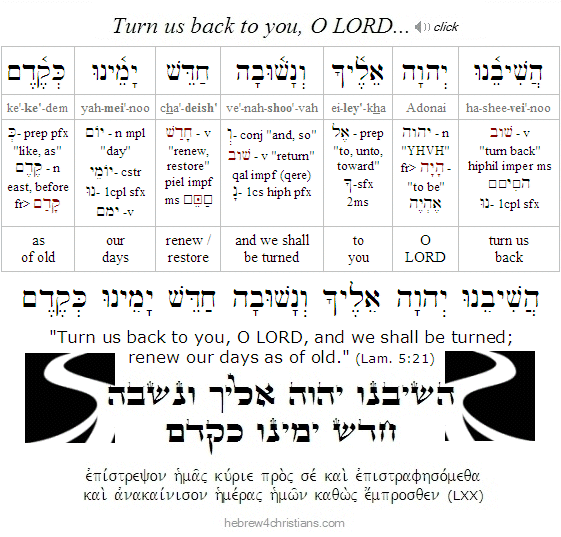
Again, our daily struggle with sin reveals the contradiction between the ideals of our faith and the spontaneous reactions of our heart. If we are able to find the courage, our failures and brokenness may be used by God to distill the intentions of the heart by helping us to be more honest with ourselves. We begin to realize that we are more vulnerable than at first we thought; that our faith is not as strong as we imagined, and that our motives are often mixed and unconscious. Illusions are striped away; idols crumble; deeper levels of selfishness are uncovered; the gap between our words and our deeds is exposed... It is one thing, after all, to intellectually think about faith or to idealize spirituality, but it is quite another to walk out faith in darkness. Yet it is only there, in the rawness of heart, that we discover what we really believe and how our faith makes traction with reality...
Keep the flame within your heart burning, friend... A sage once told a person struggling with his faith: "It is written that all creation was brought into being because of people like you. God saw there would be people who would cling to our holy faith, suffering greatly because confusion and doubt would plague them. God perceived that such would overcome these doubts and troubles of heart and remain strong in their belief. It was because of this that God brought forth all creation." Indeed, it was because of this that Yeshua our LORD suffered and died for you... Amen. Therefore never yield to despair, since that leads to further darkness and fear. Press on and keep fighting the "good fight" of faith (1 Tim. 6:12). Remember that you infinitely matter to heaven; your life has great value; you are significant and you are truly loved by our Heavenly Father. There is a "future and a hope" for you; there is "a white stone, and on that stone will be written a new name that no one can understand except the one who receives it" (Rev. 2:17). May "the trial of your faith, being much more precious than of gold that perishes, though it be tested with fire, be found to result in praise and glory and honor at the revelation to come" (1 Pet. 1:7).
"I am sure of this, that he who began a good work in you will bring it to completion (ἐπιτελέω) at the Day of Yeshua the Messiah" (Phil 1:6). The LORD is able to guard you (φυλάξαι) from stumbling and to present you blameless before the presence of His glory with great joy (Jude 1:24). "The LORD upholds all who are falling and raises up all who are bowed down" (Psalm 145:14). "He will sustain you to the end, guiltless in the Day of our Yeshua the Messiah" (1 Cor. 1:8). He who calls you is forever faithful; He will surely do it (1 Thess. 5:24). Yea, "the Lord is faithful (נֶאֱמָן הוּא): He will establish you and guard you against the evil one" (2 Thess. 3:3). The Spirit says, "Fear not, for I AM with you always."
Amen and Shabbat Shalom, chaverim...
Journey to Moriah...
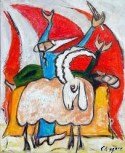
10.22.21 (Cheshvan 16, 5782) In our Torah portion for this week, parashat Vayera, we read the shocking account of how God tested Abraham by asking him to sacrifice his son Isaac as a burnt offering (Gen. 22:1-18). In Jewish tradition, this drama is called the "Akedah" (i.e., "binding"), which is regarded as the supreme test of Abraham's obedience and faith to God. Many of us are familiar with this great story, of course, though we can learn much if we take some time to reflect about the meaning of Abraham's ordeal, instead of skipping over the journey and "flying to the top of the mountain" to behold the happy ending.
The Torah's account of the test begins this way: "Now it came about after these things, that God tested Abraham, and said to him, "Abraham!" And he said, "Here I am." And he said, "Please take your son, your only son, whom you love, even Isaac, and go to the land of Moriah; and offer him there as a burnt offering on one of the mountains of which I will tell you" (Gen. 22:1-2). On the face of it, this dreadful request from God was mind-bendingly difficult to understand. Why would God ask Abraham for none other than his promised heir, the miracle child Isaac, to be literally sacrificed as a burnt offering? Was not Isaac specially chosen by God as the promised seed from whom all the nations would be blessed (Gen. 15:4-6)? It made no sense at all.... And why did God want the offering to be made in the "land of Moriah"? According to Rashi, the Hebrew word "Moriah" (מוֹרִיָּה) derives from the word "instruction" (הוֹרָאָה) and God (יהּ), suggesting the teaching of God, a synonym for Torah. According to the sages, Moriah But what sort of teaching is this, for Abraham to be asked to kill his beloved son?
It must have been a terribly sleepless night for Abraham as he agitated over God's request for him to do the unthinkable act of sacrificing his promised son Isaac. Nevertheless, he wasted no time preparing himself for the journey ahead. At sunrise the very next day he arose, woke two of his servants and Isaac, prepared his donkey, cut wood for the burnt offering, and immediately set off to the place (הַמָּקוֹם) where God told him to go (Gen. 22:3). We have no idea if Abraham had told his wife Sarah of his plans...
We must try to understand and feel the great anxiety and distress of Abraham's heart as he journeyed for three days, not knowing how to explain what he was doing to Isaac (or to his wife Sarah for that matter). There is terrible suspense in this story, not only in the cloud of unknowing surrounding the entire mission, but because the very thought of sacrificing his son, the sole heir of all that Abraham was promised, was the annihilation of all that he had believed, loved, and hoped. The starry sky of his vision counting the stars suddenly turned to black (Gen. 15:3). Abraham was later called the greatest of the patriarchs and "the father of the faithful," because he bore the burden of trusting God in the midst of a dreadful contradiction. How could Abraham understand the Lord (יהוה) as the sole Creator and sustainer of life, the sovereign King and righteous Judge, the one who led him from his homeland, the one who promised that he would be the father of a multitude of people, the covenant-making God who pledged land to his descendants after him into perpetuity; the one who said that Abraham would be "exceedingly fruitful" and from whom nations and kings would descend -- how could Abraham understand this LORD to be capable of asking him to go and sacrifice his son as a burnt offering? Was this not a complete shock to all his theology? A temptation? A demonic idea? Did it not threaten the meaning of his visions? Did not God promise him a future and a hope? Had not the LORD renamed him from "Abram" (exalted father) to "Abraham" (father of a multitude) to signify his promise to make his descendants as numerous as the stars in the sky and sand on the shoreline?
Was Abraham perhaps mistaken regarding the nature of the test before him? Why didn't Abraham argue with God (אֱלהִים) by remembering Him as the LORD (יְהוָה), the Compassionate Source of life? Earlier he had argued with God regarding the destruction of Sodom. So why didn't he argue to save his own son? Might this have been Abraham's test, namely, that God wanted Abraham to argue and to challenge the command to perform child sacrifice? Or why didn't he ask, "Why do you taunt me by giving me a son in my old age only to have him taken away?" Why didn't Abraham protest that his descendants could never inherit the Promised Land if his heir were killed? Indeed, how could Abraham have been in his right mind during this test? As Soren Kierkegaard reminds us in his book Fear and Trembling, this is yirat Elohim - the fear of God - taken to point of sheer madness. The temptation to elevate blind obedience to an arbitrary deity (אֱלהִים) above the dictates of compassion and conscience had to be overcome. Abraham's temptation, so to speak, was whether to listen to the voice of God (i.e., Elohim) or to heed the voice of the LORD (for more on this question see the article, "The Temptation of Grace").
On the other hand, perhaps the nature of the test was indeed whether Abraham would be willing to surrender his rationality (and sanity) to demonstrate his unconditional loyalty to God. If so, Abraham would need to "step outside" of his theology - his understanding of God - to yield in absolute trust in God's instruction to kill his son. He had to close his eyes to everything he assumed to be true in order to obey God's commandment....
Keep in mind that Abraham's trial was not a pretense or charade; he was not given any private assurances from God that he really wasn't going to have to kill his son... No, for reasons that were beyond his understanding God asked Abraham to slay Isaac, and he was therefore left alone with his resolve whether or not to obey God - even in this terrible darkness.... It didn't make sense - none of it did - and yet since God had asked, the test would be if he would obey. During the three day journey to Moriah, he was apparently silent. He could not explain the nature of his mission or its justification, even with Isaac.
"On the third day Abraham lifted up his eyes and saw the place from afar... And Abraham took the wood of the burnt offering and laid it on Isaac his son. And he took in his hand the fire and the knife. So they went both of them together" (Gen. 22:4,6). But Isaac wanted to make sure of what was happening. He needed to understand what was being asked of him. "So Isaac said to his father Abraham, "My father!" And he said, "Here am I, my son." And he said, "Behold, the fire and the wood, but where is the lamb for a burnt offering?" (Gen. 22:7). This is the first word of dialog recorded over the three day journey... It is hard to imagine the pathos during this exchange. Abraham replied ambiguously: "God will provide for himself the lamb for a burnt offering, my son." So they went both of them together" (Gen. 22:8).
As I've mentioned before, notice that Abraham's words could be understood as: "God will provide the lamb for the burnt offering -- my son!" (ירְאֶה־לּוֹ הַשֶּׂה לְעלָה בְּנִי) - making it plain that Isaac was himself to be offered upon the altar. According to midrash, upon hearing this, Isaac put his face between his hands and wept. "Is this the Torah about which you spoke to mother?" he sobbed. When Abraham heard this, he wept also. But Isaac controlled himself and sought to comfort his father: "Do not feel distressed, my father. Fulfill your Creator's will through me! May my blood be an atonement for the future Jewish people" (Bereshit Rabbah). The Torah then repeats the phrase, "and they both walked on together," indicating that Isaac had accepted his sacrificial death. He then steeled himself as he carried the wood that would be used to consume him upon the altar.
Isaac could have run away, of course. According to Jewish tradition, Isaac was a 37 year old man at the time who could have easily resisted his father's will, yet he chose to submit to his father. Therefore Isaac, as much as Abraham, underwent a great test - a passion of the heart to fully surrender to God (for more on this see "The Passion of Isaac").
The Torah's narrative continues: "When they came to the place of which God had told him, Abraham built the altar there and laid the wood in order and bound Isaac his son and laid him on the altar, on top of the wood" (Gen. 22:9). Here we are nearing the climax of the incredible drama. Abraham then built the altar on Moriah and "arranged the wood in order." The aged Abraham then "bound Isaac his son" (וַיַּעֲקד אֶת־יִצְחָק בְּנוֹ) and carefully laid him on the altar, "on top of the wood." Like the Suffering Servant who would come after him, Isaac "set his face like a flint" to fulfill God's will (Isa. 50:7).
Isaac kept his eyes directed toward heaven as he lay tightly bound and motionless upon the altar. He awaited the final blow and wanted it to fall with love and obedience within his heart. It was to be a shared sacrifice between the beloved son and his father. Finally "Abraham stretched out (שׁלח) his hand and took the knife to slaughter (i.e., לִשְׁחט, from shechitah) his son" (Gen. 22:10). It must have seemed like a timeless moment - outside the bounds of this world itself - as the knife was lifted up above his son, ready to be plunged into his heart. The midrash says that the two looked at each other, their eyes locked, during this climactic moment, yet they were unafraid at this point - their resolve was so complete that the sacrifice was essentially already done, and now all that remained was this final step... The Talmud says that when Abraham "stretched out" his hand, he briefly examined the knife to determine if it was ritually fit, and this delay was the precise moment when the Angel of the LORD (מַלְאַךְ יהוה) called to him from heaven and said, "Abraham, Abraham! Do not lay your hand on the boy or do anything to him, for now I know that you fear God, seeing you have not withheld your son, your only son, from me" (Gen. 22:11).
And behold Abraham's faith that "God would provide the lamb" was vindicated when he saw a ram caught in a thicket by its horns, which Abraham then took and offered up in his son's place. Abraham then called the altar at Moriah, the place of teaching, "Adonai Yireh" (יְהוָה יִרְאֶה), "the LORD will provide" (from re'eh, "see").
After this the Angel of the LORD pronounced God's oath of blessing upon Abraham: "By myself I have sworn, declares the LORD, because you have done this and have not withheld your son, your only son, I will surely bless you, and I will surely multiply your offspring as the stars of heaven and as the sand that is on the seashore. And your seed (זַרְעֲךָ) shall possess the gate of his enemies, and in your seed (זַרְעֲךָ) shall all the nations of the earth be blessed, because you have obeyed my voice" (Gen. 22:16-18). Note that the Apostle Paul refers to this passage by saying it does not say, "And to your seeds" (זְרָעֶיךָ) referring to many, but referring to one, "And to your seed" (זַרְעֲךָ) who is the Messiah (Gal. 3:16).
After receiving this consummate blessing from God, Abraham went to Beer-Sheva (בְּאֵר־שֶׁבַע), the "well of the sevenfold oath" where he had earlier planted an orchard, and there had called upon the LORD, the "Everlasting God" (אֵל עוֹלָם). Abraham then received news of the birth of a daughter, Rebekah, to his nephew Bethuel, the future bride of Isaac.
So that is my brief overview of the great test of faith given to Abraham and how he passed the test with God's blessing. Now apart from the great prophetic truth that God indeed would provide a lamb in the person of His own son - something Abraham also understood (see John 8:56) - what practical applications might we infer as children of Abraham?
Well perhaps the first lesson to apply is that we must trust in God even when we don't understand what is happening to us. When you do not know what you are doing, what you are suffering, or why things are the way they are, nevertheless take every thought captive and yield your will to the providential purposes of God. "Trust in the LORD with all your heart, and do not rely on your own understanding (ואל־בינתך אל־תשׁען); in all your ways know Him, and He will direct your paths (Prov. 3:5-6).
A second lesson is to ensure that we are regarding the LORD as our utmost concern, our highest good, our heart's greatest blessing. Yeshua taught that we must value our relationship with God above all else: "Whoever loves father or mother more than me is not worthy of me, and whoever loves son or daughter more than me is not worthy of me. And whoever does not take his cross and follow me is not worthy of me" (Matt. 10:37-38). In other words, we must love God more than anything else - including our most intimate relationships with others. Of course this doesn't mean that we should not genuinely love our families (and others), but we should rather die than deny our Savior. Indeed, should we be tempted to love someone or something more than our Lord, we must flee - whether that love be of another person, an apostle, or an angel from heaven. "God is love" does not mean "love is God," and in relation to matters of faith, when our passion is exalted as absolute, we must instead choose faith over our passion. Love is not God, for that is the idolatry of Cupid, after all, and therefore our love must be constrained by the truth of faith. That is the reason why we must at times judge others and turn away from them. For example, if a friend who claims to be a Christian denies that Yeshua was literally raised from the dead, being "tolerant" is forbidden, since it amounts to collusion with their apostasy. Likewise if someone says they follow Christ but live as fornicators, they are to be admonished, and if they do not repent, they are to be shunned (Eph. 5:3; Rom. 1:26-28; Matt. 18:15-17). Though the Scriptures indeed teach us to love the LORD with "all our heart, soul, and strength" (Deut. 6:4-5), it is ungodliness to love anything or anyone else in this way, or to allow another person to love you in this way as well. כי יהוה קנא שׁמו אל קנא הוא - "For the LORD, whose name is Jealous, is indeed a jealous God" (Exod. 34:14).
So the test of Abraham teaches that ought always trust God, no matter our circumstances, and we ought always obey God with every fiber of our being - with all our heart, soul, and strength. That is the example of Abraham, who is called the father of the faithful, who abandoned himself in unreserved love and obedience to God. Now in light of the remarkable faith and obedience of Abraham, is your heart filled with fear and trembling? Are you - who are "of little faith" - really so assured in your relationship with God that you can honestly say that you love the LORD with all your being, and at the expense of absolutely everything? Have you been tested "unto blood, striving against sin"?
"Trying" to love God won't take us too far, nor will doing good deeds. Something more is needed - something altogether beyond the power of the human will and its aspirations. The first step, then, is to confess your powerlessness, you inability to love God in the truth, and to ask God for the miracle of a new heart. The ability to love God is the result of a spiritual rebirth, not its cause. God chooses us and makes us come alive (John 1:12-13; 1 John 4:19).
Yeshua sets us free - he ransoms us from the prison of sin, that is, the inherent perversity of our fallen human heart, by means of the impartation of a new nature: " Therefore, if anyone is in Christ, he is a new creation. The old has passed away; behold, the new has come" (2 Cor. 5:17). God's intervention in our hearts delivers us from the cycle of sin and shame that "binds" us within. The ransom was paid at the cross of Yeshua, where the divine exchange took place: "For our sake he made him to be sin who knew no sin, so that in him we might become the righteousness of God" (2 Cor. 5:21). "For you know the grace of our Lord Jesus Christ, that though he was rich, yet for your sake he became poor, so that you by his poverty might become rich" (2 Cor. 8:9). The cross is the place of "Moriah" - where we are taught by God - as well as the place of "Yireh" - where God's provision for us is secured. It is the sacred center of existence, the place where God's truth and his mercy come together (Psalm 85:10). Perhaps a further lesson concerns the journey of faith that we are "bound" to take with the LORD. Notice that the phrase "go to the land of Moriah" uses the same verb that God used to call Abraham to leave his old life behind for the Promised Land (i.e., lekh-lekha: לֶךְ־לְךָ in Gen. 12:1). So the progression of faith is first to depart from the land of your origin (i.e., from the realm of the flesh, of natural human life), and then "go for yourself" to the place of atonement and substitutionary sacrifice (i.e., the realm of the spirit, of eternal life).
Jesus saves us from the place of torment - the hell of a life lived enslaved to sin and turned inward upon itself, forever and ever. It was not the nails driven into the arms and feet of Yeshua that kept him on the cross, but his great love to redeem us from the penalty for our sins. He has redeemed us from our cursed estate by being made a curse for us (Gal. 3:13). Again, the cross is the place where God's mercy and truth come together, and where righteousness and peace "kiss." Because of the cross God can be vindicated as both just (in his judgment against sin) and yet the justifier of the one who trusts in his provision for deliverance. Yeshua is our "Ram caught in the thicket" - the one who takes our place in death so that we receive the blessing of the divine life. Consequently, by the agency of the Holy Spirit, we are able to be a "living sacrifice" of praise to God, no longer conformed to this fallen world but transformed by God's indwelling power to live according to his will.
Abraham believed God and it was accounted to him as righteousness (Gen. 15:6), and he believed in the miracle of redemption and was given the oath of blessing. "Therefore those of faith are likewise the children of Abraham, as the Scripture, foreseeing that God would justify the Gentiles by faith, preached the gospel beforehand to Abraham, saying, "In you shall all the nations be blessed." So then, those who are of faith are blessed along with Abraham, the man of faith" (Gal. 3:7-9). Amen, and may the Living God, the Faithful One, grant us hearts that are faithful and true like our father Abraham, "who is the father of us all."
Hebrew Lesson:
Proverbs 3:5-6 Hebrew Reading (click):
The Work of Faith...
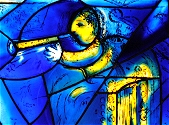
10.21.21 (Cheshvan 15, 5782) Our Torah for this week (Vayera) gives the account of the terrible test given to Abraham when God asked him to offer up his son as a sacrifice (see Gen. 22). The apostle James later said that Abraham was "justified by works when he offered his son Isaac upon the altar" (James 2:21), whereas the apostle Paul seemed to say just the opposite, that Abraham was not justified by works (see Rom. 4:1-3). So is there a contradiction here in our Bibles regarding the idea of "justification"? To answer this first understand that when James said that Abraham was justified "by works" he was referring to the work of faith and certainly not to the works of the law (מַעֲשֵׂי הַתּוֹרָה), since the Torah explicitly prohibited human sacrifice (Gen. 9:5), and furthermore the Angel of the LORD restrained Abraham's hand during the great test of faith (Gen. 22:12) thereby indicating that it was not God's will (i.e., Torah). On the other hand, the apostle Paul's seemingly contrary statement that Abraham was not justified by works refers to Abraham's unwavering trust in God's promise that his descendants would be as numerous as the stars in the heavens (Gen. 15:1-6). There is no real contradiction, then, since the two apostles were referring to two different historical episodes in their discussion of justification. Faith and works are two sides of the same coin: true faith will show up in your life and character. As Yeshua said, "This is the work of God, that you believe in the One whom He has sent" (John 6:29).
The life of faith is inherently paradoxical, as Kierkegaard noted: "Ethically speaking, what Abraham planned to do was to murder Isaac; religiously, however, he was willing to sacrifice Isaac. In this contradiction lies the very anguish that can indeed make anyone sleepless. And yet without that anguish Abraham is not the one he is. Neither would faith be what it is." Although Abraham understood that God must be obeyed, he also understood that human sacrifice was immoral, and hence his struggle represented the collision between the imperative of reason and the imperative of faith. Choosing to heed the voice of reason (i.e., the "ethical," the "universal") over the personal voice of God created a state of "fear and trembling" and a sense of being unable to communicate his passion and mission to others.
As Kierkegaard further commented: "Faith's conflict with the world is not a battle of thought with doubt, thought with thought. It is a battle of character. The person of faith is a person of character who does not insist upon comprehending everything. Now comes the conflict. The world insists that to believe what you cannot comprehend is not only blind obedience but obscurantism, stupidity, and so on. The world wants to alarm the believer against such foolishness. This is precisely why faith is a task for the person of character."
Hebrew Lesson:
Psalm 16:2 Hebrew Reading (click):
The Sacrificed Seed...

[ The following entry is related to this week's Torah reading, parashat Vayera.... ]
10.21.21 (Cheshvan 15, 5782) "And Abraham took the wood of the burnt offering and laid it on Isaac his son. And he took in his hand the fire and the knife. So they went both of them together" (Gen. 22:6). Isaac was about 37 years old at this time and needed to understand what was being asked of him: "And Isaac said to his father Abraham, "My father!" And he said, "Here am I, my son." And he said, "Behold, the fire and the wood, but where is the lamb for a burnt offering?" (Gen. 22:7). This is the first word of dialog recorded over the three day journey... It is hard to imagine Isaac's pathos during this exchange. Abraham replied, "God will provide for himself the lamb for a burnt offering, my son." So they went both of them together (Gen. 22:8). Notice that the Hebrew could be read: "God will provide for himself the lamb for the burnt offering -- my son!" (ירְאֶה־לּוֹ הַשֶּׂה לְעלָה בְּנִי) - making it plain that Isaac would be offered upon the altar. The Torah then repeats the phrase, "and they both walked on together," indicating that Isaac had accepted his sacrificial death in obedience to his father's will...
"And when they came to the place of which God had told him, Abraham built the altar there and laid the wood in order and bound Isaac his son (וַיַּעֲקד אֶת־יִצְחָק בְּנוֹ) and laid him on the altar, on top of the wood" (Gen. 22:9). According to the Talmud, Isaac asked his father to make the knots on his hands and feet tighter - not out of fear that he would change his mind and begin to resist - but in order to encourage his father to offer the sacrifice properly (Bereshit Rabbah 56:8). Like the Suffering Servant who would come after him, Isaac "set his face like a flint" to fulfill God's will (Isa. 50:7).
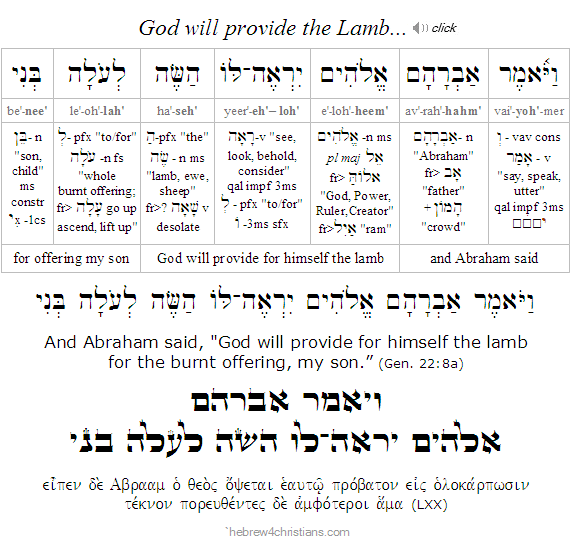 |
Isaac kept his eyes directed toward heaven as he lay tightly bound and motionless upon the altar. He awaited the final blow and wanted it to fall with trust and obedience within his heart. It was to be a shared sacrifice between the beloved son and his father. Finally "Abraham stretched out (שׁלח) his hand and took the knife to slaughter (i.e., לִשְׁחט, from shechitah) his son" (Gen. 22:10). The Talmud says that when Abraham "stretched out" his hand, he briefly looked at the knife to determine if it was ritually fit, and this delay was the precise moment when the Angel of the LORD (מַלְאַךְ יהוה) called out to him from heaven and said, "Abraham, Abraham!" (Gen. 22:11). (Note the repetition of the name "Abraham" during this second call.) According to various midrashim, when Abraham put his knife to his son's neck, Isaac's soul departed from him, but it returned when the Angel of the LORD said, "Do not lay your hand on the boy or do anything to him, for now I know that you fear God, seeing you have not withheld your son, your only son, from me" (Gen. 22:12). Abraham then immediately released Isaac and recited the blessing, "Blessed are You, LORD, who revives the dead" (בָּרוּךְ אַתָּה יהוה מְחַיֶּה הַמֵּתִים).
"I believe in You, O Holy One, though at times there no longer seems any reason for believing..." Here is Abraham, who counted the stars in hope, who trusted God for an heir, a promised son - and from this son another, and from that another, and another, until he envisioned his descendants "as the dust of earth" (Gen. 13:16; 15:5-6), and yet here is Abraham lifting up his knife to sacrifice his son, his beloved child, his promise, his future, his dream. Remember that Abraham did not know the end of the story before it began, and therefore his faith attested: "Though he slay me, I will trust in him."
Some people tend to "explain away" the passion of Abraham and Isaac by quoting the New Testament verse: "He [Abraham] considered that God was able even to raise him [Isaac] from the dead, from which, figuratively speaking, he did receive him back" (Heb. 11:19) -- as if this would make the sacrificial act any easier! Again we must bear in mind that neither Abraham nor Isaac knew "the end of the story" before they chose to obey God. As I've mentioned before, simply "knowing about" God is not the same thing as personally trusting Him with your life... This is the distinction between emunah (אֱמוּנָה) and bittachon (בִּטָּחוֹן). Simply knowing about God can lead to a sense of "distance," to theological abstractions, to dogmas and creedal formulas. Rabbi Bechaya put the distinction this way: "Everyone who trusts has faith, but not everyone with faith trusts." Bittachon is an intuitive awareness of the personal love of God for your life, coupled with complete trust that He cares for you (Rom. 8:28). It is an expectation that the love of God is for you, too, despite the test.
Note: For more on this crucial subject, see, "The Sacrificed Seed: Further thoughts about the Akedah," by clicking here.
Hidden Life in God...

10.21.21 (Cheshvan 15, 5782) It is said that the tzaddikim (righteous) are "doubly called" by God: "Abraham, Abraham" (Gen. 22:11), "Jacob, Jacob" (Gen. 46:2), "Moses, Moses" (Exod. 3:4), "Samuel, Samuel" (1 Sam. 3:10), "Saul, Saul" (Acts 9:4), and so on, because the LORD calls to both the soul in this world but also to the soul in heaven. When God told Abram to "get out of your land," he called him to focus on heavenly places – to find his identity there. "Seek ye first the kingdom of God..." (Matt. 6:33). Thus David says, "I shall walk before the LORD in the land of the living" (Psalm 116:9), which means all his deeds would be done for the sake of heaven. The earth then becomes the "land of the living," or "the land that I will show you," as Abram was told (Gen. 12:1). Likewise, followers of Yeshua no longer find their identity in this world but rather through their spiritual union with the resurrected LORD (Gal. 2:20; 6:14; Eph. 1:3; 2:6)... Therefore we are told to "seek the things that are above (τὰ ἄνω ζητεῖτε) where the Messiah is seated at the right hand of God; focus your thoughts on the things above - not on things here on earth - for you have died, and your life has been hidden (κέκρυπται) with Messiah in God. Then when the Messiah, who is your life, appears, you too will appear with him in glory" (Col. 3:1-4).
So have you heard the "upward call of God in Yeshua the Messiah" (Phil. 3:14)? This "upward call" (τῆς ἄνω κλήσεως) is the invitation from above, the sound of the heavenly Voice, beckoning you to enter the "high country" of the world to come. As Yeshua said, "I am from above (ἐγὼ ἐκ τῶν ἄνω)." Our true identity is not found in this world and its vain philosophy. The cross brings these things to an end, as we "cross over" from the realm of the dead to the realm of life (Gal. 6:14). Can you say: "I have been crucified with Messiah. It is no longer I who live, but Messiah who lives in me. And the life I now live in the flesh I live by faith in the Son of God, who loved me and gave himself for me" (Gal. 2:20)?
The great commandment is always Shema - listen - and heed God's Voice: "And your ears shall hear a word behind you, saying, "This is the way, walk in it," when you turn to the right or when you turn to the left (Isa. 30:21). At any given moment of our day, then, we can attune ourselves to hear the "upward call" and come "boldly before the Throne of Grace" (Heb. 4:16). The world knows nothing of this realm and is enslaved by appearances and the delusions of this realm, olam hazeh. As Yeshua said, "To you it has been given to know the mysteries of the kingdom of heaven, but to them it has not been given" (Matt. 13:11). The Spirit always says, "Come, my people, enter your chambers, and shut your doors behind you" (Isa. 26:20). The LORD beckons: "Call to me and I will answer you, and will tell you great and hidden things that you have not known" (Jer. 33:3). And I looked, and behold, a door standing open in heaven! And the first voice, which I had heard speaking to me like a trumpet, said, "Come up here, and I will show you..." (Rev 4:1). The repeated or "double call" of heaven is the voice of love. The Beloved calls out to the beloved: "Arise, my love, my beautiful one, and come away" (Song 2:10, 2:13).
Hebrew Lesson:
Psalm 116:9 Hebrew Reading (click):
The Hidden Palace...

10.20.21 (Cheshvan 14, 5782) The midrash says Abraham first encountered God by contemplating nature, likening it to a brilliantly lit palace that must have an owner. As he considered nature's wonder, a voice called out saying, "I am the owner of this palace..." The sages discuss the various preoccupations that commonly distract us from similarly detecting God's presence in nature for ourselves. Rabbi Shlomo asked, "God's greatness is inestimable; the entire cosmos is but a mustard seed when compared to him. How can so small a world block out so tremendous a God?" When we seek the truth of God, the eyes of faith will detect the "hidden palace," and everything around us will seem miraculous.
Hebrew Lesson:
Isaiah 6:3 Hebrew Reading (click):
"For his invisible attributes (τὰ γὰρ ἀόρατα αὐτοῦ), namely, his eternal power and divine nature, have been clearly perceived, ever since the creation of the world, in the things that have been made..." (Rom. 1:20). "For by him (King Messiah) all things were created, in heaven and on earth, visible and invisible, whether thrones or dominions or rulers or authorities -- all things were created through him and for him" (Col. 1:16). "To the King of the ages, immortal, invisible, the only God ( μόνῳ σοφῷ θεῷ), be honor and glory forever and ever" (1 Tim. 1:17). "He (Moses) endured as seeing him who is invisible" (Heb. 11:27). "We look not to the things that are seen but to the things that are unseen. For the things that are seen are transient, but the things that are unseen are eternal (2 Cor. 4:18).
Moses "endured as seeing Him who is invisible." It is this "as seeing Him" that is the essence of faith -- seeing God's hand and presence through the throes of temptation, stormy clouds, and darkness. Faith does not give the last word to despair.
Abraham and the Lamb...

[ The following entry is related to this week's Torah reading, parashat Vayera.... ]
10.20.21 (Cheshvan 14, 5782) The word "love" (אָהַב) first appears in the Scriptures regarding Abraham's passion for his son: "Take your son, your only son Isaac, whom you love, and go to the land of Moriah, and offer him there as a burnt offering on one of the mountains of which I shall tell you" (Gen. 22:2). After journeying to the place, Abraham bound Isaac, laid him upon an altar, and raised his knife to slay him. At the very last moment, the Angel of the Lord called out: "Abraham! Abraham! Do not lay your hand on the lad or do anything to him, for now I know that you fear God, seeing you have not withheld your son, your only son, from me" (Gen. 22:11-12). Abraham then "lifted up his eyes" and saw a ram "caught in a thicket" which he offered the place of his beloved son. Abraham named the altar Adonai-Yireh, "the LORD who provides" (Gen. 22:14). The sacrifice of the lamb for Isaac portrayed the sacrifice of Yeshua, the great 'Lamb of God' (שֵׂה הָאֱלהִים) who would offer up his life in exchange for the trusting sinner (John 1:29). Indeed the story of how God provided the lamb - both at Moriah and later during the Passover in Egypt - may be understood as the "Gospel according to Moses" (Luke 24:27; John 5:46).
Hebrew Lesson:
Genesis 22:8 Hebrew Reading (click):
Isaac not only pictures the sinner who trusts in God's sacrificial substitute, but also the One who offered himself in obedience to his heavenly Father. The Promised Seed illustrates how Yeshua "humbled himself by becoming obedient to the point of death, even death on a cross" (Phil. 2:7), and in that sense he is a type of Messiah. For instance, both Isaac and Yeshua were born miraculously; both were called "only begotten sons"; both were to be sacrificed by their fathers at Moriah; both experienced a "passion"; both willingly took up the means of his own execution; both were to be resurrected on the third day (Gen. 22:5, Heb. 11:17-19); and both demonstrate that one life can be sacrificed for another – the ram for Isaac, and Yeshua for all of mankind...
The first time the word "Torah" (תּוֹרָה) occurs in the Bible refers to the faith of Abraham (see Gen. 26:5), and the second time refers to the law of Passover: "There shall be one teaching (Torah) for the native and for the stranger" (Exod. 12:49). There is a link here. Abraham lived before the time of the Exodus, of course, and therefore he observed Passover by offering the lamb in place of his son (Gen. 26:5). Abraham revealed that the inner meaning of Torah is that the "righteous shall live by faith" (Hab. 2:4, Rom. 1:17) and that God justifies the sinner who trusts in him (Heb. 11:17-19; Rom. 4:5). During the Exodus from Egypt, Moses declared that the blood of the Passover lamb would be a "sign" of imputed righteousness secured by faith - with no "leaven," or human works, added. This is the "life-for-life" principle that underlies the sacrificial system of the Tabernacle revealed at Sinai as well. Ultimately all true Torah points to Yeshua, the Lamb of God (שֵׂה הָאֱלהִים), who died upon the cross for our offenses and was raised again for our justification (Rom. 4:25).
Hebrew Lesson:
John 1:29b Hebrew Reading (click):
Abraham trusted in God's provision: "God will provide for Himself the Lamb for the burnt offering, my son" (Gen. 22:8). The cross itself speaks to the question of "faith vs. works." At the time of the crucifixion of the Messiah, man was "shut out" because of the darkness and utter sanctity of the sacrifice of Yeshua as the Lamb of God who bore all the sins of the world... At the time of utmost darkness, man was on the "other side of the cloud," put into a "deep sleep" not unlike what Abraham had earlier experienced at the covenant of the parts (Gen. 15:12). Every human being stood helplessly on the other side of the cross; no one else participated to make us right with God: It was all Yeshua and the Father, and the Father and Yeshua alone... In that inner sanctum, that holy of holies, shammah! atonement was made.
Father of the faithful...

[ The following entry is related to this week's Torah reading, parashat Vayera.... ]
10.20.21 (Cheshvan 14, 5782) Abraham is the "father of all who believe" in the miracle of the Promised Seed (הזרע הבטיח), that is, in the Coming Deliver who would bring redemption and healing to the whole world (see Gal. 3:16; Rom. 4:1-5:1). The Torah states that God chose Abraham because he would faithfully teach his children to guard "the way of the LORD" (דֶּרֶךְ יְהוָה), by trusting in God's acts of "righteousness and justice" (צְדָקָה וּמִשְׁפָּט) that He would perform according to his promise (Gen. 18:19). God regarded Abraham as faithful to retain His promise, and therefore He would manifest salvation (יְשׁוּעָה) through his descendants. The "way of the LORD" refers to Yeshua, "the way and the truth and the life" (הַדֶּרֶךְ וְהָאֱמֶת וְהַחַיִּים), the Promised Seed that would crush the head of the serpent in the battle for our redemption. Abraham's faith was directed toward the Deliverer to come, as Yeshua said: "Abraham rejoiced to see my day; and he saw it and was glad" (John 8:56). Likewise we guard the way of the LORD as our father Abraham did – by trusting in God's promises given to us in Yeshua our Messiah.
We are chosen to embody the same heart, vision, and mission of Yeshua our LORD, to exist as "extensions of his presence" in this world, and therefore we are also called to walk uprightly, as he walked... Indeed, the Hebrew word derekh (דֶּרֶךְ), usually translated as "way," metaphorically refers to the journey, manner, or course of your life. Because God is tov v'yashar (good and upright), he teaches his children to be yesharim (יְשָׁרִים), i.e., those who walk uprightly. Indeed, the way of the LORD (דֶּרֶךְ יהוה) is "to do acts of charity and justice" (לַעֲשׂוֹת צְדָקָה וּמִשְׁפָּט) (Gen. 18:19). This is the "straight way" (derekh ha-yashar), or the "narrow path" that leads to life (Matt. 7:14).
Hebrew Lesson:
Psalm 25:8 Hebrew Reading (click):
Note that the verbal clause "he will teach" (i.e., יוֹרֶה) used in this verse comes from the root yarah (ירה) -- the same root used in the word Torah (תּוֹרָה). Because the LORD is good and upright, He gives us Torah (direction) for our lives. God educates us for eternity by imparting to us moral and spiritual truth. As King David taught, "Happy is the man who delights in the Torah of the LORD and meditates upon it day and night" (Psalm 1:1-2).
Confession of our Hope...
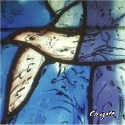
10.19.21 (Cheshvan 13, 5782) It is written: "Faith is the foundation (i.e., ὑπόστασις: the "substance," reality, being, etc.) of hope, the conviction of the unseen... Without faith it is impossible to please God, for whoever would draw near must believe that God exists and rewards (μισθαποδότης) those who seek him" (Heb. 11:1,6). Note that God is pleased when we seek his presence, that is, when we look past the ephemera and ambiguity of the phenomenal world for the truth about spiritual reality. For our part, faith depends on confession. We must say that we believe, and affirm it with all our heart (Rom. 10:9), as it says, "I will make Your faithfulness known with my mouth" (Psalm 89:2). When you encounter tribulation, or experience some crisis of faith, reaffirm aloud: "I believe in God's promise..." Physically expressing your faith is itself an act of faith, and this encourages your soul to trust in God's healing reward even in the present struggle or darkness.
One of the more difficult tests of faith is learning to "endure yourself" as your inner character is being transformed by the mercy of God... To do so, you must receive the miracle of life in Yeshua (1 John 5:12). Again you must look beyond the realm of appearance, where the "outward man" perishes, to the realm of ultimate healing, where the "inward man" is finally liberated from the ravages of sin and death. This is the comfort we have in our affliction: God's promise revives our hearts to say, "I know that my Redeemer lives, and at the last he will stand upon the earth" (Job 19:25). Even in the "shadow of the valley of death" (i.e., this moribund and broken world), the LORD is with us and comforts us with His Presence (Psalm 23:4). We are given this great promise: "Just as we have borne the image of the man of dust, we shall also bear the image of the man of heaven" (1 Cor. 15:49).
Dear Lord, in the worst of our moments, thank you for seeing the Savior within us; thank you for heeding the groaning of hope that your Spirit of compassion imparts.... "When my heart was embittered, when I was pierced in heart, I was brutish and ignorant; I was like a beast toward you. Nevertheless, I am always with you; You hold my right hand" (Psalm 73:21-23). Despite this lament, however, the psalmist affirmed that he was always with God - notwithstanding his ignorance, his complaint of heart, his doubts, fears, and so on... God is not driven away by our pain and confusion, but on the contrary, he takes us by the hand and will not let go: "It was I who taught Ephraim to walk; I took them up by their arms, but they did not know that I healed them" (Hos. 11:3).
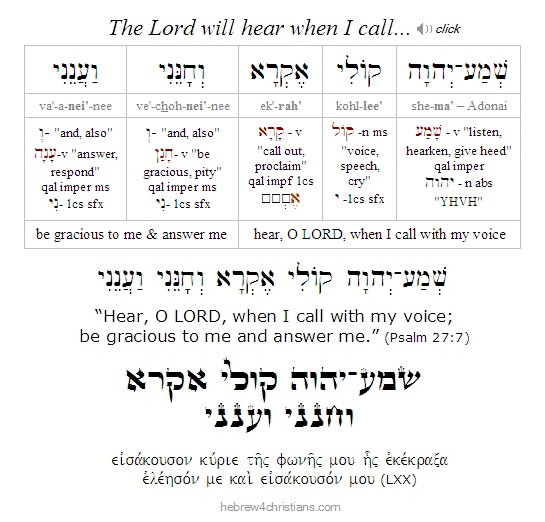 |
Of course it's not always easy to wait for God, especially when we are in pain or anxiety, but we must never, ever, give up; we must never ever, abandon our heart's longing for ultimate healing. Therefore the Spirit cries out: come alive and trust in the promise of God; receive the heavenly gift. Ve'yesh tikvah le'acharitekh (וְיֵשׁ־תִּקְוָה לְאַחֲרִיתֵךְ): "There is hope for your future," declares the LORD (Jer. 31:17). "Blessed are you, LORD our God, King of the universe, who makes us prisoners of hope" (אֲסִירֵי הַתִּקְוָה). Friends, Let us hold fast the confession of our hope without wavering, for he who promised is faithful" (Heb. 10:23).
Personal note: Our kids have been sick lately, Judah especially. We took him to a clinic for some tests. We also have been experiencing some difficult trials recently, and I have been feeling depressed the last week or so. Thank you for praying for us. - John
Narrow Gate of Despair...

10.19.21 (Cheshvan 13, 5782) There is a great danger today of fearing the wrong things, and despairing over that which trivial in light of eternity. However true despair is a gift from God, if it is received as a message to take heed of what is most important. "And this is the simple truth - that to live is to feel oneself lost. He who accepts it has already begun to find himself, to be on firm ground. Instinctively, as do the shipwrecked, he will look around for something to which to cling, and that tragic, ruthless glance, absolutely sincere, because it is a question of his salvation, will cause him to bring order into the chaos of his life. These are the only genuine ideas; the ideas of the shipwrecked. All the rest is rhetoric, posturing, farce" (Kierkegaard). Like Jonah we first must be "swallowed up" in consciousness of our own hopelessness before we realize that we are without remedy apart from God's intervention and deliverance. We start there - in the "belly of the fish" - and later are brought forth by God's mercy and grace. This is the place of the cross, the "narrow gate" that leads to life. As we look to Yeshua, as we lean on him, he reveals more of himself to us.
Hebrew Lesson:
Psalm 86:13 Hebrew Reading (click):
Hillel the Elder had said, "If I am not for myself then who will be for me? (אם אין אני לי מי לי); But if I am only for myself, what am I? And if not now, when?" (Avot 1:14). Hillel points out here that the language of "I am" (אָנִי) and "for me" (לִי) reveals that we have a relationship with ourselves that must be sanctified and ordered before God. As Soren Kierkegaard once wrote: "The self is a relation which relates itself to its own self," that is, the self is always in a state of dialog. A healed self relates itself to God as the Ground of existence, since otherwise irremediable despair will result, eternal lostness within, an everlasting sickness of soul... The remedy for being a lost self, relating only to itself without any center or ground, is to turn to God and to find your place in God's love and blessing. As we come to believe that we are accepted and loved despite our many imperfections, inadequacies, and character defects, we find courage to accept ourselves, to "let go" and relax. As Yeshua said, "whoever does not receive the kingdom of God like a child shall not enter it" (Luke 18:17).
God's Way of Deliverance...

10.18.21 (Cheshvan 12, 5782) From our Torah portion this week (i.e., Vayera) we read, "Escape for your life. Do not look back..." (Gen. 19:17). You must turn away from what once defined you and never look back... This includes not only turning away from your former sins, but turning away from the guilt and shame of your sins... Living in the past, wallowing in your sin and regretting your mistakes, can cause you to feel worthless and even hopeless. If you feel compelled to revisit your former life, then be sure to do so before the foot of the cross, in light and presence of God's redemptive love for you. You can't change the past, but you can leave it behind by turning it over to God for healing. Teshuvah (repentance) means accepting who you are in light of God's love and salvation for your soul. "Brothers and sisters, I do not consider myself to have attained this, though I am single-minded: I forget the things that are behind and reach out for the things that are ahead ... heeding the upward call of God in Yeshua our Messiah" (Phil. 3:13-14). May you "find yourself in Him, not having a righteousness of your own that comes from the law, but that which comes through faith in Messiah, the righteousness from God that depends on faith" (Phil. 3:9).
God's way of deliverance is entirely different than man's way. Man tries to suppress the flesh, to cover it up, to justify its failings, or to enlist its power in the battle against sin (i.e., religion), but God's way is to remove the flesh from the equation. The goal is not to make us stronger and stronger, but rather weaker and weaker, until the flesh is "crucified" and only the sufficiency of the Messiah remains. Then we can truly say, "I have been crucified with Messiah. It is no longer I who live, but the Messiah who lives in me. And the life I now live in the flesh I live by faith in the Son of God, who loved me and gave himself for me" (Gal 2:20). The word "Hebrew" (עִבְרִי) means one who has "crossed over" (עָבַר) to the other side, as our father Abraham did (Gen. 14:13). It is on the other side of the cross that we experience the very power that created the universe "out of nothing" (i.e., yesh me'ayin: יֵשׁ מֵאַיִן) and that raised Yeshua the Messiah from the dead.
Hebrew Lesson:
Psalm 51:10 Hebrew Reading (click):
Seeing by Faith...
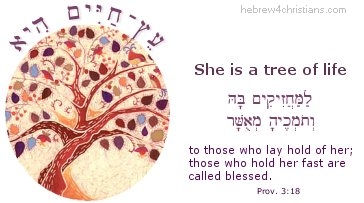
10.18.21 (Cheshvan 12, 5782) "And the LORD appeared (וַיֵּרָא) to Abram and said, "To your offspring I will give this land" (Gen. 12:7). Note that this was the first time God actually appeared to Abram, since earlier he had only "heard" God say to him, "Go from your country and your kindred and your father's house to the land that I will show you" (Gen. 12:1). In other words, it was only later - after Abram had obeyed God's voice by making the move to Canaan - that the LORD appeared to him and an altar was established (Gen. 12:7-8). As long as he remained with his father Terach in the City of Haran (the last outpost of Mesopotamia), he was in a place of delay, unable to behold the Divine Presence. Abram first had to act on what he knew before he was given confirmation by God (John 13:17). Perhaps that is why the very first place Abram came to in the promised land was the "Oak of Moreh" (אֵלוֹן מוֹרֶה), or the "Teaching Tree." Abram was taught to believe in order to understand, not to understand in order to believe....
Notice, however, that Abram was immediately tested once he arrived in the promised land. After building another altar and calling upon the name of the LORD (Gen. 12:8), a severe famine tempted him to look for food in the land of Egypt. After leaving the land of promise, Abram willingly forfeited his identity (i.e., he denied he was Sarai's husband) and found himself powerless as his wife was abducted into Pharaoh's harem. The LORD intervened on his behalf, however, and plagued Pharaoh and his household with great plagues, which surely prefigured the future time of the great Exodus during the time of Moses...
In this connection we further note that the next time the Torah states that the LORD appeared to Abram was after he had returned from Egypt, after rescuing Lot from the kings of the east, when he encountered the mysterious Malki-Tzedek (מַלְכִּי־צֶדֶק) in Salem. After this dramatic encounter, Abram separated his clan from his nephew Lot and returned to the first altar he built in the promised land (Gen. 13:4).
Hebrew Lesson:
Proverbs 3:18 Hebrew Reading (click):
God Provides the Lamb... (פרשת וירא)

10.17.21 (Cheshvan 11, 5782) Our Torah reading for this week (Vayera) is very dramatic and extraordinarily prophetic. Among other things it includes what I have called the "Gospel according to Moses," or rather Moses' account of how Abraham was tested by God to offer his "only begotten son" (בֵּן יָחִיד) Isaac as a sacrifice on Mount Moriah -- the place of the future Temple. This famous story is referred to as the Akedah (עֲקֵדָה), or Akedat Yitzchak (עֲקֵידָת יִצְחָק) - the "binding of Isaac" (Gen. 22:1-18). At the very last moment, the Angel of the LORD stopped Abraham from going through with the sacrifice and provided a ram as a substitute. Abraham then named the location Adonai-Yireh (יהוה יִרְאֶה), "the LORD will provide/see" (from the 3ms imperfect of the verb ra'ah (רָאָה), "to see"). The binding of Isaac perfectly illustrates both the principle of sacrificial love and the principle that we must first unreservedly believe in that love in order to understand the ways of the LORD.
Those who believe in Yeshua understand the Akedah as a foreshadowing of the ultimate sacrifice the heavenly Father would give on our behalf. Unlike Abraham, God the Father actually offered His only begotten Son (בֵּן יָחִיד) at Moriah in order to make salvation available for all who will believe (John 3:16-18; 1 John 4:9). As Abraham himself confessed: אֱלהִים יִרְאֶה־לּוֹ הַשֶּׂה / Elohim yireh-lo haseh ("God will provide for himself the lamb").
אֱלהִים יִרְאֶה־לּוֹ הַשֶּׂה לְעלָה בְּנִי
e·lo·heem · yeer·eh-lo · ha·seh · le·o·lah · be·nee

"God will provide for himself the lamb for the burnt offering, my son."
(Gen. 22:8)
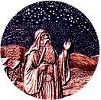
Hebrew Lesson:
Genesis 22:8a reading (click):
As I've mentioned over the years, the very first occurrence of the word love in the Scriptures (i.e., ahavah: אַהֲבָה) refers to Abraham's love for his "only" son who was to be sacrificed as a burnt offering on Moriah (the very place of the crucifixion of Yeshua), a clear reference to the gospel message (Gen. 22:2; John 3:16). Some scholars have noted that the word ahavah comes from a two-letter root (הב) with Aleph (א) as a modifier. The root means "to give" and the Aleph indicates agency: "I" give (i.e., the Father gives). Love is essentially an act of sacrificial giving... The quintessential passage of Scripture regarding love (αγαπη) in the life of a Christian is found 1 Corinthians 13: "Love seeks not its own..."
Whereas the Akedat Yitzchak foreshadowed God's provision for the coming Temple, the Akedat Yeshua (i.e., the crucifixion of Yeshua at Moriah) was the altar where the justice and chesed (love) of the Father fully met (Psalm 85:10). For more on this incredibly rich subject, please see the articles, "The Passion of Isaac" and "The Sacrificed Seed."
Hebrew Lesson:
Genesis 18:1a reading (click):
Knowing yourself in Him...
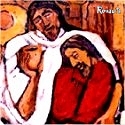
10.15.21 (Cheshvan 9, 5782) It is vital to affirm your identity as a beloved child of God... Nothing is more important than how you understand the Lord's personal esteem for you. You may not always feel the connection, but you must choose it regardless of your present emotional state, because your place in God's heart is a matter of truth, not sentimentality. Who you really are is grounded in the faithfulness and power of the LORD God of Israel.
After all, the Lord God loved you before you were born (Jer. 1:5; 31:3); he knit you together in your mother's womb (Psalm 139:13-16); he gives you life from above and adopts you as his own child (John 1:12; Rom. 8:15); he knows the number of the hairs on your head and every thought and word of your heart (Matt. 10:30; 12:26; Psalm 139:4); he directs every step of your journey through this life (Psalm 37:23; 139:3; 23; Prov. 16:9); he foresaw you when he offered up his very life in redemption for your healing (1 Cor. 15:3; 2 Cor. 5:21; Gal. 1:4; 1 Pet. 2:24; 2 Cor. 5:18); you are briah chadashah, a new creation (2 Cor. 5:17; Gal. 6:15); you are always welcome in his presence (Eph. 1:6; Heb. 4:16); he will never leave you nor forsake you (Heb. 13:5); he prepares a place for you in the world to come (Jer. 29:11; John 14:1-3); and one day he will wipe away every tear from your eyes (Rev. 7:17; 21:4).
When you are tempted to feel badly about yourself, then, take a worthy moment to reaffirm who God says you are. Don't allow your past to hold you in exile; don't give place to shame; know yourself only in relation to God's love for your soul. Whenever you feel hurt, angry, fearful, or rejected, turn inwardly to God and center yourself in his presence; realize that such negative feelings do not define what is most real about you. Bacharta ba'chayim: "Choose life!" Turn now to God; reaffirm that you are his beloved child, and thank him for the blessing of your redeemed life. Amen. Shabbat Shalom, chaverim!
Hebrew Lesson:
Jeremiah 31:3b Hebrew Reading (click):
Sanctified by Grace...
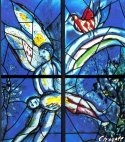
10.15.21 (Cheshvan 9, 5782) Yeshua said: "I am the vine; you are the branches. Whoever lives in me and I in him, he it is that bears much fruit, for apart from me you can do nothing" (John 15:5). We cannot create the new birth by means of moral reformation, since the divine life is a miracle from above and not the result of human agency or aspiration (John 1:13; John 3:6). If we "live in" Yeshua we will bear fruit - our spiritual connection or "union" with him is sufficient for every good work - and only fruit that derives from the life of Messiah will abide (1 John 2:17). Good works are a necessary consequence of regeneration in Messiah, but by themselves they are insufficient and something more is needed (Matt. 7:21-23). Therefore the Scriptures point to the salvation of God and his grace as the efficient cause for the miracle of newness of life: "Not by works of righteousness which we have done, but according to his mercy he saved us..." (Titus 3:5); "for by grace are you saved through faith, and that not of yourselves (τοῦτο οὐκ ἐξ ὑμῶν), it is the gift of God" (Eph. 2:8); "so if it is by grace, it is no longer on the basis of works; otherwise grace would no longer be grace" (Rom. 11:6).
Grace and human effort are mutually exclusive when it comes to life from above: "It is the Spirit that gives life (τὸ πνεῦμά ἐστιν τὸ ζῳοποιοῦν); the flesh (i.e., human nature) is no help at all" (John 6:63). There is a new "center" of identity within the heart: "I is no longer I who live..." (Gal. 2:19-20). We do not appeal to God for mercy based on our best efforts, but like father Abraham we believe that God brings life to the dead. In short we believe that "salvation is of the LORD" (יְשׁוּעָתָה לַיהוָה), that is, that God justifies the ungodly and performs the inner work of salvation on our behalf and for our healing (see Rom. 4:1-5:2). As C.S. Lewis once said in this connection: "The Christian is in a different position from other people who are trying to be good. They hope, by being good, to please God if there is one; or -- if they think there is not -- at least they hope to deserve approval from good men. But the Christian thinks any good he does comes from the Christ-life inside him. He does not think God will love us because we are good, but that God will make us good because He loves us; just as the roof of a greenhouse does not attract the sun because it is bright, but becomes bright because the sun shines on it" (Mere Christianity). However we must not confuse cause and effect. The work of God is to believe in Yeshua (John 6:29) and we then learn to "work out" what God has "worked in" to our hearts by faith, as it says, "work out your own salvation with fear and trembling, for it is God who works in you, both to will and to work for his good pleasure" (Phil. 2:12-13). God who has performed a good work in you will "confirm you to the end blameless in the Day of our Messiah Yeshua" (1 Cor. 1:8; Jude 1:24-25).
יהוה תשׁפת שׁלום לנו
כי גם כל־מעשׂינו פעלת לנו
Adonai · teesh·poht · shah·lom · lah'·noo
kee · gam · kol-ma·a·sei'·noo · pah·al'·ta · lah'·noo

"O LORD, you will ordain peace for us,
for you have indeed done for us all our works." (Isa. 26:12)

Hebrew Lesson:
Isaiah 26:12 Hebrew Reading (click):
Meeting at Moriah...
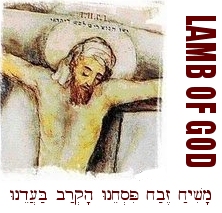
[ The following entry is related to this week's Torah reading, parashat Lekh-Lekha.... ]
10.15.21 (Cheshvan 9, 5782) The phrase "lekh-lekha" (לֶךְ־לְךָ) is used in two places in the Torah: first, when God asked Abraham to leave everything behind to go (lekh-lekha) to a land where he would become a great nation that would ultimately bless the world (Gen. 12:1-3); and second, when God later asked Abraham to go (lekh-lekha) to the land of Moriah to offer up his beloved son as a burnt offering sacrifice (Gen. 22:2). There is a connection.
In the first case note that after Abraham left his homeland God led him to land of Canaan, directly to a "teaching tree" (אֵלוֹן מוֹרֶה) in Shechem (see Gen. 12:6). Some have said this "teaching tree" symbolizes the wisdom of Torah, the tree of life (עֵץ־הַחַיִּים) that brings happiness to those who take hold of it (Prov. 3:18), though it also symbolizes the cross of Yeshua, as we shall see.
In the second case note that "Moriah" (מֹּרִיָּה) means either the "Awe of the LORD" (i.e., מוֹרָא + יָהּ), the "Vision of the LORD" (i.e., רָאָה + יָהּ), or the "Teaching of the LORD" (i.e., מוֹרֶה + יָהּ) regarding the cross, or "the tree of atonement" (עֵץ־הַכַּפָּרָה), given in Yeshua our Messiah (the site of the Temple in Jerusalem was also called Moriah; see 2 Chron. 3:1). The Akedah, or the offering of Isaac, exemplified the meaning of sacrificial love, and indeed the word "love" (i.e., ahavah: אַהֲבָה) is first used in the Torah in this connection (Gen. 22:2). The offering of the lamb that God provided in exchange of Isaac (Gen. 22:13) pictures Yeshua the Passover Lamb of God (שֵׂה הָאֱלֹהִים) who was offered by the Father for the healing and deliverance of the world. And just as Isaac pictured the surrender of the son to the will of his father, so Abraham's willingness to give up his beloved son (בְּנוֹ יְחִידוֹ) reveals the passion of the Father's heart to give up everything for the sake of our salvation (John 3:16). So "lekh-lekha" - go for yourself - and receive the love of God given in Yeshua!
Hebrew Lesson:
Genesis 22:2 Hebrew Reading (click):
Every Prayer Answered...

10.15.21 (Cheshvan 9, 5782) If you have earnestly prayed but are tempted to think that God is not responding, remind yourself that every prayer uttered to God from a heart that trusts in His redemptive love given in Messiah, is indeed answered, and not a syllable goes unheeded or will be lost before heaven (Psalm 145:18; Matt. 7:7; Matt. 21:22). Just as we earnestly believe that justice will eventually be manifest and all wrongs fully redressed at the bar of Eternal Judgment -- so we understand that every utterance of the heart of faith finds compassionate response from the heart of heaven. Indeed the essence of teshuvah (return, "repentance") is heartfelt prayer, and therefore when we bring honest words and turn back to accept the truth, God's mercy and compassion are decisively evoked (1 John 1:9). The most important thing is not to lose faith, however, but to believe that God hears you and will indeed answer the cry of your heart. Decide to believe and settle your expectation. Never give up hope. God is faithful; He will do it (1 Thess. 5:24).
King David asked for God's direct and miraculous intervention to heal his soul: "Cause me to me hear your lovingkindness in the morning, for in You do I trust. Cause me to know the way I should go, for I lift up my soul to you" (Psalm 143:8). David's request was that he would be empowered to hear God's loving voice calling to his heart at the start the day, to be assured of God's kindness and favor. Note that the Hebrew verbs used in this verse are both hiphal imperatives, implying that God is the agent or cause of the action. We lift up our heart in expectation, understanding that the LORD alone is the One who is able to draw us near to Him: "You [God] cause me to hear... You [God] cause me to know..."
Hebrew Lesson:
Psalm 143:8 Hebrew Reading (click):
Teshuvah of Abraham...

10.15.21 (Cheshvan 9, 5782) I had mentioned that "lekh-lekha" (לך־לך) can be understood as a command to "come to yourself," that is, to turn and reconnect to your spiritual essence, though it can also be understood as a command to "go out of yourself," that is, to escape from the bondage of your carnal ego... This corresponds to teaching in the New Testament where we are commanded to both "put on" our new spiritual identity as God's beloved, and to "put off" the old self by being revived in our minds (Eph. 4:22-24). Both "movements" are the heart are necessary: we must turn to the Lord and receive his blessing (inward), and we must turn away from what has previously defined us (outward). We die to ourselves and come back to life; we cross out the old and walk in the new...
The Jewish philosopher Emanuel Levinas said that the reason it is hard to "go out of yourself" has to do with an overwhelming sense of inertia that collapses into passivity of the soul. We get "comfortably numb" and resist waking up. When the heart miraculously becomes "elected," however, as when Abraham heard and believed God's promise, it comes alive before the Divine Presence, and by extension, it is empowered to go out of itself in blessing others. The process of sanctification puts away the old self that is lost within itself by consciously turning to spiritual reality and truth.
There has to be a starting point, however, a "conversion" of the heart that marks the transition from old to new. Abraham is our model. He did not simply make a journey away from home that eventually circled back to what he knew before - the security and history that had defined him. No, his break from his former life was radical and changed his direction forever. It was a "crossing over" into newness of life. Beyond the dimension of the physical world, Abraham's journey was one of inner transformation, and therefore it was a journey into the unknown. He was made a "stranger" and a sojourner in this world. Unlike the Aristotelian view that sees an "end" or telos (purpose) embedded within natural processes, God revealed to Abraham the glory of the transcendental world, incalculable in its beauty, depth, goodness, and holiness. Being "elected" or "chosen" by God is to bear witness of the sanctity of life by "forgetting what lies behind and straining forward to what lies ahead," striving to attain the high calling of God in the Messiah.
Hebrew Lesson:
Psalm 4:3 Hebrew Reading (click):
Remains of the Day...

10.14.21 (Cheshvan 8, 5782) Our life in this world will end far sooner than we expect, and then what will become of us? I am not here thinking of the end of "the" world, but rather the end of your world - when you will die and face the light of eternity. Today, this moment, you are on the way, going someplace; your "latter days" are already come... If you are not prepared today, how will you be better prepared tomorrow? Today is the day of salvation, the hour that matters most (Psalm 95:7; Heb. 3:13). Learn to die to the world now, to let go of what presently holds you captive, so that you are free to meet that which forever shall come. Don't put off genuine teshuvah: turn while there is still time (Eph. 5:15-16). And may God give us mercy to say from the heart: "For me to live is Messiah, and to die is gain" (Phil. 1:21).
As philosopher Blaise Pascal (1623-1662) once wisely observed: "Let each of us examine his thoughts; he will find them wholly concerned with the past or the future. We almost never think of the present, and if we do think of it, it is only to see what light is throws on our plans for the future. The present is never our end. The past and the present are our means, the future alone our end. Thus we never actually live, but hope to live, and since we are always planning how to be happy, it is inevitable that we should never be so" (Pensees). Amen, may God help us "remember the future" and live in the light of his great promises! Shalom chaverim.
למנות ימינו כן הודע
ונבא לבב חכמה
leem·noht · ya·mei'·noo · ken · ho·da'
ve·nah·vee · le·vav · chokh·mah
"Teach us to number our days aright
and we shall attain a hearts of wisdom."
(Psalm 90:12)
Hebrew Study Card

Hebrew Lesson:
Psalm 90:12 Hebrew Reading (click):
Abiding in Him...

10.14.21 (Cheshvan 8, 5782) Yeshua used the allegory of a vine and its branches to illustrate how we are to be spiritually connected to Him: "I am the true Vine, and you are the branches," he said (John 15:1-6). The purpose of the branch is to be a conduit of the life of the vine. We derive our identity, life and strength from being made part of Yeshua's life, His vision, and His purposes... In Hebrew, this idea is called devakut (דְּבָקוּת) which means "cleaving" to God bekhol-levavkha (בְּכָל־לְבָבְךָ), "with all your heart," and bekhol-nafshekha (בְּכָל־נַפְשְׁךָ), "with all your soul," and bekhol-me'odekha (בְּכָל־מְאדֶךָ), "with all your being..." Cleaving to God is the essence of the great commandment to love the Lord given in the Shema. We are able to so cleave to God in Yeshua because God does a miracle and gives us lev chadash, a new heart to serve Him. We love Him because He first loved us (1 John 4:19). Whether Yeshua is living in you (and you are living in Him) is the most important question of your life upon which everything else ultimately depends. He appeals to each heart of faith: "Live in me, and I will live in you" (John 15:4).
Hebrew Lesson:
John 15:5 Hebrew reading (click):
For more see the article: "The Torah of the Vine: Living the Divine Connection..."
Parable of the Sower...

10.14.21 (Cheshvan 8, 5782) In the famous "Parable of the Sower," Yeshua told a crowd of people a simple story about a farmer who planted some seed. In ancient times, planting crops was done by hand, and seeds would be thrown, or "broadcast" about a field. This was called "sowing" seed. In Yeshua's story, as the farmer sowed his seed, some fell by "the way side," on the outer edges of the field, but the birds swept down and ate them up. Other seed fell on "stony ground," and while the seeds quickly sprouted, they soon withered because they had no depth to withstand the scorching heat of the sun. Still other seed fell among "thorny patches," but the thorns choked out the sprouts so they also yielded no fruit. Finally some seed fell on good soil which produced abundant fruit... Yeshua ended his story by asking the crowd to ponder what he said, "The one who has ears to hear, let him hear!"
Now on the surface this seems to be a very simple story, relating a commonplace event that happened regularly in the agrarian culture of ancient Israel. A farmer sows seed in his field, and while some of the seed doesn't take because of bad soil conditions, other seed produces abundant fruit... So what was the point? Surely Yeshua was not offering up trite observations regarding farming practices, so what was he trying to say to his audience?
The disciples seemed a bit confused as well, so they later approached Yeshua to ask what he was talking about (Mark 4:10). In response Yeshua said that they - the ones who were seeking what he meant - would be given the ability to know the "mystery of the kingdom of God" (τὸ μυστήριον τῆς βασιλείας τοῦ θεοῦ), but the onlookers from "the way side" would not: "So that seeing they may "see" - but not perceive; and hearing they may "hear" - but not understand, unless they should turn and be forgiven" (Mark 4:12).
Wow, now wait a minute. Is Yeshua saying that he taught in parables to deliberately obscure the truth, and even to produce blindness and deafness in others? No, of course that is not the heart of our Savior who came to save lost souls and deliver them from perdition. On the other hand, however, Yeshua tested people to reveal what was hidden within their own hearts, and therefore the parables served to reveal the heart condition of people, particularly of those who rejected him (Isa. 6:10; Isa. 44:18; Psalm 81:12).
Yeshua then went on to "decode" the parable for his disciples, explaining that the sower represents God in Messiah; the "seed" represents the message of the gospel, and the different types of ground (or soil) represent different conditions of the heart. Yeshua is using the story to describe how different types of people respond to his teaching. For example, those on "the way side" are decidedly closed off to the message of the kingdom, perhaps alluding to the Pharisees and other religious leaders. These people "hear" the message only as an occasion for demonic and unreasoning rejection of it. Nothing gets through their hidebound prejudice and therefore the message is lost upon them. Those on "stony ground," on the other hand, seem to receive the message with gladness, but they have no depth or "root in themselves" (ῥίζαν ἐν ἑαυτοῖς), and therefore they quickly become offended when they are tested. Perhaps they failed to soberly count the cost of discipleship and in their discouragement they abandoned their hope....
Those preoccupied with pleasures - or cares - live in "thorny places" and consequently they become thwarted in their growth. Looking for love in all the wrong places, such people are unable to detach from their dramas, feeling trapped and victimized by their difficult circumstances. And while they may "hear the word" on occasion, its message is squelched and disregarded because they are consumed with other matters which they consider to be even more important than the welfare of their eternal souls. Their disordered love is tragic...
Finally, those who are of "good ground" receive the message with joy and desire, and by means of their love of the truth retain it, even in times of adversity, and so they yield crops some thirty, some sixty, and some a hundredfold of what was originally sown. They are known by their fruit. "A heart soft and tender, stirred to its depths on the great things of eternity, and jealously guarded from worldly engrossments, such only is the "honest and good heart" (Luke 8:15), which "keeps," that is, "retains" the seed of the word, and bears fruit just in proportion as it is such a heart" (Robert Jamieson).
Yeshua was the master teacher, of course, and he often used "indirect communication" as a way of helping people understand their need for healing. When he spoke in riddles and parables to the crowd, he allowed himself to be misunderstood, maligned, and derided so that their judgment of him would bring about revelation of themselves. People projected their prejudices on him; they ascribed ulterior motives to his message; they interpreted his words according to their own biases and desires. Their responses revealed the "ground" of their being. Were they demonically hardened because of their fears? Were they superficially engaged for the sake of appearances? Were they idolatrously self-concerned and anxious over the affairs of their daily life? Or were they of "honest and good heart," truly willing to surrender to the truth of God and to be transformed by it?
Though his great love moved him to plead with people to turn to him to find life (Matt. 11:28-29, Luke 5:31-32; John 3:1-21; John 7:37; Luke 13:34-35, etc.), Yeshua's teaching style allowed for people to make up their own minds and to be responsible for what they choose. Though he came to "seek and to save sinners," he never forced the decision to believe in him for healing life, but trusted in the moving of the Spirit in their lives (John 6:33, John 6:44). Paradoxically, the lost "see but do not perceive" and they "hear but do not understand," until they are converted and their sins are forgiven, at which time they indeed perceive and understand and know the truth that sets them free. Amen.
Hebrew Lesson:
Psalm 78:2 Hebrew reading with commentary (click):
For more on this subject, see "Parables and Revelation."
Escape from Egypt...
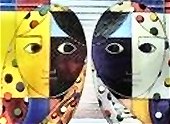
[ The following entry is related to this week's Torah reading, parashat Lekh-Lekha.... ]
10.13.21 (Cheshvan 7, 5782) Some time after entering the promised land, Abram's faith was tested: "Now there was a famine in the land, and Abram went down to Egypt to sojourn there..." (Gen. 12:10). The sages say that Abram stumbled by leaving the land, and that he should have trusted that the LORD would provide for him despite the apparent lack of food. Indeed during his time in Egypt Abram lost sight of God, lied about Sarai, compromised his values, and was passive as his wife was abducted into Pharaoh's harem. The situation got so bad that the LORD God finally intervened by sending "great plagues" upon Pharaoh and his household to rescue the family from their captivity (Gen. 12:17). Because of these plagues, Pharaoh urged Abram to to make an "exodus" from the land, and Abram left with wealth acquired there (including Hagar, a daughter of Pharaoh). Humbled by his lapse of faith, Abram then returned to the altar he built near Bethel and there called upon the LORD (Gen. 12:10-13:4). Note the parallels here with the later deliverance from Egypt under Moses. Indeed, during the "dark vision" Abram had at the "covenant of the parts" ritual, he foresaw that his experience with Pharaoh would be revisited in the lives of his children (Gen. 15:12-18). Even a great tzaddik like Abram had to learn obedience, as indeed did Messiah himself: "Although he was a son, he learned obedience through what he suffered" to become our great High Priest (Heb. 5:8-10). "Out of Egypt have I called my son..."
Abram's carnal excursion to Egypt resulted in the addition of Hagar to the family, and through her role as a "surrogate mother," to the advent of Abram's son Ishmael. Later the Apostle Paul associated the descendants of Hagar as "children of the flesh" in contrast to the descendants of Sarah who are "children of the promise." Ishmael's conception was "natural," i.e., was "of the flesh" and the result of human intervention and calculation; Isaac's conception, on the other hand, was supernatural and the result of God's direct intervention and design. Paul interprets these historical events in allegorical terms. The two mothers "represent" two distinct covenants: Hagar (the daughter of Pharaoh) represents the covenant made at Sinai that results in "children born for slavery," whereas Sarah represents the covenant made earlier based on divine promise that results in freeborn children (Gal. 4:24-27). Mount Sinai is in the barren wilderness -- the starting point of a nation that was once enslaved in Egypt; but Mount Zion/Jerusalem (representing the fulfilled promise) is in the "land flowing with milk and honey" -- the end point of a nation that was divinely chosen. Mount Sinai is ultimately barren, but Mount Zion is "the perfection of beauty" (Psalm 50:2) that bears innumerable children (Isa. 54:1).
Hebrew Lesson:
Psalm 50:2 reading (click):
For more on this subject, see "The Allegory of Hagar and Sarah."
The Journey of Faith...

10.13.21 (Cheshvan 7, 5782) Each of us has been created by God for a sacred purpose. There is a deep reason why you were born. This explains why we sometimes feel lost and alone in this life. Our discontent, the fracture we sense both within and around us, our sorrows, suffering, and inevitable losses, all of it together, presents a "message" to our souls, a "basso profundo" groan of the heart, a visceral yearning for healing, for eternal life, for heaven... God has created us for himself, yet we find no lasting peace apart from him (Eccl. 3:11). Or as Augustine of Hippo famously put it: "Thou hast made us for thyself, O Lord, and our heart is restless until it finds its rest in thee" (Confessions). Therefore our Lord cries out to those who are hurting, troubled, and afraid: "Come to me, all who labor and are heavy laden, and I will give you rest. Take my yoke upon you, and learn from me, for I am gentle and lowly in heart, and you will find rest for your souls" (Matt. 11:28-29).
Our Torah portion for this week is called "Lekh-Lekha," which can be translated as "come to yourself," that is, turn and reconnect to your spiritual essence, your identity, your heart. We have to start the journey there, because ultimate reality is intensely personal, being grounded in the "who-ness" of God. It is within the consciousness of our own "I am," our deepest identity as a personal, thinking, and feeling being, that we are able to relate to the person and heart of the great "I AM" of the LORD.
Abram is an exemplar of faith for us; he is called the "father of faith" (Isa. 51:1-2; Rom. 4:16; Gal. 3:29). Abram courageously searched for God in his emptiness, and God graciously answered the cry of his heart. He left everything behind as he journeyed into the realm of promise - regarding himself as someone chosen to know God's blessing and grace. Abram was able to walk by faith because he stopped listening to the voices of the ego - the worldly and unbelieving parts of himself - and therefore was able to hear God's truth.
According to the sages, Abram was tested ten times in the course of his life. In the first test, Abraham was asked to "go to a land that I will show you" only to find it a place of famine and trouble. In the last of the tests, Abraham was asked to "go to the land of Moriah, to the place that I will show you," and there to offer up his promised son Isaac as a burnt offering... In each case the temptation was to give up hope in God's promise, since at the time of each test Abram did not know the outcome as a foregone conclusion. Nevertheless Abram walked in faith, in fear and trembling, yet fear contextualized by the deeper strength found in God's love and presence. Abraham had to close his eyes to this world and walk in the darkness of faith to see the divine light that transcends this realm; he had to "believe to see" that God's promise was sure.
So the journey is one of faith and the inner transformation that comes from trusting in God (בִּטָּחוֹן). "Go from your country and your kindred and your father's house to the land that I will show you" is the call of teshuvah - turning away from enslaving habits that deaden our consciousness - and to come alive by believing that which transcends own understanding. The Greek word for repentance, "metanoia" (μετάνοια) describes the process well, since it means going beyond ("meta") the habitual categories of the mind ("nous") to believe and apprehend the miracle of God. Faith discerns the unseen good that is at work behind the realm of appearances. God is the "Father of Lights" who supervises the ebb and flow of creation. He is always working to direct all things according to his purposes and will. This is the "land that I will show you," that is, the realm of blessing and eternal life.
Hebrew Lesson:
Proverbs 4:18 (click):
Righteousness of Heart...
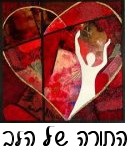
10.12.21 (Cheshvan 6, 5782) From our Torah reading for this week (Lekh-Lekha) we learn about the resolute faith of Abram who, despite his old age, trusted that God would make his descendants as numerous as the stars in the night sky: "And the LORD brought him outside and said, "Look toward heaven and count the stars, if you are able to number them." Then the LORD said to him, "So shall your offspring be. And he trusted in the LORD, and He regarded it to him as righteousness" (Gen. 15:6).
Abram "staggered not" at the promise of God, and therefore God imputed to him righteousness (צְדָקָה), a term understood here to be divine esteem and grace. After all, what could Abram do in the face of seeming impossibility? There was nothing he could do to bring about the miracle. The New Testament comments: "He did not weaken in faith when he considered his own body, which was as good as dead (since he was about a hundred years old), or when he considered the barrenness of Sarah's womb" (Rom. 4:19). It was in a state of utter powerlessness and complete helplessness that Abram retained hope and thereby received the promise by faith. "For he was beyond hope, yet in hope he trusted that he would indeed become a father to many nations, in keeping with what he had been promised, 'so shall your offspring be'" (Rom. 4:18).
Understand that 400 years before the law was given at Sinai, the LORD regarded the faith of Abram as the heart of the righteousness later prescribed by the Torah. Therefore the very First Commandment of the Ten Commandments is simply: Anochi Adonai Elohekha (אָנכִי יְהוָה אֱלהֶיךָ): "I AM the LORD your God" (Exod. 20:2), which repeats the call to trust God before everything else, since it is complete surrender to the love and grace of God that justifies us, as it is written: "to the one who does not work but trusts in the One who justifies the ungodly (i.e. the helpless), his faith is counted as righteousness" (Rom. 4:5).
Where the LORD says "Look toward heaven and count the stars, if you are able to number them," we note the Hebrew word "count" (סָפַר) may also mean "recount," "interpret," or "explain"... This is the same word used in the famous verse, "The heavens declare (מְסַפְּרִים) the glory of God" (Psalm 19:1). The idea here would be not merely that Abram would have lots of descendants, but they would shine in brilliance against the backdrop of the darkness. Abram's children would be lights upon the earth, declaring the truth of God and enlightening the darkness of mankind. "And those who are wise shall shine like the brightness of the sky above; and those who turn many to righteousness, like the stars forever and ever" (Dan. 12:3). In the same way, "let your light shine before others, so that they may see your good works and give glory to your Father who is in heaven" (Matt. 5:16; 13:43).
Hebrew Lesson:
Genesis 15:6 (click):
Remade by Grace...

10.12.21 (Cheshvan 6, 5782) "See to it that no one fails to obtain the grace of God; that no root of bitterness springs up and causes trouble, and by it many become defiled; that no one is immoral or profane like Esau, who sold his birthright for a single meal. For you know that afterward, when he desired to inherit the blessing, he was rejected, for he found no chance to repent, though he sought it (the blessing) with tears" (Heb. 12:15-17; Gen. 27:38). "For my people have committed two evils: they have forsaken Me, the fountain of living waters (מְקוֹר מַיִם חַיִּים), and hewed out cisterns for themselves, broken cisterns that can hold no water" (Jer. 2:13). Spiritually speaking, there are two basic sorts of breaking. One is to be broken by the inevitable sin and ruin of this world, and the other is to be made lev-nishbar (לֵב־נִשְׁבָּר), a broken heart, before the LORD. The former breaking comes from the vain attempt to find life in the broken vessels of this world, and "repentance" is expressed as remorse over perceived temporal loss. This sorrow eventually leads the soul to death (2 Cor. 7:10). To be inwardly broken, on the other hand, requires mourning over your life and returning to God for deliverance (Matt. 5:4). In hunger and thirst for God's righteousness the soul finds eternal satisfaction, since God alone provides the vessel of "living water" we need to live (John 4:14; 7:38). We all must drink from God's fountain of life (מְקוֹר חַיִּים), lest we suffer spiritual dehydration and death....
Are you haunted by an inner ache for love, joy, peace, and life? "Blessed are those who hunger and thirst for righteousness, for they shall be satisfied" (Matt. 5:6). Our inner poverty and need is a disguised grace; our desire for healing reveals the Spirit's invitation. Faith begins with the recognition of our need, since only then will we come to Yeshua for the "Bread of Life" (לֶחֶם הַחַיִּים) and the "Living Water" (מַיִם חַיִּים). Everything we need is found in him, though we must reach out in faith: "For without faith (אֱמוּנָה) it is impossible to please him, for whoever would draw near to God must believe that he exists, and that he rewards those who seek him" (Heb. 11:6). God rewards those who seek him; he answers the heart's cry; he responds to all who trust in his love and salvation. Therefore "ask, and it will be given to you; seek, and you will find; knock, and it will be opened to you. For everyone who asks receives, and the one who seeks finds, and to the one who knocks it will be opened" (Matt. 7:7-8). We are not saved by faith in our own faith, but in the Reality and Power of the LORD God who alone can raise the dead to new life....
Hebrew Lesson:
1 Chron. 16:11 reading (click):
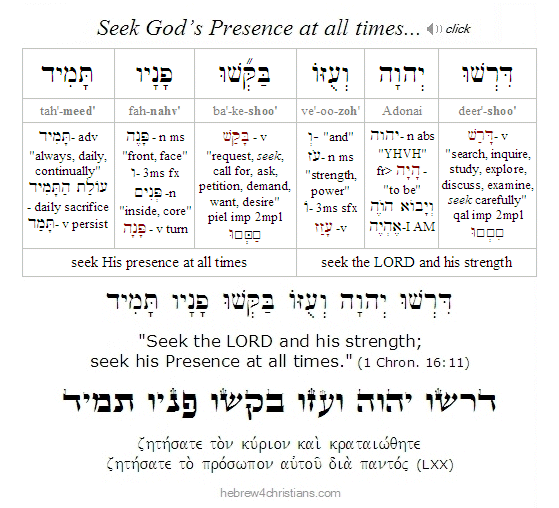 |
Faith and Fear...
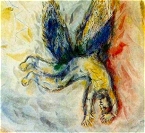
10.12.21 (Cheshvan 6, 5782) "And now abide faith, hope, love: these three" (1 Cor. 13:13). The opposite of faith is fear; of hope, despair; and of love, indifference. Fear is the "default mode" of the soul that dwells in darkness. This is because the "fallen" soul regards the empirical world and its flux as ultimately real -- and therefore "sees in order to believe." The life of faith, on the other hand, looks beyond the realm of appearances to behold an abiding glory -- and therefore "believes in order to see." How we choose to see is ultimately a spiritual decision for which we are each responsible....
In the geo-political world there are more seemingly good reasons to be afraid today than in any time since the rise of Nazi Germany in the 1930s. Every day the media indoctrinates people about the threats of various plagues (e.g., H5N1, H1N1, SARS), of economic disasters, of terrorist plots, and so on. In short, living within a "culture of fear" (with its ongoing propaganda campaigns from both the right and left wing perspectives) is to traffic in images and sound bites, inducing a sense of dread and anxiety (as someone once said, "FEAR" is "False Education Appearing Real"). Just as a lie-detector can physiologically sense when people are telling lies, so our souls can sense when we are believing them... There is no neutral ground here, no "transcendent" place of the soul where we can rise above the realm of truth claims: We will either be set free by the truth or else we will live in fear. As Yeshua said, the "Truth shall set you free" (האמת תשחרר אותך).
The temptation to yield to fear is omnipresent, and therefore we must focus on what is real rather than illusory... The test of our faith is of more value to the LORD than our material or emotional comfort, however, and therefore we will all experience tribulation of various kinds. This is the way we obtain heart (i.e., courage). If living without fear were easy, it would be of little spiritual worth, but since it requires all of our heart, soul, mind, and strength, it is therefore considered precious. It requires, in short, an infinite (and divinely given) passion. And it is part of God's plan for us to be "in but not of" the world system, to be alienated, to be misunderstood, to be persecuted... We are called to "take up the cross" and die daily. Following Yeshua means sacrificing ourselves along the way.
Ultimately fear distills to the fear of death, or rather, of "the one who has the power of death, namely the devil" (Heb. 2:14-15). If we come to peace with our own finitude, our own mortality, and our eventual end in the Messiah, death has no more power over us. Perhaps this is part of the reason why Christian faith is so hated in communist countries or in other places of absolutist secular ideologies. If you are delivered from the greatest threat that man can menace over you, you are free to be a voice crying in the wilderness. The life of truth is something the humanist and atheist can never comprehend.
Fear is the antithesis of faith, though living without fear is certainly not easy. After all, how do we naturally choose to be unafraid of what we in fact fear? Is this power within our conscious control? Only by a miracle are we set free from fear... Indeed, true faith working within the heart is one of the greatest miracles of God. May it please God to impart to each us real courage that comes from Heaven itself... Amen.
Hebrew Lesson:
Psalm 31:24 reading (click):
The Meaning of "Hebrew"...

[ The following entry is related to this week's Torah reading, parashat Lekh-Lekha.... ]
10.11.21 (Cheshvan 5, 5782) In parashat Lekh Lekha Abram is called ha-ivri (הָעִבְרִי) - "the Hebrew," a term that means "one who has crossed over" (עָבַר) from another place. Rashi literally identifies this "other place" as Ur Kasdim (אוּר כַּשְׂדִים), located east of the Euphrates River, though the midrash (Genesis Rabbah) spiritually identifies it as the realm of idolatry: "The whole world stood on one side, but Abram crossed over to the other." Abram separated himself from a world steeped in idolatry and polytheism by worshiping One God who is the sole Creator of all things.... Understood in this way, being "Hebrew" means being regarded as an "other," a "stranger," or an "outsider" to idolatrous worldly culture.
Various midrashim tell the story about how Abram came to understand the truth that there is only one God who is Creator of all. For instance, when he was born, Abram's mother hid him in a cave. She was afraid that the evil king Nimrod would kill her son because prophets had warned that he would triumph over Nimrod. Guarded by the angel Gabriel, young Abram first worshiped the stars as gods until they were obscured by the Sun. Then he declared that the Sun was god until it set and the Moon took its place. Clouds then covered the Moon, showing Abram that the Moon was not a god either. At last, Abram understood that there was one supreme God would ruled over all the forces of the universe. (Later, after the danger had passed, young Abram rejoined his family.)
A midrash relates that Abram's father Terach sold idols for a living in the city of Haran. But Abram had long since realized that idol worship was foolishness. One day when he was asked to watch his father's store, Abram took a hammer and smashed all the idols - except for the largest one. His father came home and demanded to know what happened. Abram explained that the idols all got into a fight and the biggest idol won. When his father objected that this was impossible, Abram said, "Aha! So you agree with me that idols are powerless! My father, there is only one true God, and this God cannot be shaped with human hands..." Terach was angry but understood that his son had discovered the great truth of ethical monotheism.
Lekh lekha (לך־לך) literally means "go for yourself" (lit. "walk [הָלַךְ] for yourself [לְךָ]"). Rashi states that it means "Go for your own benefit," though the Chassidic teachers interpret it as "Go to yourself" (i.e., begin your own journey back to God). At any rate, it's clear that the phrase is an invitation by God to venture ahead -- to go forth in faith... Go forth and risk everything for the sake of God's promise.
"Go forth ... I will show you" (Gen. 12:1). Note that the LORD spoke to Abram and invited him to forsake his ancestral homeland for the promise of God. But note further that it was only after Abram made the long journey to the unknown land of Canaan that God appeared to him to him by the oaks of Mamre saying, "To your offspring I will give this land" (Gen. 18:1). Abram did not believe the promise because he saw God; he was only able to see God after he had walked in faith. First Abram heard the message, and later -- after he acted on his faith -- was he enabled to see more... מַעֲשֵׂה אֲבוֹת סִימָן לַבָּנִים / ma'aseh avot siman labanim: "The deeds of the fathers are signs for the children." The pattern is therefore given: First Abram heard the message, and later - after he acted on his faith - was he enabled to see more. This is the deeper meaning of being "Hebrew," one who crosses over from the realm of the dead to the realm of the Living God...
 |
As a matter of textual gematria, regarding the promise to make Abraham's name great (Gen. 12:2), the sages note that the total number of Hebrew letters in the names of the three patriarchs Abraham (אברהם), Isaac (יצחק), and Jacob (יעקב) is 13. Likewise the total number of letters in the names of the three matriarchs Sarah (שׁרה), Rebecca (רבקה), Leah (לאה), and Rachel (רחל) is 13. Furthermore 13 is the numeric value for the word echad (אחד), a word that means "unity" and represents the 13 attributes of God's Mercy (Exod. 34:6-7). The combined letters of the patriarchs and matriarchs therefore totals 26, the same numeric value (in gematria) as that for the Name of God (i.e., YHVH: יהוה).
Hebrew Lesson:
Psalm 27:13 reading (click):
Crossing Over to Life...

[ The following is related to this week's Torah reading, parashat Lekh-Lekha... ]
10.11.21 (Cheshvan 5, 5782) Our Torah portion this week begins: "Now the LORD said to Abram, "Go (לֶךְ־לְךָ) from your country and your kindred and your father's house to the land I will show you" (Gen. 12:1). The Book of Hebrews comments, "By faith Abraham obeyed when he was called to go out to a place that he was to receive as an inheritance, and he went out, καὶ ἐξῆλθεν μὴ ἐπιστάμενος ποῦ ἔρχεται - "not knowing where he was going" ... for he was looking forward to the city that has foundations, whose designer and builder is God" (Heb. 11:8,10). Abraham closed his eyes to this world and was given the inner light of truth that would reveal his way to God. The Sefat Emet says that every person of faith is likewise commanded daily to "lekh-lekha," to "go for yourself" by crossing over from the world and its deadening habits to live as an exile with God. Paradoxically, we find ourselves when we lose ourselves - when we leave behind the labels, roles, and identities this world foists upon us and instead resolve to seek the promise of God's Kingdom. As Yeshua said, "For whoever will save his life shall lose it, but whoever will lose his life for my sake shall find it" (Matt. 16:25).
Hebrew Lesson:
Psalm 25:12 reading (click):
Note: In a sefer Torah (i.e., a handwritten Torah scroll), Hebrew words are written without vowels, so "lekh lekha" (לך־לך), often translated as "go forth," could be read as "go, go!" - emphasizing the importance of the mitzvah: Get moving! Start walking! Begin your journey!
Parashat Lekh-Lekha...

10.10.21 (Cheshvan 4, 5782) Shavuah tov, chaverim! Last week's Torah portion (i.e., parashat Noach) introduced us to Abram (אַבְרָם), the descendant of Noah's son Shem, who was the great-grandson of the patriarch Methuselah - a man who who personally knew Adam and Eve and upheld the original promise of redemption given in the Garden of Eden. Just as there were ten generations from Adam to Noah, so there were also ten generations from Noah to Abram (see Gen. 11:10-32). And just as Noah became the father of 70 nations, so Abram (through Shem) would become the father of the Jewish people, through whom the Promised Seed - the Messiah and Savior of the world - would eventually come.
In our Torah portion for this week (Lekh-Lekha), we read that Abram was 75 years old, married to (his half-sister) Sarai, and guardian of his nephew Lot (his deceased brother Haran's son) when he received the promise of divine inheritance: "And the LORD said to Abram, "Go from (i.e., lekh-lekha: לך־לך) your country and your kindred and your father's house to the land that I will show you. In Hebrew, the phrase lekh lekha means "go for yourself" (lit. "walk [הָלַךְ] for yourself [לְךָ]"), though it can be interpreted it to mean "go to yourself," that is, "look within yourself" in order to begin walking out your own journey into the promises. The realm of divine promise is only attained when we venture out in faith. Like our father Abraham, we are called to "cross over," leave everything behind, and take hold of God's glorious promise for our lives.
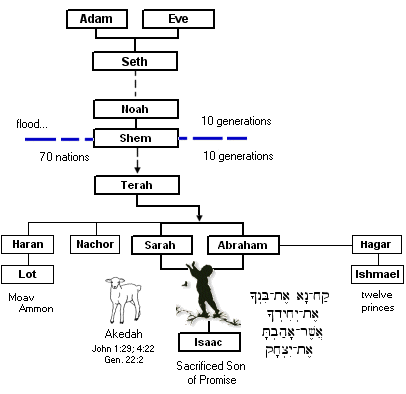 |
Hebrew Lesson:
Genesis 12:1a reading (click):
The Divine Presence...
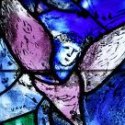
10.08.21 (Cheshvan 2, 5782) God told Moses that his Name means that He is Present (הֹוֶה) in every moment - past, present, and future (הָיָה וְהוֶה וְיָבוֹא). The Name YHVH (יהוה) is "shorthand" for "I AM with you always" (אָנכִי אֶהְיֶה עִמָּכֶם). There is no moment in time, just as there is no place, where God is not "there" for us. This includes times of testing, darkness, and even death itself (Psalm 23:4). The LORD our God does not abandon us, even when He seems hidden, powerless, or unwilling to intervene. Faith trusts that He is present there, in moments when we are vulnerable, weak, afraid, and seemingly all alone, and that all things are bound up in his love and good will toward us... Faith receives God as always present, the substance of our hope and dream of eternal healing and eternal life.
Hebrew Lesson:
Isa. 41:10 Hebrew reading (click):
The Greatness of Noah...
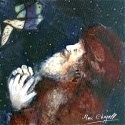
[ The following is related to our Torah reading for this week, parashat Noach... ]
10.08.21 (Cheshvan 2, 5782) Despite the fact that Torah describes Noah as אִישׁ צַדִּיק / ish tzaddik: "a righteous man," who was "blameless in his generation" (תָּמִים הָיָה בְּדרתָיו), and a man who "walked with God" (אֶת־הָאֱלהִים הִתְהַלֶּךְ־נחַ), Jewish tradition takes a somewhat ambiguous view of him, especially when he is compared to Abraham, the father of the Jewish people... In the Midrash Tanchuma, for example, it is said that Noah was righteous in his generation -- though he would not be so regarded in other generations. In other words, Noah was "relatively righteous" compared to the world at large, at least according to sages like Rashi, Maimonides, etc. However such an assessment is surely unfair, lashon ha'ra, and even chillul HaShem. After all, is not Noah one of the greatest examples of a person of faith given in the Torah? He was a descendant of the godly line of Seth who lived in a world filled with rampant and unbridled wickedness (Gen. 6:5), and yet he found grace in the eyes of the LORD (Gen. 6:8-9). Indeed the very first time the word "grace" (i.e., chen: חֵן) appears in the Torah concerns Noah: "Noah found grace in the eyes of the LORD" (מצא חן בעיני יהוה) -- a phrase later ascribed to the prophet Moses himself (Exod. 33:12, 17).
Hebrew Lesson:
Genesis 6:8 Hebrew reading (click):
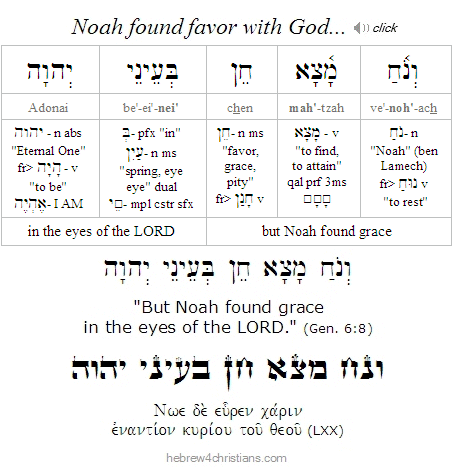 |
Moreover the New Testament affirms Noah's greatness as a tzaddik: "By faith Noah, when he was warned about things not yet seen, with reverent regard constructed an ark for the deliverance of his family. Through faith he condemned the world and became an heir of the righteousness that comes by faith" (Heb. 11:7). Noah was a "preacher of righteousness" (δικαιοσύνης κήρυκα) who faithfully completed the incredible task of constructing an enormous ark (תֵּבָה) to deliver life from God's judgment (2 Pet. 2:5).
The "ark" (i.e., teivah: תֵּבָה) that Noah built was not a ship that had a rudder but was a box-shaped vessel designed simply to rise above the deluge of the flood (מַבּוּל) to be carried up by God's providence. Spiritually understood, then, an "ark" represents a vessel completely surrendered to God's care, and the "Torah of the Ark" (תּוֹרַת הַתֵּבָה) teaches that we must cast ourselves upon the waters of the Father's great mercy (אֲבִי הָרַחֲמִים) and completely trust that He will guide our passage through the storms of this life (1 Pet. 5:7). It is a great example of faith in God during these days of "Covid" and political unrest...
Hebrew Lesson:
Isaiah 26:3-4 Hebrew reading (click):
 |
Noah trusted in the unseen love and care of his Heavenly Father, despite circumstances that were incomprehensibly dreadful... Like all the other tzaddikim, Noah "walked by faith, not by sight" (2 Cor. 5:7) while looking forward to a "new heavens and earth" (2 Pet. 3:11-15). Yes, of course father Abraham was a marvelous tzaddik who was greatly tested when he offered his beloved son of promise during the Akedah, trusting in the LORD's heart and good will to rectify all things, but we should not underestimate the greatness of Noah's faith, as he labored for over 100 years building the ark without any physical evidence that the great cataclysm would come. Moreover, it would do well for the rabbis to celebrate Noah's example and to remember that Abraham himself owes his life to Noah's obedience of faith, since Abraham is a direct descendant from Noah through his son Shem (Gen. 11:10-32).
The story of Noah reminds us that the great Day of the Lord (יוֹם־יְהוָה הַגָּדוֹל) will surely come (2 Pet. 3:10) and indeed is drawing near (Zeph. 1:14). Yeshua himself forewarned that the spiritual condition of the world would be one of anarchy and moral chaos wherein the wickedness of humanity would be great, and that "every design of the thoughts of people's minds would be full of evil continually" (Gen. 6:5). As in the days of Noah, in the midst of worldwide corruption, our Messiah will return in final judgment (Matt. 24:37-38; Luke 17:26-27). Maranatha - Even so, come Yeshua Adoneinu...
Hebrew Lesson:
Zephaniah 1:14a Hebrew reading (click):
The Friend of Sinners...

10.08.21 (Cheshvan 2, 5782) "The Son of Man came ... and they say, 'Look at him! A glutton and a drunkard, a friend of tax collectors and sinners!'" (Matt. 11:19). People, especially the religious people, were scandalized by Yeshua because he was a "friend of tax collectors and sinners!" Yet what sickness of heart is this, to despise those who are sick? It is a sorrow of heart to realize that religion often creates an "in-group" mentality that attains its status at the expense of the "outsider," the "stranger," the "sinner," and so on... The prayer of the self-righteous is always: 'God, I thank you that I am not like other people: extortionists, unrighteous people, adulterers – or even like this tax collector" (Luke 18:11).
The religious leaders of Yeshua's day were offended because he "welcomed sinners" and enjoyed eating meals with them (Luke 15:2). We can almost hear their disapproving whispers and their dismissive accusations: "How could a good Jew behave like this? Does he not understand the call to personal holiness? Does he not know the Torah of "clean" and "unclean"? If a man is known by the company he keeps, we know enough about Yeshua to know that he's not truly pious..." And to this very day the self-righteous find offensive the idea that God welcomes the sinful, the needy, the broken, the despised, and the "outsider" into His presence... As Yeshua said, "those who are well have no need of a physician," and indeed offering them God's cure will always be regarded as a kind of poison...
We greatly rejoice that God indeed is the friend of sinners; He is the Good Shepherd who seeks and saves the lost. Thank the Lord that he comes not for the "righteous" but for those who are brokenhearted, for those mortally wounded by their own sin... Any so-called theology or religion that repudiates or minimizes God's love for the sinful, the needy, the broken, is little more than a shrine to human pride and vanity... On the contrary: the heart of the Compassionate One always welcomes a sinner who sincerely turns to Him.
Hebrew Lesson:
Psalm 23:3 Hebrew reading (click):
Noah and Yeshua...

[ The following entry concerns this week's Torah reading, parashat Noach... ]
10.08.21 (Cheshvan 2, 5782) The name Noah (Noach) comes from the shoresh (root) nacham (נָחַם), meaning to comfort. Other Hebrew words that use this root include nichum (compassion), nuach (rest), and menuchah (rest from work). Noach's very name foreshadowed the coming of Yeshua. His father Lamech (meaning "powerful one") regarded Noach as a deliverer who would comfort us from the ravages of the curse (Gen. 3). In like manner it was prophesied that Yeshua would give us everlasting rest: "His rest shall be glorious" (Isa. 11:10), and He offers rest to the weary (Matt. 11:28, Heb. 4:9). His sacrifice on the Cross at Moriah undoes the kelalah (curse) over the children of Adam. Indeed, His life, sacrifice, and resurrection was like a "magic spell" that "spoke backwards" the sin of the "First Adam" - and by means of His deliverance the power of the curse was forever broken (Gal. 3:13, John 3:14, 2 Tim.1:10; Heb. 2:14; Heb. 9:27-28; 1 John 3:8, Rev. 22:3). By means of His Spirit we are given an everlasting comfort (John 14:16).
In the days of Noach "all flesh had corrupted his way upon the earth" (Gen. 6:5, 11), but Noach "found grace in the eyes of the Lord" (Gen. 6:8). This is yet another foreshadowing of the Father's choice of Yeshua as the uniquely Righteous Deliverer of the world (Matt. 3:17). Noach was from the godly line of Seth of whom would descend the Promised Seed of the Woman (see the Gospel in the Garden and the Seed of Abraham). Of Noach it was said that he was ish tzaddik (a righteous man) who was tamim (blameless) in his generation: Et-haElohim hithalekh-noach - "Noah walked with God" (Gen. 6:9). Likewise Yeshua was entirely tzaddik (Rom. 5:19, Heb. 4:15, 1 Pet. 3:18; 1 John 2:1), blameless (Heb. 4:15, 1 Pet. 3:18), and One who walked with God (John 5:19, John 8:28, etc.). For this reason the New Testament calls Noah a "herald of righteousness" (2 Pet. 2:5).
Just as Noach's obedience to God saved a remnant from all the earth, so did Yeshua's obedience result in "the saving of his house" (Heb. 11:7). And just as God "blessed Noach and his sons" (Gen. 9:1) and with them established His covenant, so in greater measure was this fulfilled in the Person of Yeshua, who provides all spiritual blessings to those whom He calls his brethren (Eph. 1:3, Heb. 13:20; Heb 2:11). Yeshua is indeed the "righteous man" who saves us in the true teivah (ark), the shelter of God's grace.
"Everyone then who hears these words of mine and does them will be like a wise man who built his house on the rock. And the rain fell, and the floods came, and the winds blew and beat on that house, but it did not fall, because it had been founded on the rock. And everyone who hears these words of mine and does not do them will be like a foolish man who built his house on the sand. And the rain fell, and the floods came, and the winds blew and beat against that house, and it fell, and great was the fall of it." - Yeshua (Matthew. 7:24-27)
Noach's teivah ("ark") had God Himself as its designer (Gen. 6:15f), and salvation in Yeshua is by God's design (Jonah 2:9; Eph. 1:9, 1:11). Noach's ark contained only one door (Gen. 6:16), just as Yeshua is the only door to salvation (John 10:9). Noach's ark contained three levels (Gen. 6:16) and salvation has three own experiential levels (2 Cor. 1:10): past, present, and future. In the past (at Moriah) Yeshua delivered us from the penalty of sin; in the present, He is delivering us from the power of sin; and in the future He will deliver us from the very presence of sin. From Noach's hand was given the sign of the dove, a symbol of peace and the abiding presence of the Spirit of God.
Hebrew Lesson:
Genesis 6:9b Hebrew reading (click):
Seeing the Invisible...

[ The following entry concerns this week's Torah reading, parashat Noach... ]
10.07.21 (Cheshvan 1, 5782) Just as Noah foresaw the great cataclysm to come, so we are to understand that the world above our heads and under our feet is destined to destruction, as we likewise await the promised world to come: "Lift up your eyes to the heavens, and look at the earth beneath; for the heavens vanish like smoke, the earth will wear out like a garment, and they who dwell in it will die in like manner; but my salvation will be forever (וישׁוּעָתִי לְעוֹלָם תִּהְיֶה), and my righteousness will never be dismayed" (Isa. 51:6).
This idea is repeated in the New Testament: "For as were the days of Noah, so will be the coming of the Son of Man" (Matt. 24:37). "But the Day of the LORD will come like a thief, and then the heavens will pass away with a roar, and the heavenly bodies will be burned up and dissolved, and the earth and the works that are done on it will be exposed. Since all these things are thus to be dissolved, what sort of people ought you to be in lives of holiness and godliness, waiting for and hastening the coming of the Day of God, because of which the heavens will be set on fire and dissolved, and the heavenly bodies will melt as they burn? But according to his promise we are waiting for new heavens and a new earth in which righteousness dwells. Therefore, beloved, since you are waiting for these, be diligent to be found by him without spot or blemish and at peace" (2 Pet. 3:10-14).
In light of all this, we look not to the things that are seen but to the things that are unseen. "For the things that are seen are transient, but the things that are unseen are eternal... For the invisible things of Him from the creation of the world are clearly seen, being understood by the things that are made, even his eternal power and Godhead. Therefore we are strangers and exiles on the earth, looking forward to the city that has foundations, whose designer and builder is God" (2 Cor. 4:18; Rom. 1:20; Heb. 11:10,13).
Faith sees the invisible... Our father Abraham was promised descendants as numerous as the stars in the sky or sand on the seashore, despite the fact that he was an old man and his wife had long past the age of bearing children. Abraham believed in the One who gives life to the dead and - καλοῦντος τὰ μὴ ὄντα ὡς ὄντα - "calls into existence the things that do not exist as existing" (Rom. 4:17). "He staggered not at the promise of God through unbelief but was strong in faith, giving glory to God; and being fully persuaded that, what He had promised, He was able also to perform: And therefore it was imputed to him for righteousness" (Rom. 4:19-22).
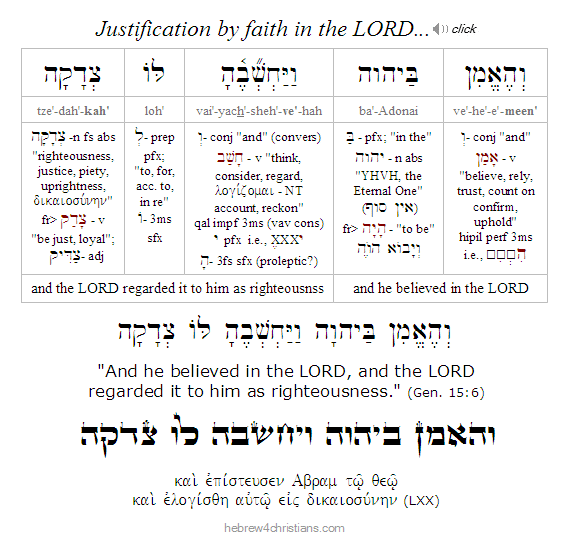 |
Holding Fast to Hope...

10.07.21 (Cheshvan 1, 5782) There are moments – dark, gnawing, raw – when you may lose sight of hope, when you might even fear that you have lost your faith – not in God or his promises – but rather in yourself, in your own strength to continue, in your own will to stay focused and to keep pressing on "hope against hope..." The remedy here is always the same: to remember that within you – that is, in your flesh - "there is no good thing" and that the miracle of salvation is made secure by God's great passion for you, not your own power or desire. "Not by might, nor by power, but by my Spirit, says the LORD of Hosts" (Zech. 4:6). We don't trust in ourselves nor in the strength of our inner resolve, but solely in the power of God to make the way (Jer. 17:5). We must turn away from ourselves to regain the message of God's unfailing love; only when we lose sight of ourselves do we find ourselves. God redeems you from your lost estate and touches you in your uncleanness; He clothes himself in your pain so that you may be clothed in his love. That never changes, despite dark moments, and to that we must always return...
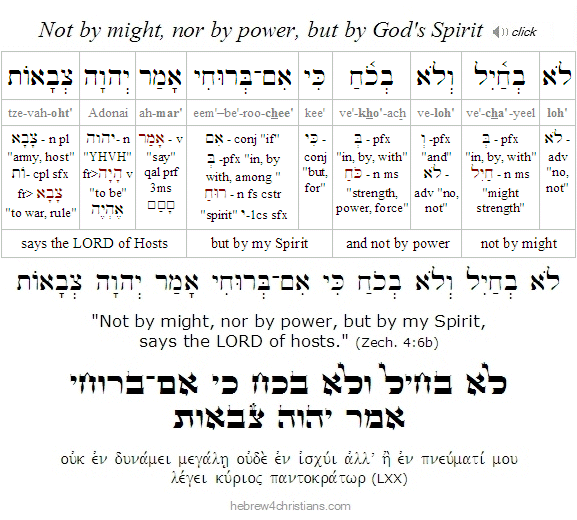 |
Where it is written, "I can do all things through Messiah who strengthens me" (Phil 4:13), that includes enduing protracted suffering, hardship, abandonment, and even abuse suffered from others. It means being set free from disillusionment, despair, and the oppression of relentless fear. "I can do all things through Messiah" also means no longer accepting messages of self-hatred, no longer heeding the malicious whispers that say: "I am of no value," "I am unlovable,"or"my life is hopeless." No, "I can do all things through Messiah" means learning to be accepted, honored, and esteemed by God; it means opening your heart to God's love and blessing for your life; it means allowing your heart to be made right, to have inner peace... After all, Yeshua's great prayer was that we would know the truth of God's love for us (John 17), and this is the central need our lives...
Healing Afflictions....

10.07.21 (Cheshvan 1, 5782) It is good to praise and trust the LORD despite our afflictions, and indeed, suffering itself presents an invitation to come before God in prayer (James 5:13). Suffering offers us a nisayon (נִסָּיוֹן), a test, for our hearts to be exercised in ways otherwise rendered impossible should the path of our lives be attended without real struggle...
In this connection I am reminded of a quote from Sadhu Sundar Singh, "Should pain and suffering, sorrow, and grief, rise up like clouds and overshadow for a time the Sun of Righteousness and hide Him from your view, do not be dismayed, for in the end this cloud of woe will descend in showers of blessing on your head, and the Sun of Righteousness rise upon you to set no more for ever" (Wisdom of the Sadhu).
It's been said that both the devil and God want your soul, but their approaches are diametrically opposite to one another.... God offers you a bitter cup that, after it has been duly tasted, will be turned sweet, whereas the devil offers you an artificially sweetened cup that, after it has been duly tasted, will be found bitter to the last of its dregs... When you accept your suffering as ordained by God - by the LORD of Glory who could easily deliver you from all trace of its presence in but the twinkling of an eye – your heartache is sanctified, and your praise becomes more dear to Him. Only the wise and loving LORD knows how bitter waters may be made sweet; only the great Refiner of our souls knows how to bring eternal beauty up from ashes... So heal me, O LORD (even if that means suffering and pain for my life), and I shall be healed; save me, O LORD (do whatever it takes to bring me to the end of myself), and I shall be saved – for you are my praise.
If you are afflicted, troubled, or in any kind of pain, you have a great opportunity to glorify your Father in Heaven by offering Him your praise.... Praising God is the appropriate response to all of reality; the affirmation of God's glory transforms everything. "Is anyone among you feeling bad? Let him pray. Is anyone feeling good? Let him sing praise" (James 5:13). Remember that regardless of how you presently feel, your emotional life is centered in the Presence of God... As George Mueller once affirmed, "Be assured – if you walk with Him and look to Him, and expect help from Him, He will never fail you."
Hebrew Lesson:
Psalm 30:2 Hebrew reading (click):
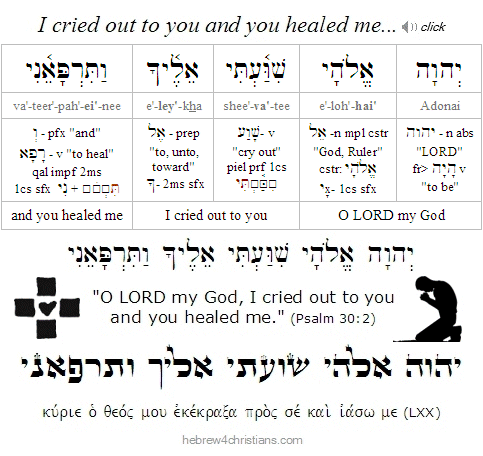 |
The LORD our Healer...
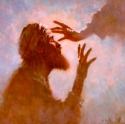
10.07.21 (Cheshvan 1, 5782) Who is your healer? Who sustains your life? To whom do you turn for help in your infirmities? Mi li va'shamayim? Only the Lord truly heals us of our sicknesses and diseases. We may take our medicines and visit our doctors - and the Lord may choose to use them as instruments of physical healing - but in the end, the Lord alone is our Healer and our Deliverer. As Spurgeon said, "I will heal thee of thy wounds," is a promise which could not come from the lip of man, but only from the mouth of the eternal God.
Ultimately, however, our most desperate need for healing is spiritual: We need God to heal the spiritual sickness of our guilt-ridden and sinful condition before Him. But since this sickness concerns our relationship to God, unless God Himself cures it, we will never be truly healed. Thankfully, the healing for our relationship is provided by the sacrifice of His Son Yeshua (i.e., Jesus) as our personal Sin Offering before God. As the Tanakh puts it, "But He was wounded for our transgressions, He was bruised for our iniquities: the chastisement of our peace was upon Him; and with His stripes we are healed." That is, Yeshua took upon Himself our guilt-ridden and sinful condition - the shame of our broken relationship with God - and suffered this for us in order to heal our relationship with God.
When we cry out to God saying, "Heal me O LORD, and I shall be healed; save me, and I shall be saved," we are calling upon the One who gave up His Only Begotten Son in order to heal our relationship with Him. We can then experience newness of life as we receive the spiritual healing of our hearts. Have you put your trust in God's Healing for your life?
Hebrew Lesson:
Jer. 17:14 Hebrew reading (click):
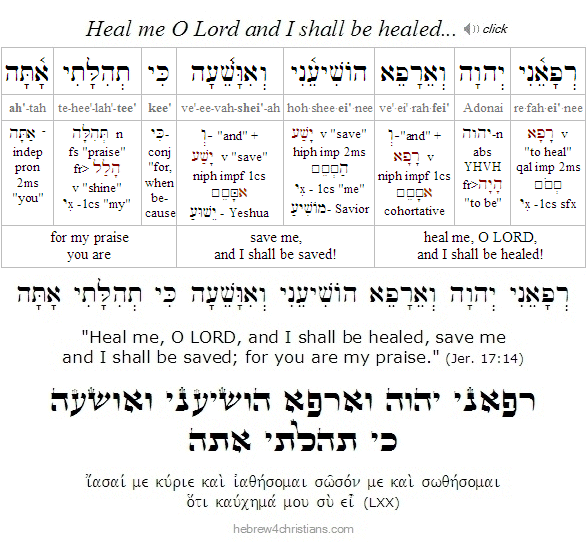 |
Despite the propaganda of this godless world, always remember that God alone is our Healer, not man, and certainly not those arrogant fools that claim god-like power and authority based on frail human reasoning (Psalm 14:1). Damnable nonsense! It is God alone who gives the heart its mysterious beat; it is God alone who gives the breath of life. The best man can hope to do is try to explain how the body functions and to manipulate what is given. There is no "something" that comes out of nothing -- apart from God...
"For whether we live, we live unto the Lord; and whether we die, we die unto the Lord: whether we live therefore, or die, we are the Lord's." - Romans 14:8
Hebrew Lesson:
Deut. 32:39 Hebrew reading (click):
Our Daily Deliverance...

10.06.21 (Tishri 30, 5782) Just as we are to ask God for our daily bread (לֶחֶם חֻקֵּנוּ), so we are to ask for daily deliverance: "Lead us not into temptation, but deliver us (חַלְּצֵנוּ) from evil" (Matt 6:13). Note that the term translated "evil" in many translations ("deliver us from evil") is a substantive rather than an adjective: τοῦ πονηροῦ, the evil one... "Give us this day our daily deliverance from the evil one...." Our daily bread and our daily deliverance are connected with our decision to "choose life" (בַּחַרְתָּ בַּחַיִּים) -- and to always choose life -- even in moments we find difficult, distressing, and even when we might wish that we were no longer living... Choosing life means refusing to escape reality by evading the significance of our choices; it means finding the will to regard life as worthy; it implies that we will eat our bread in trust that the Lord is at work even in the darkest of hours (Passover occurred at midnight)... Choosing life means refusing to eat the fruit of death and to seek Yeshua, the Tree of Life. We live one day at a time; we only have today. We are given daily bread for this hour of our need. Today is the day of your deliverance - if you are willing to walk in it. Therefore, the Spirit of the Living God cries out, "Choose life and live!"
Hebrew Lesson:
Deut. 30:19b Hebrew reading (click):
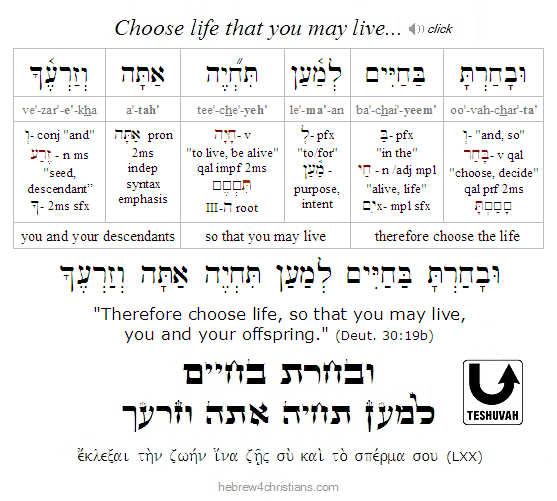 |
Shelter of Light...

10.06.21 (Tishri 30, 5782) The sages say, "in the world to come (הַעוֹלָם הַבָּא), God will bring the sun out of its sheath to burn the wicked; they will be judged by it, but the righteous will be healed by it' (Shemot Rabbah). Yeshua is compared to the "Sun" because as the Sun is the central luminous body of our world, so Yeshua is called the "Light of Life" (אוֹר הַחַיִּים). Yeshua is melech ha-kavod (מֶלֶךְ הַכָּבוֹד), "the King of Glory" -- and no one can stand before the blinding power of His countenance (Psalm 27:4; Rev. 1:8-19). His is the "Fountain of Light" for all of creation, the Source and End of all life: "For by Him all things were created, in heaven and on earth, visible and invisible, whether thrones or dominions or rulers or authorities -- all things were created through Him and for Him. And he is before all things, and in him all things hold together... that in everything He might be preeminent" (Col. 1:16-18). Yeshua is the "Sun of Righteousness" (שֶׁמֶשׁ צְדָקָה) who comes "with healing in his wings" -- that is, in healing radiance, with rays and beams, which metaphorically describe His influence over the hearts of men... Note that the word for "wings" used in this passage (i.e., kanaf: כָּנָף) pictures the image of a heavenly tallit (טַלִּית), or the heavenly firmament (רָקִיעַ) of the LORD's sheltering Presence.
Amen, there is a future time of healing and deliverance coming to us, though we must abide in the shadow of its substance for a bit longer: "For behold, the Day is coming (הַיּוֹם בָּא), burning like an oven, when all the arrogant and all evildoers will be stubble. The Day that is coming shall set them ablaze, says the LORD of hosts, so that it will leave them neither root nor branch. But for you who fear my Name, the Sun of Righteousness (שֶׁמֶשׁ צְדָקָה) shall rise with healing in its wings. You shall go out skipping like calves released from the stall. And you shall tread down the wicked, for they will be ashes under the soles of your feet, on the day when I act, says the LORD of hosts" (Mal. 4:1-3).
Hebrew Lesson:
Proverbs 18:20 Hebrew reading (click):
 |
Stages of Judgment...

[ The following entry concerns this week's Torah reading, parashat Noach... ]
10.06.21 (Tishri 30, 5782) Some of the sages think that God's judgment comes in stages. The Great Flood was preceded by four successive generations of prophets that warned of the coming cataclysmic judgment: Enoch, Methuselah, Lamech, and finally Noah. It is fascinating to understand that Adam himself was alive when Noah's grandfather Methuselah was born, so the original message of teshuvah (repentance) was an echo that came from Eden itself; moreover, consider that Abraham personally knew of Noah (Abraham was 58 years old when Noah died), and undoubtedly Noah's son Shem told him of his grandfather Lamech, who had seen and spoken with Adam who was directly created by God alone. Later, Abraham's son Isaac also came to know Shem, Noah's firstborn son, and the legacy of the "gospel of the garden" was thereby passed on...
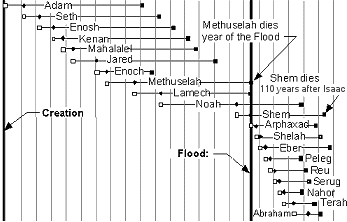 |
The first stage of judgment occurred when people disregarded the inherent dignity of others created in the image and likeness of God. This negation of the divine characteristics of people led to sexual promiscuity that became rampant upon the earth: "The sons of God saw the daughters of man that they were fair, and they took for themselves wives, whomsoever they chose" (one midrash claims that the Dor HaMabul, the generation of the flood, would regularly exchange marital partners). God then gave mankind 120 years to repent from his sexual corruption or be faced with apocalyptic destruction (Gen. 6:3). Despite Noah's 120 year public building project and the preaching of his grandfather Methuselah, God's patience finally ran out (1 Pet. 3:20). God then "saw that the wickedness of man was great in the earth and that every imagination of the thoughts of his heart was only evil continually" (Gen. 6:5). Mankind refused to repent and turn to God....
There is a tragic progression at work here. The practice of "casual" acts of lawlessness eventually led to the acceptance and practice of sexual promiscuity. This, in turn, resulted in the loss of mankind's sanctity (kedushah), since this comes from man's ability to subordinate his instinctual/emotional desires to his intellectual/spiritual life. Genuine sanctity refuses to exploit others as means to an end. Disregarding this truth cheapens and impairs the sense of self, causing disintegration of the spiritual life. As humanity became more and more fractured and stupefied, God's "like for like" judgment resulted in "giving them over" (paradidomi) to the lusts of their hearts (Rom. 1:26). (In our culture of unbridled pornographic expression and sexual immorality, we mirror such an antediluvian world view. Indeed, it is a mark of our age to be enamored with "degrading passions," with gender confusion and regularly practiced idolatry (i.e., fornication, adultery, homosexual relationships, and so on)). The final verdict of this practiced chamas (lawlessness) was the bestowal of a "depraved mind" (αδοκιμον νουν), a condition of being unable to reason properly at all. Since truth is essentially grounded in a sense of value, and value is a function of conscience, a depraved mind is literally insane from a spiritual perspective... People who are devoid of conscience are unable to reason along the lines of ethical truth at all. This promoted a cultural collusion to suppress the truth, to silence the truth-tellers, to kill the prophets, and to gag advocates for justice. Lawlessness squelches the inward voice of right and wrong within the human heart.
Hebrew Lesson:
Psalm 14:3 Hebrew reading (click):
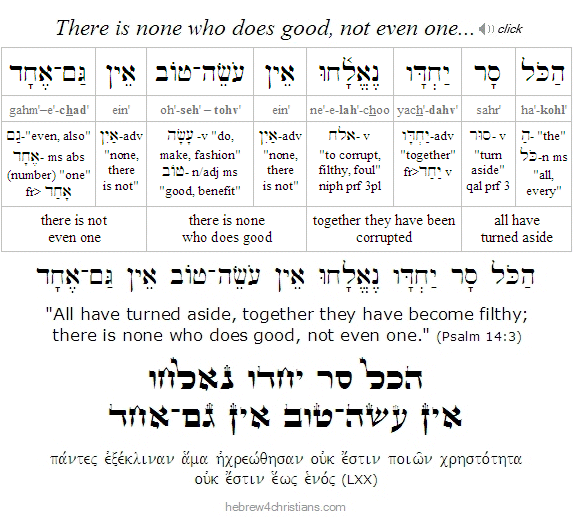 |
Note: For more on this topic, see "The Days of Noah."
|






